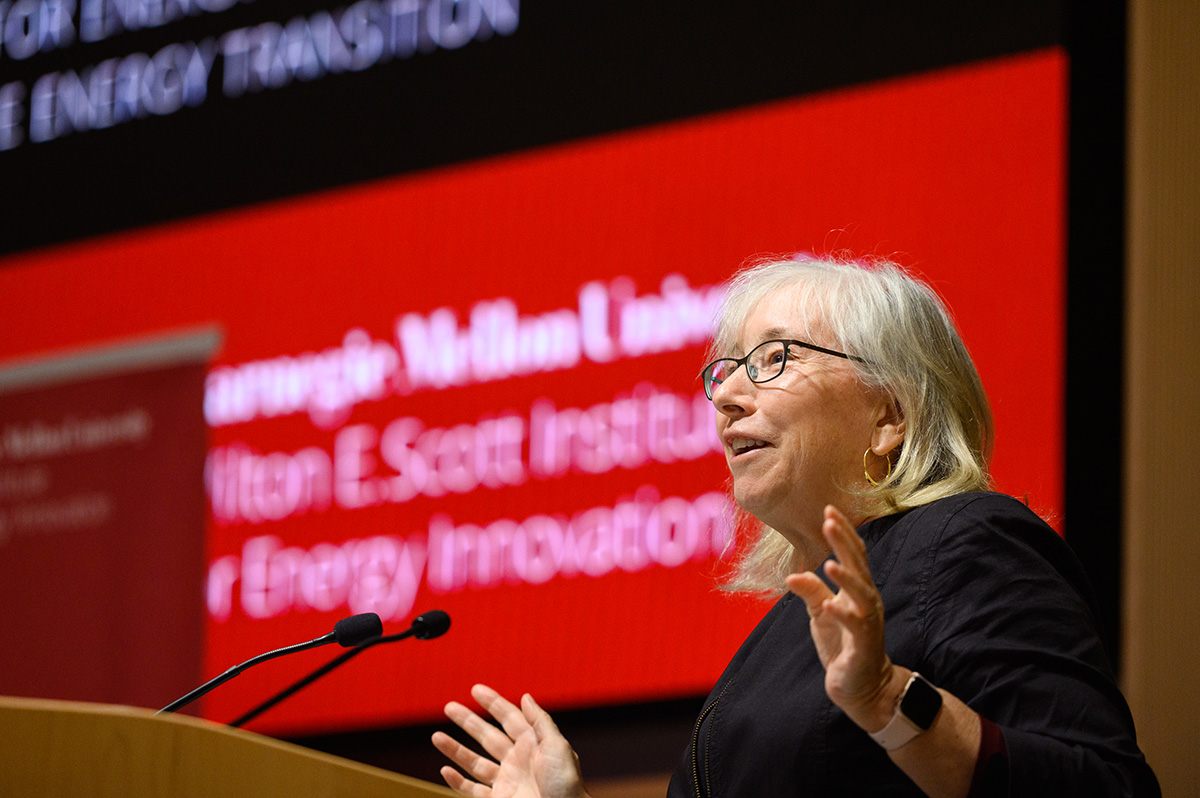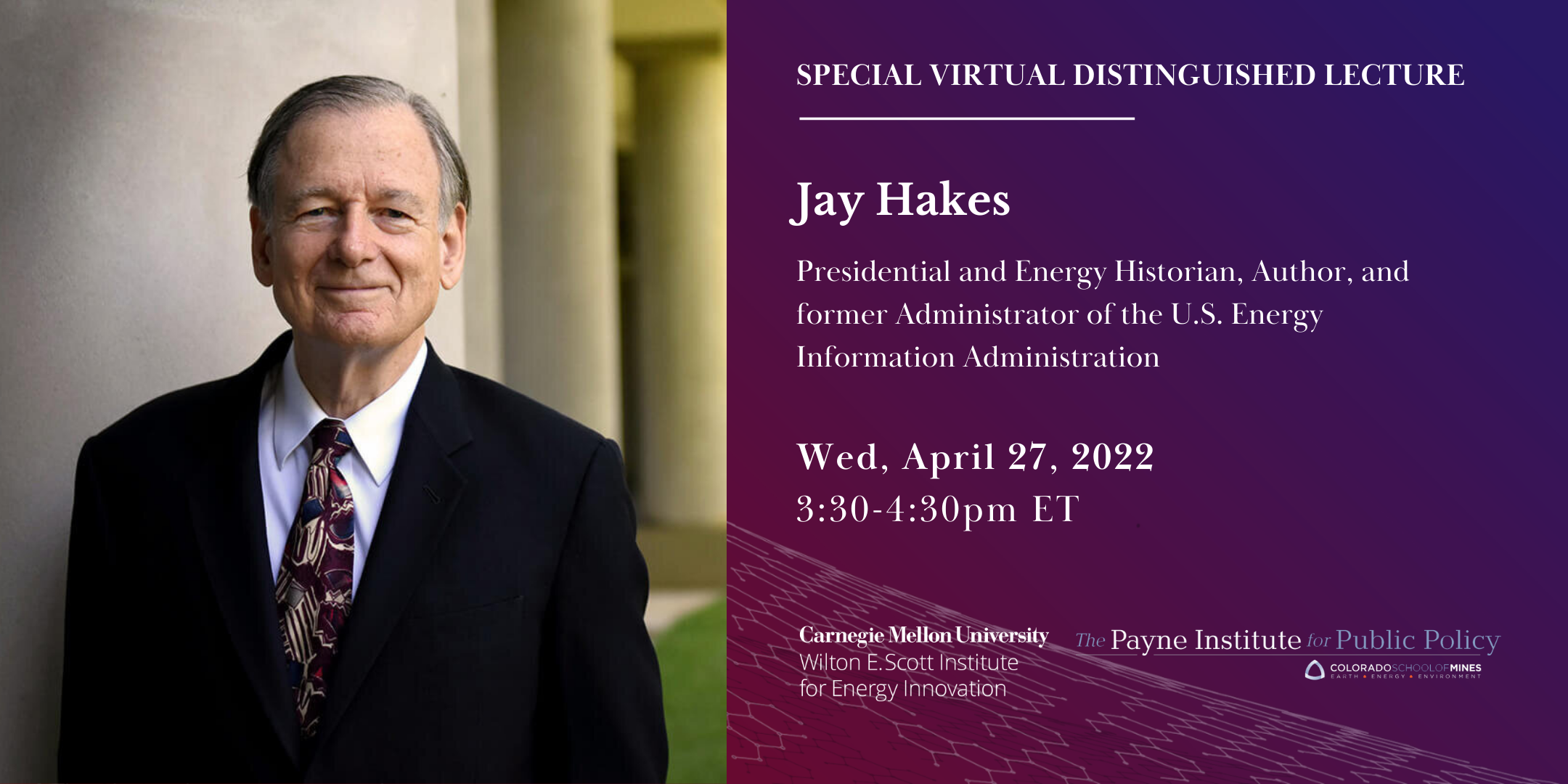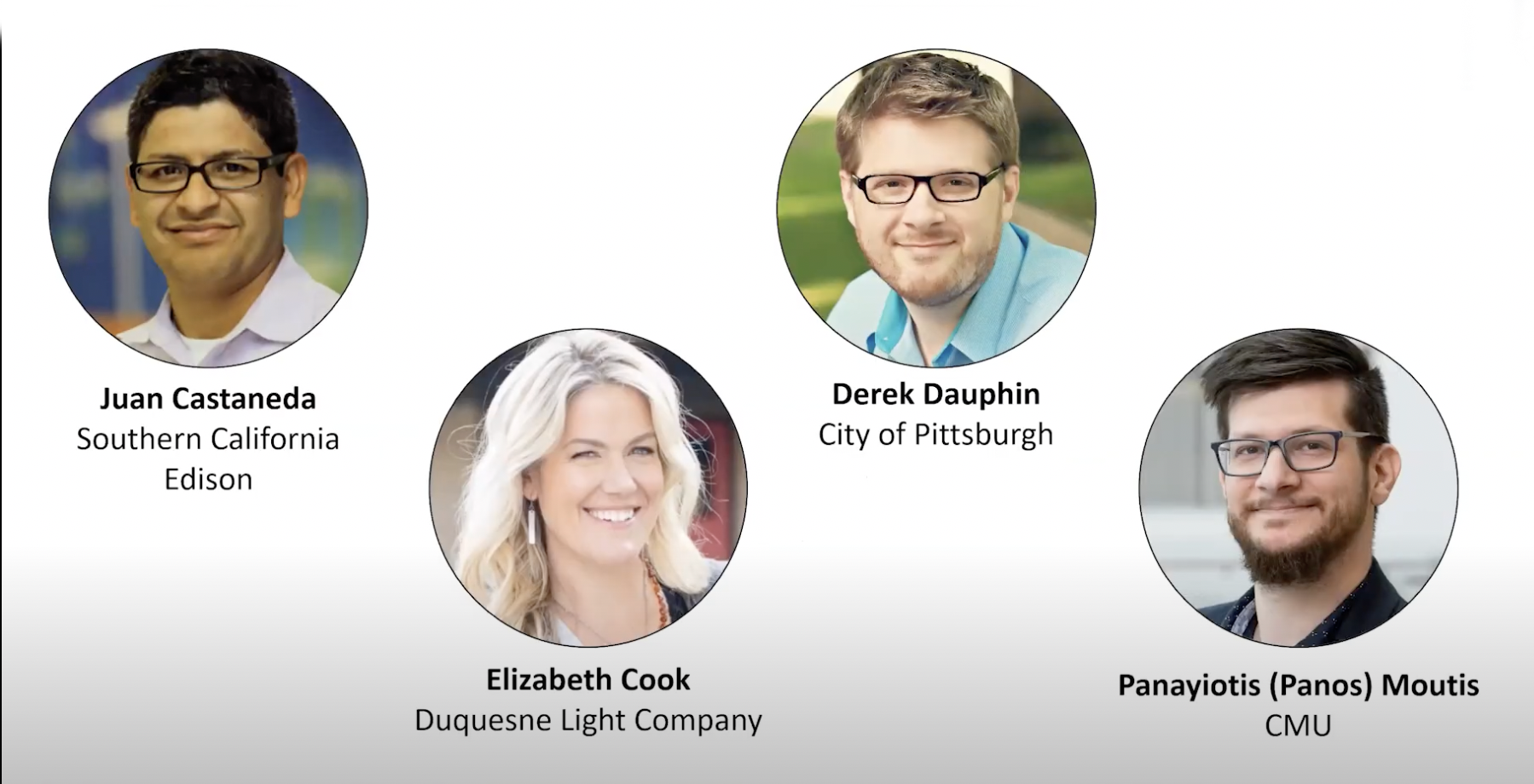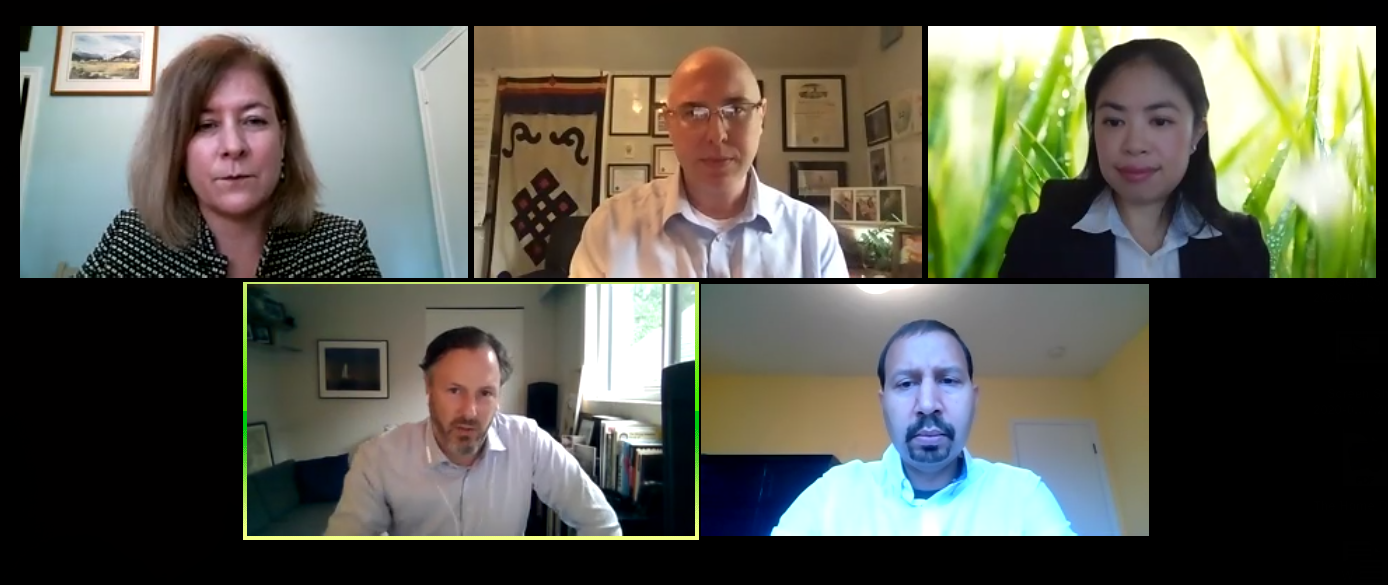2024
Distinguished Lecture with Ken Schoeneck: Accelerating Climate Action through Innovation and Technology | April 4, 2024
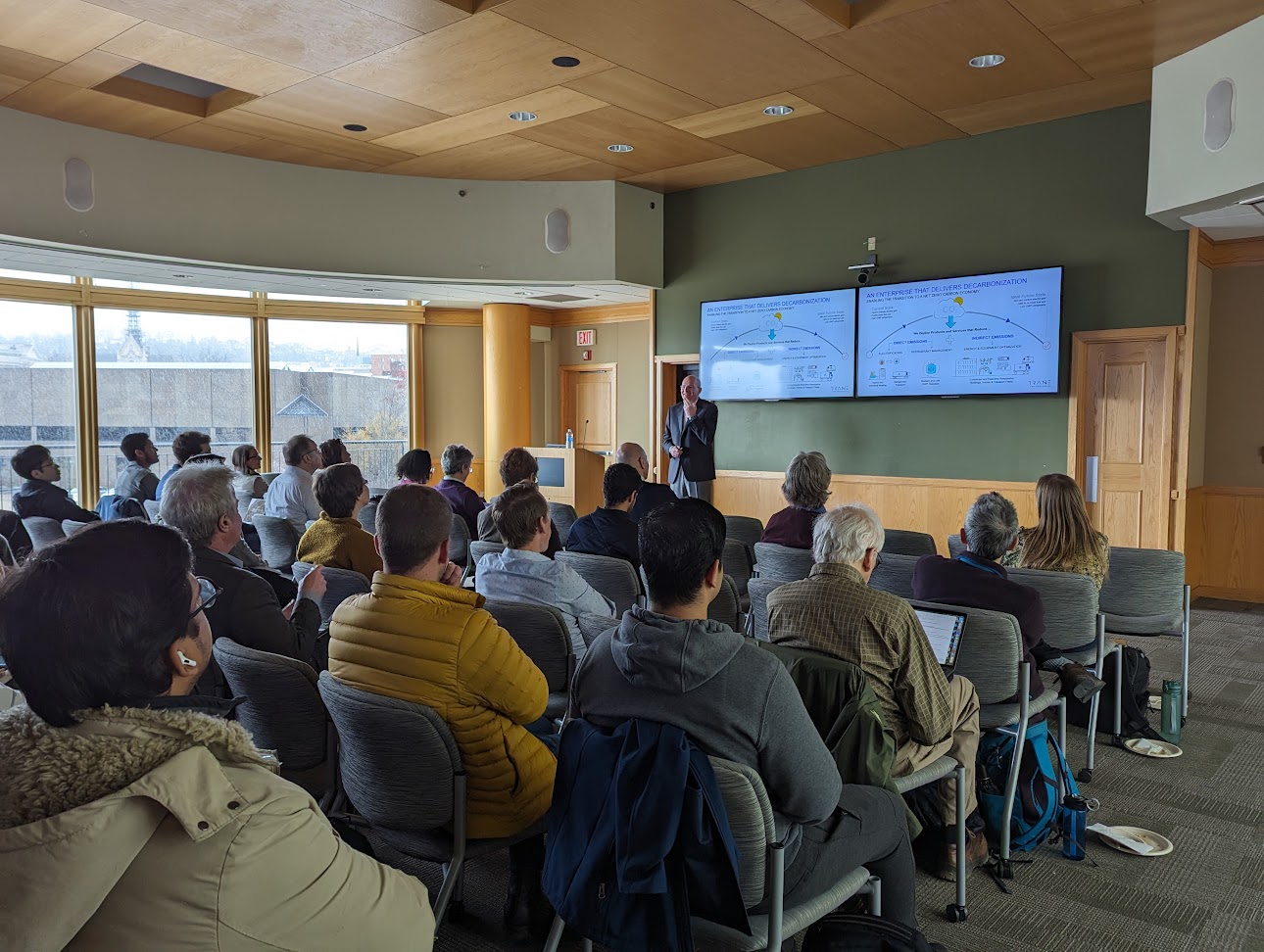
We heard firsthand how Trane Technologies, the Scott Institute for Energy Innovation's first corporate Grand Challenge partner, is working to study the impact and potential for electrified residential heating and cooling at scale in the U.S.
Scott Institute Student Seminar |February 22, 2024 12-1:30PM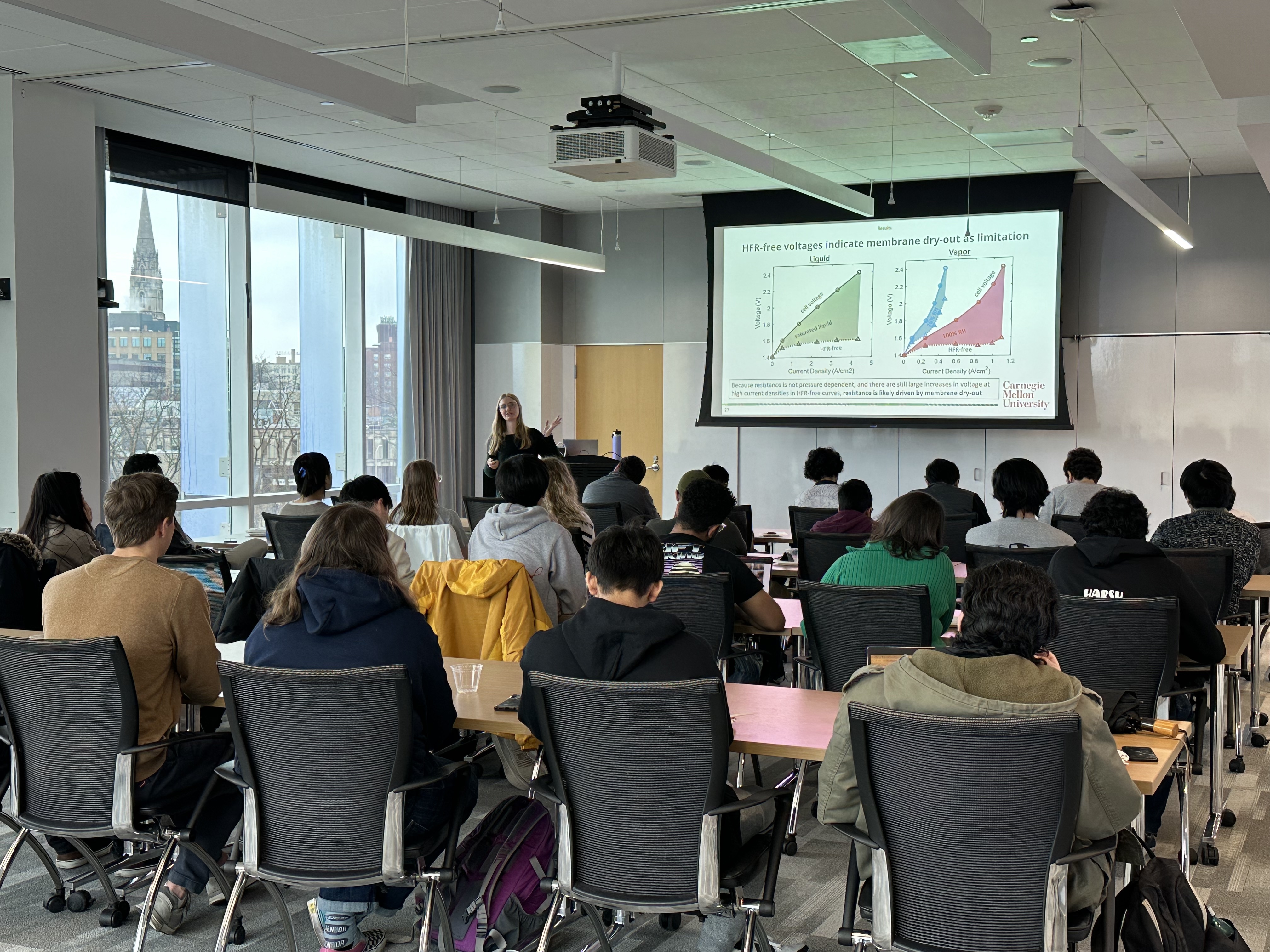
The Scott Institute Student Seminar provides an opportunity to hear students present their energy research or entrepreneurship endeavors. Ph.D. students working in energy across the institute and faculty connected or working on related topics are invited to attend.
Challenges in Clean Energy Transition: What Do Economists Know and Not Know | February 15, 2024 12-1:30PM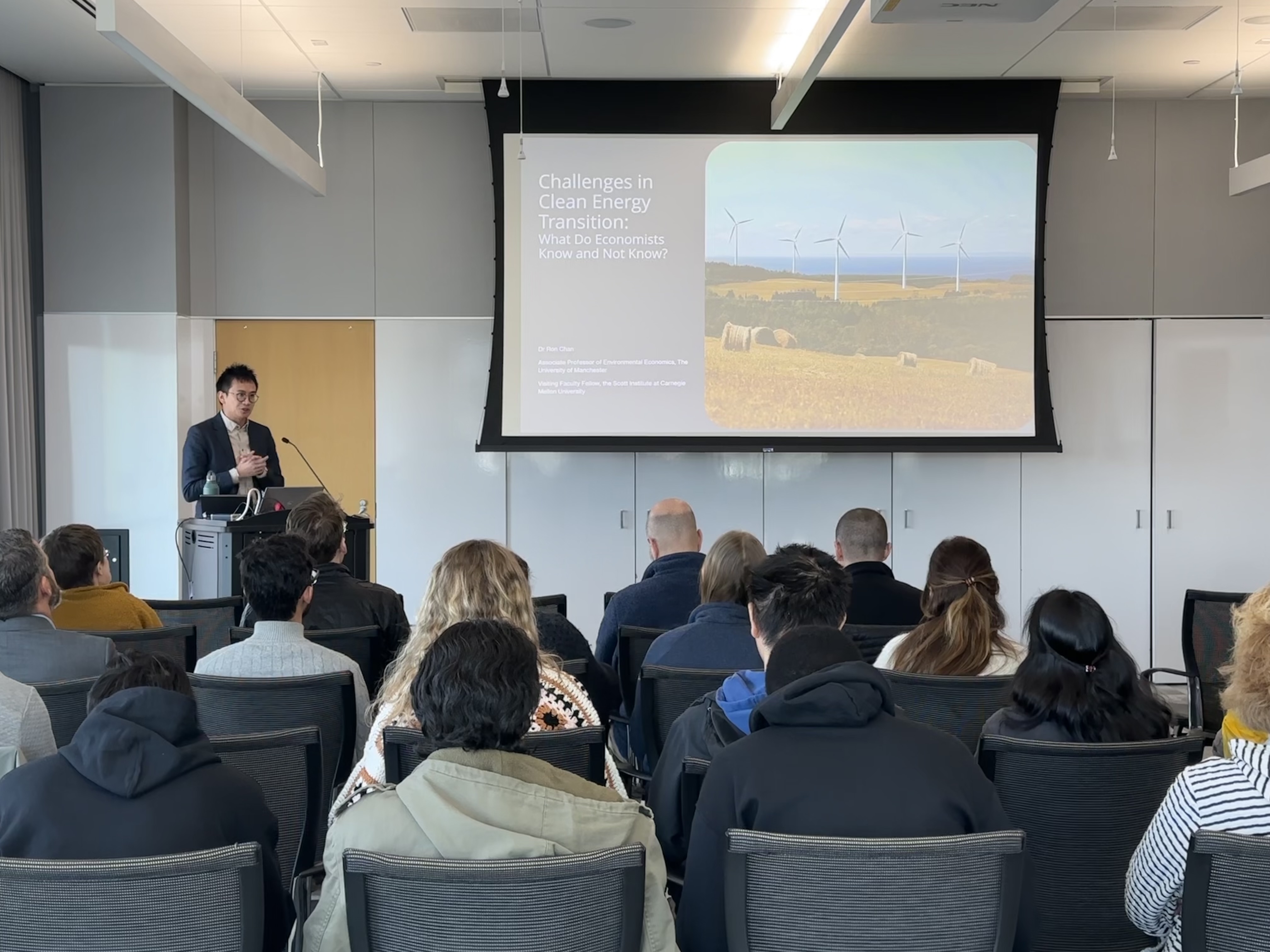
In this Tech Talk, visiting Scott Institute Fellow Ron Chan will address the challenges and opportunities in the clean energy transition from an economics perspective.
Faculty Energy & Transportation Panel | January 30, 2024 12-1:30PM
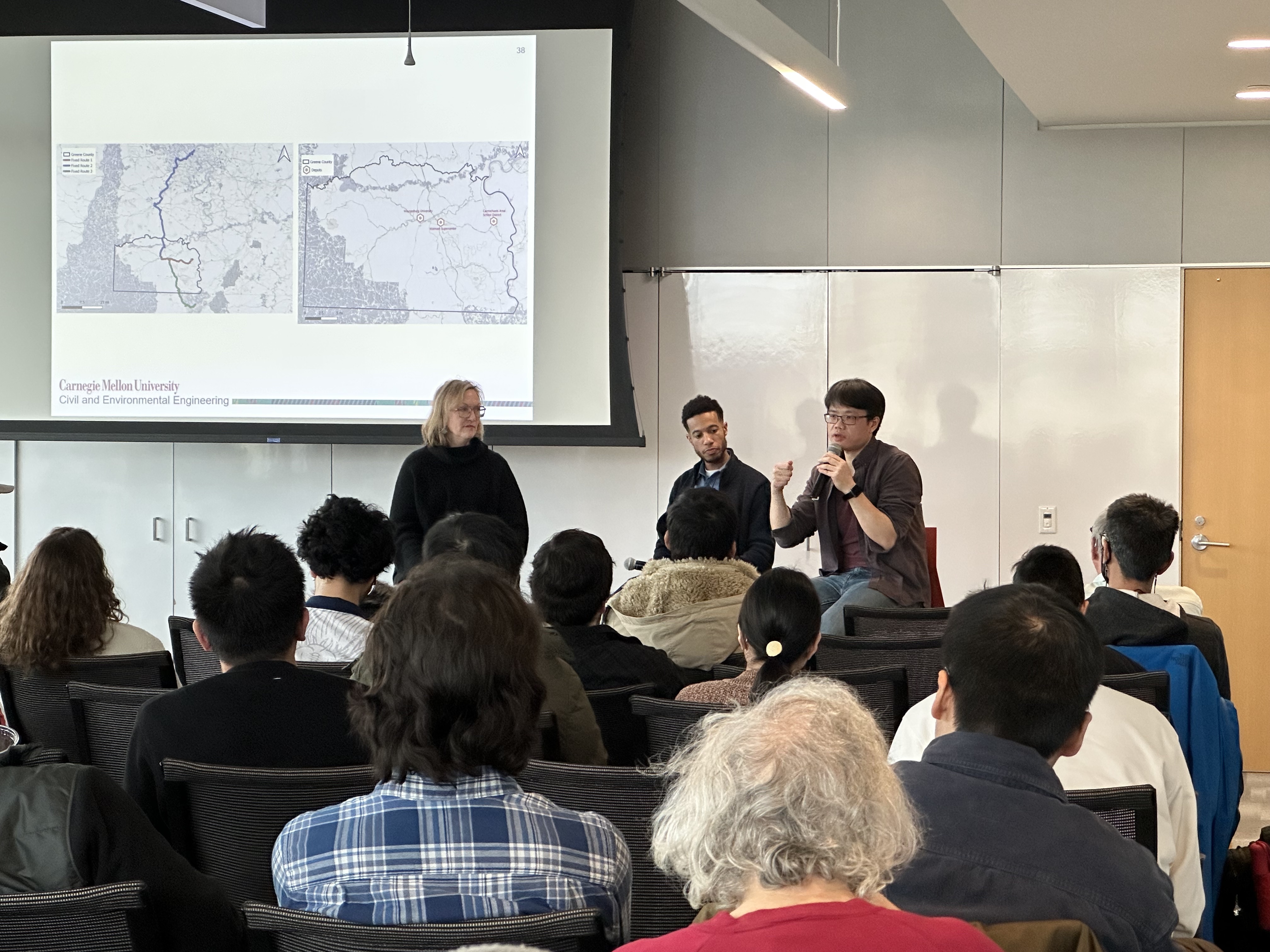
Faculty presented the work currently at the intersection of transportation and decarbonization. Following the presentations, Karen Lightman (Executive Director, Metro 21) moderated a discussion about their work and how the CMU community can get involved about those projects and initiatives.
2023 Events
5th Annual CMU Technology, Sustainability and Business Forum| November 17 at 1PM
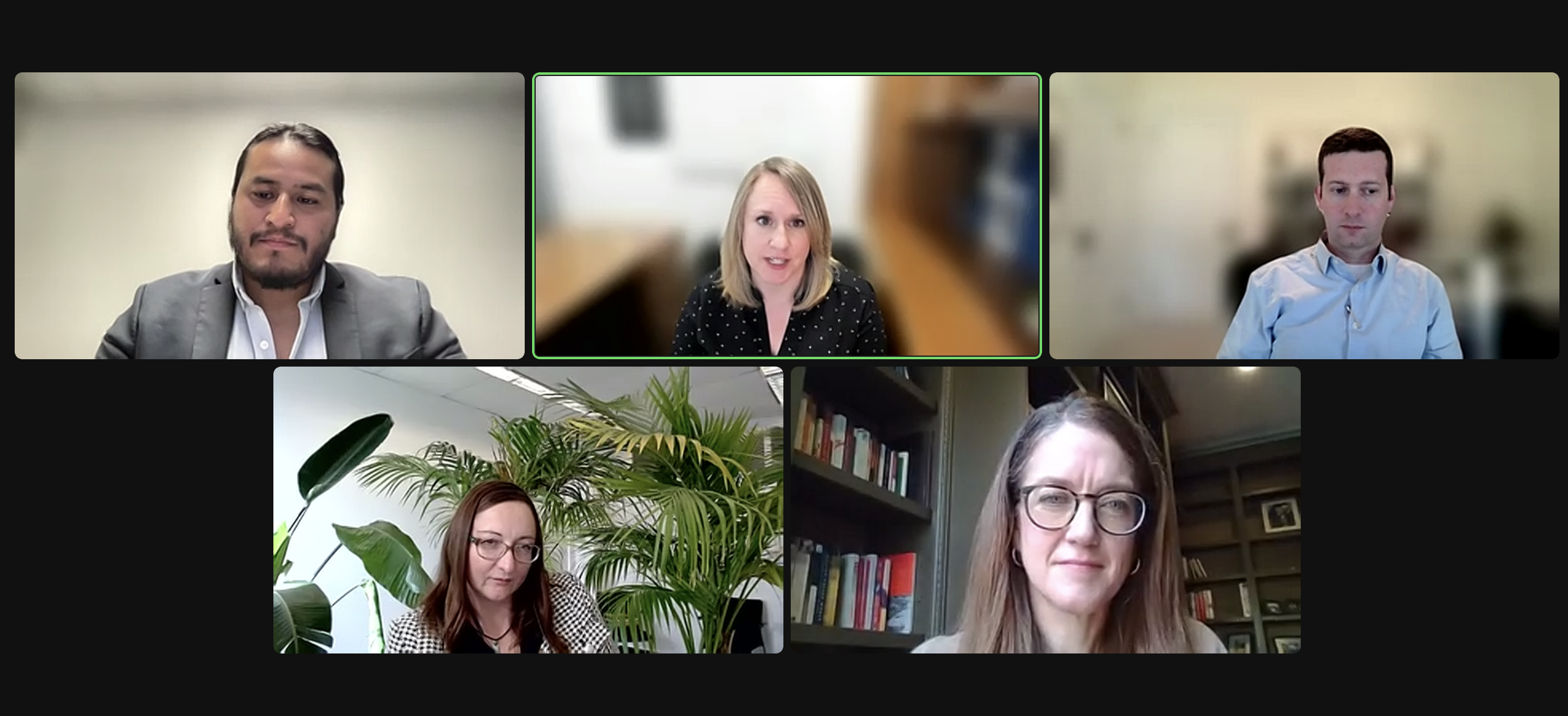
A partnership between the Tepper School of Business and the Wilton E. Scott Institute for Energy Innovation at Carnegie Mellon, this virtual panel features 5 leaders from industry, finance, academia, and the not-for-profit sectors discussing matters pertaining to sustainability.
Distinguished Lecture with Katja Windt | November 2 at 12PM
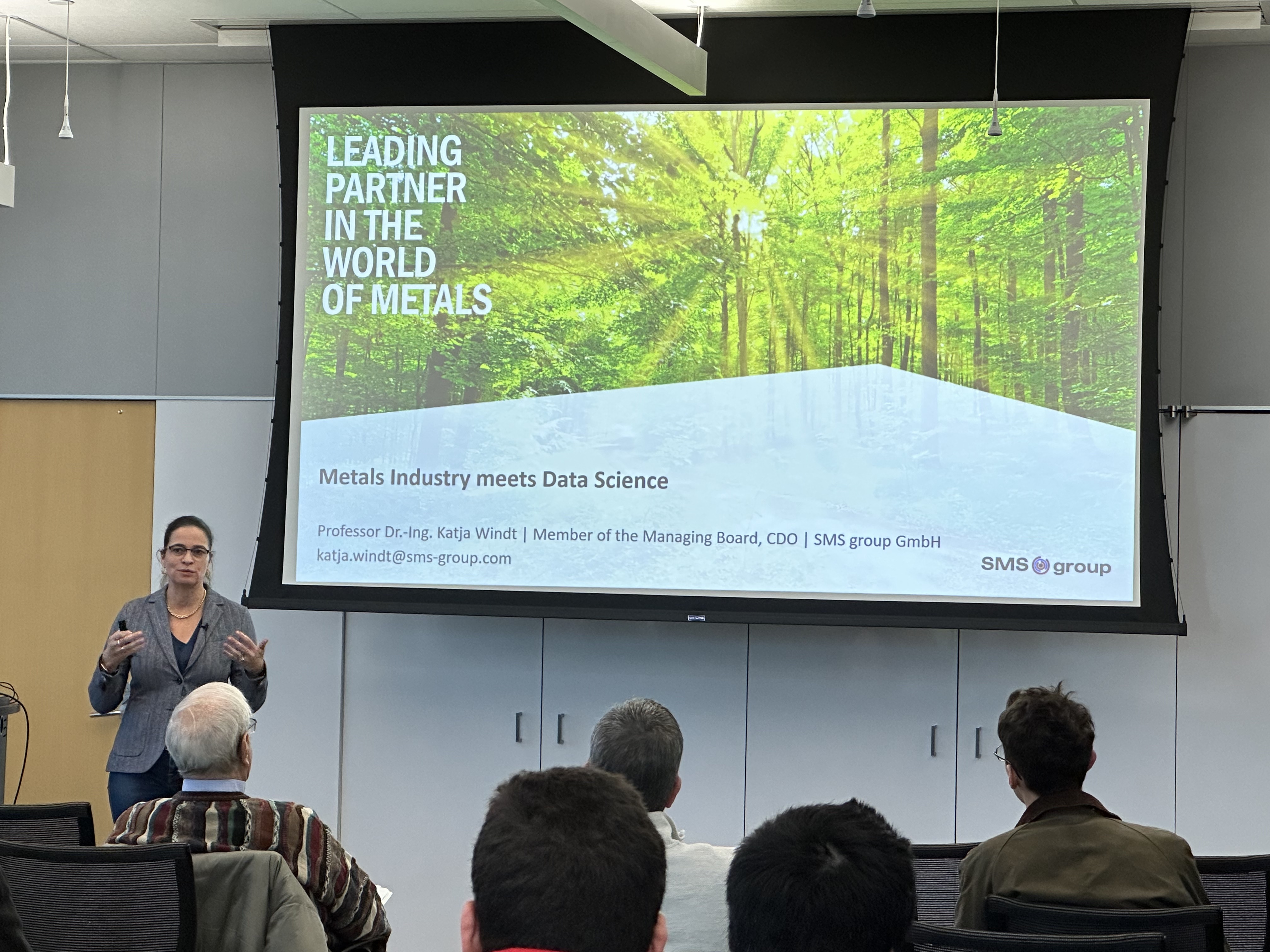
Katja Windt from SMS group will join us on campus for the Distinguished Lecture: Metals Industry meets Data Science. The seminar will overview the challenges of decarbonizing steel industry & share use cases to show the application potential of data science.
WATCH VIDEO HEREDistinguished Lecture with Brian Anderson | Oct 26 at 12PM
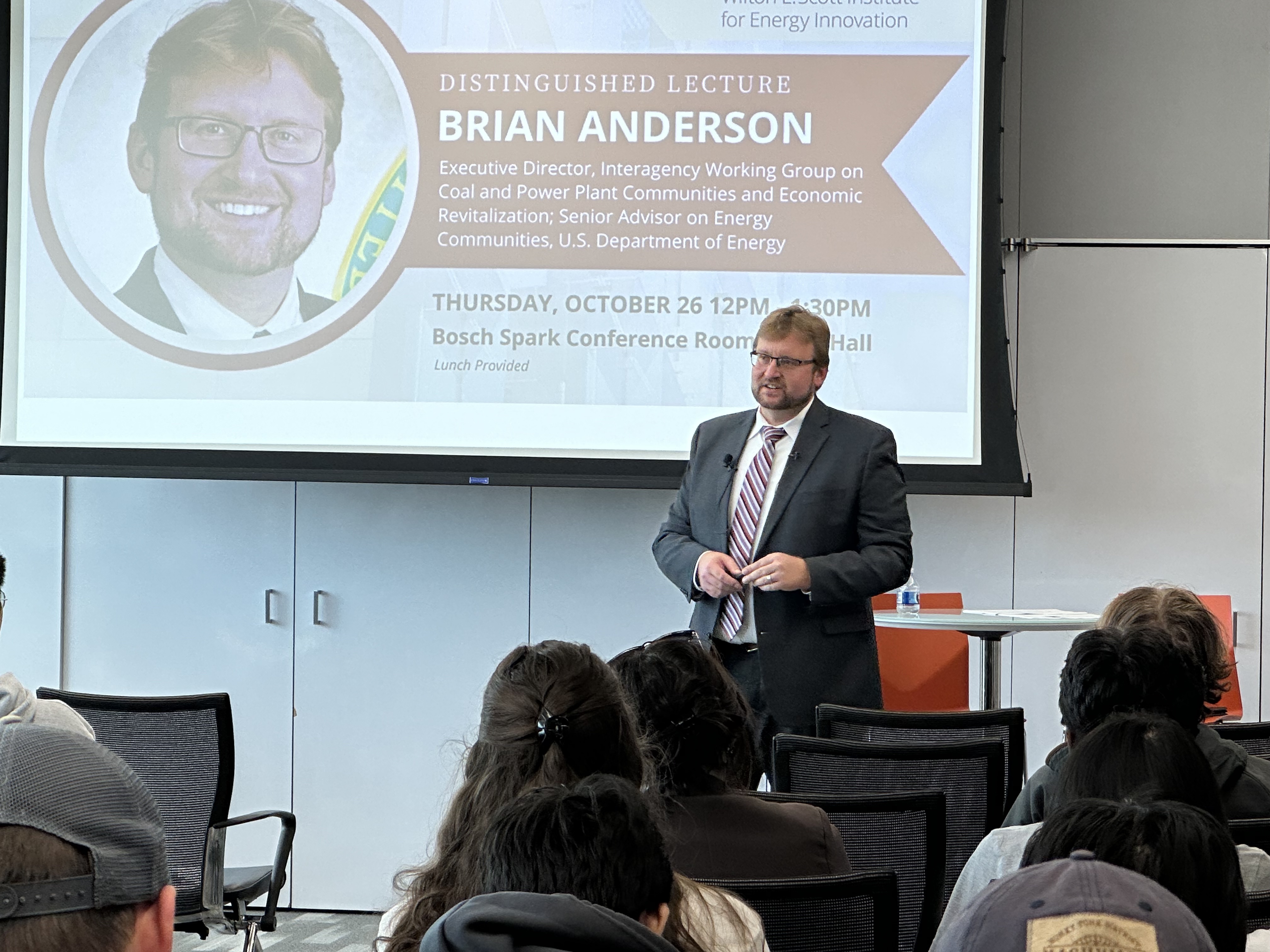
Learn firsthand how the Energy Communities Interagency Working Group (IWG), established by President Biden during his first week in office and led by Brian Anderson, is prioritizing the immediate needs of coal-mining and power plant communities.
Distinguished Lecture with Olivia Dippo (MSE '15) | Sept 14 at 12PM
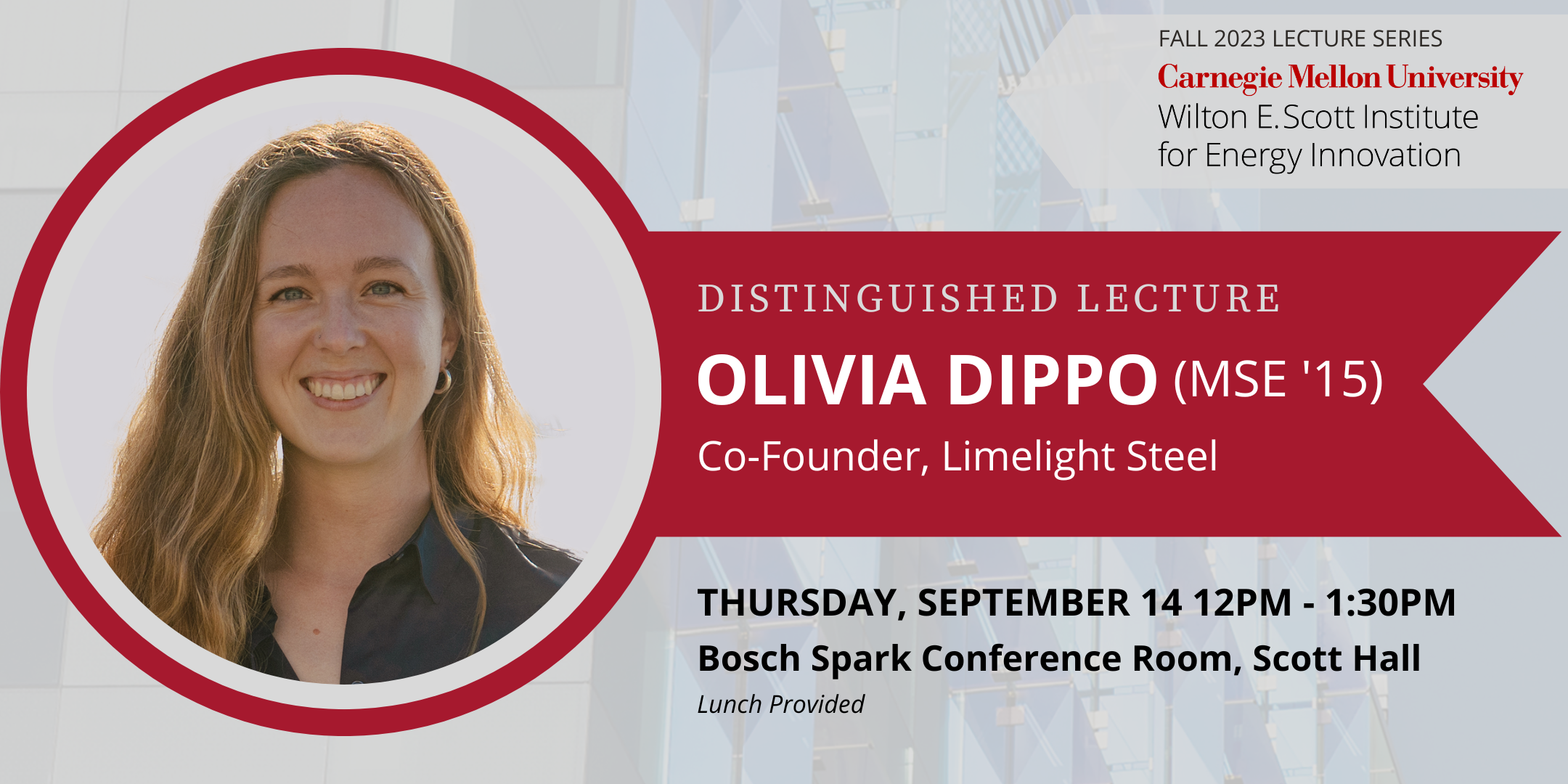
Olivia Dippo will discuss her career path, from earning her undergraduate at Carnegie Mellon in the Materials Science & Engineering department, through today as the Co-founder and CEO of Limelight Steel.
Non-Traditional Career Paths: How Students Can Join or Launch Startups | Sept 7 at 12PM
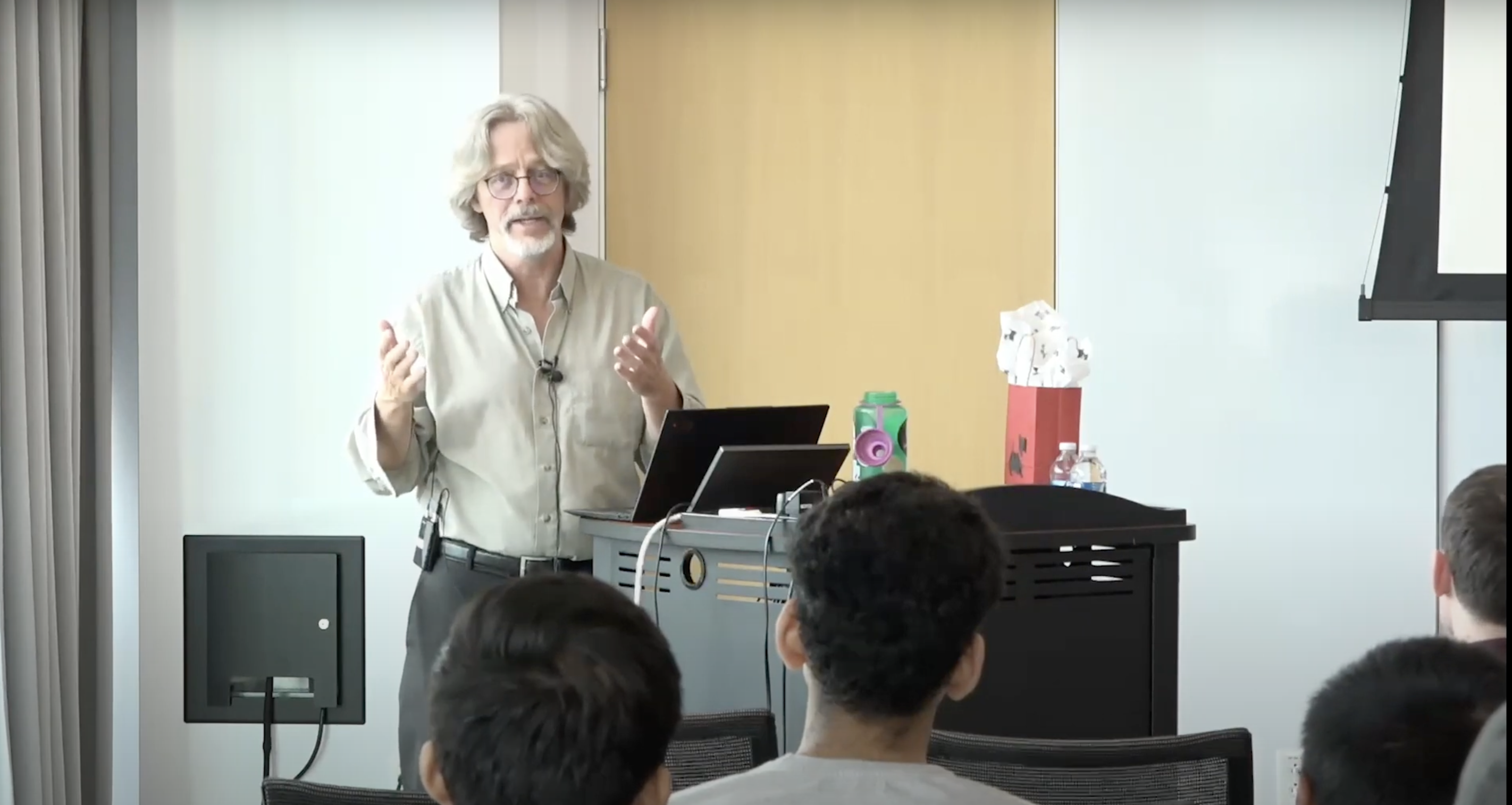
We will be joined by Reed McManigle, CMU's 'startup guru', for Non-traditional Career Paths: How Students Can Join or Launch Startup Companies. He will shed light on resources available across campus for supporting the creation of start-ups around research results, and how to tap into the dynamic startup ecosystem in Pittsburgh as an alternative to a traditional academic or large company career path.
CMU EV SHOW | April 22, 2023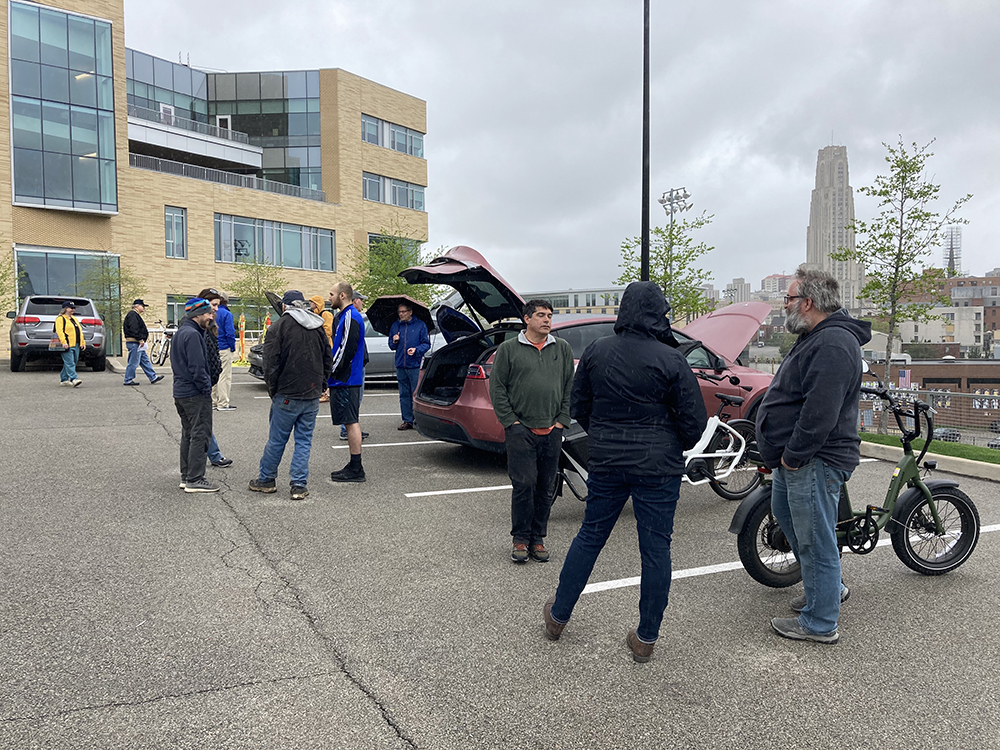
On April 22, in celebration of Earth Day 2023, the Scott Institute hosted CMU’s first ever Electric Vehicle (EV) Show, held in the Morewood Gardens parking lot.
CMU Energy Week 2023|March 21-24, 2023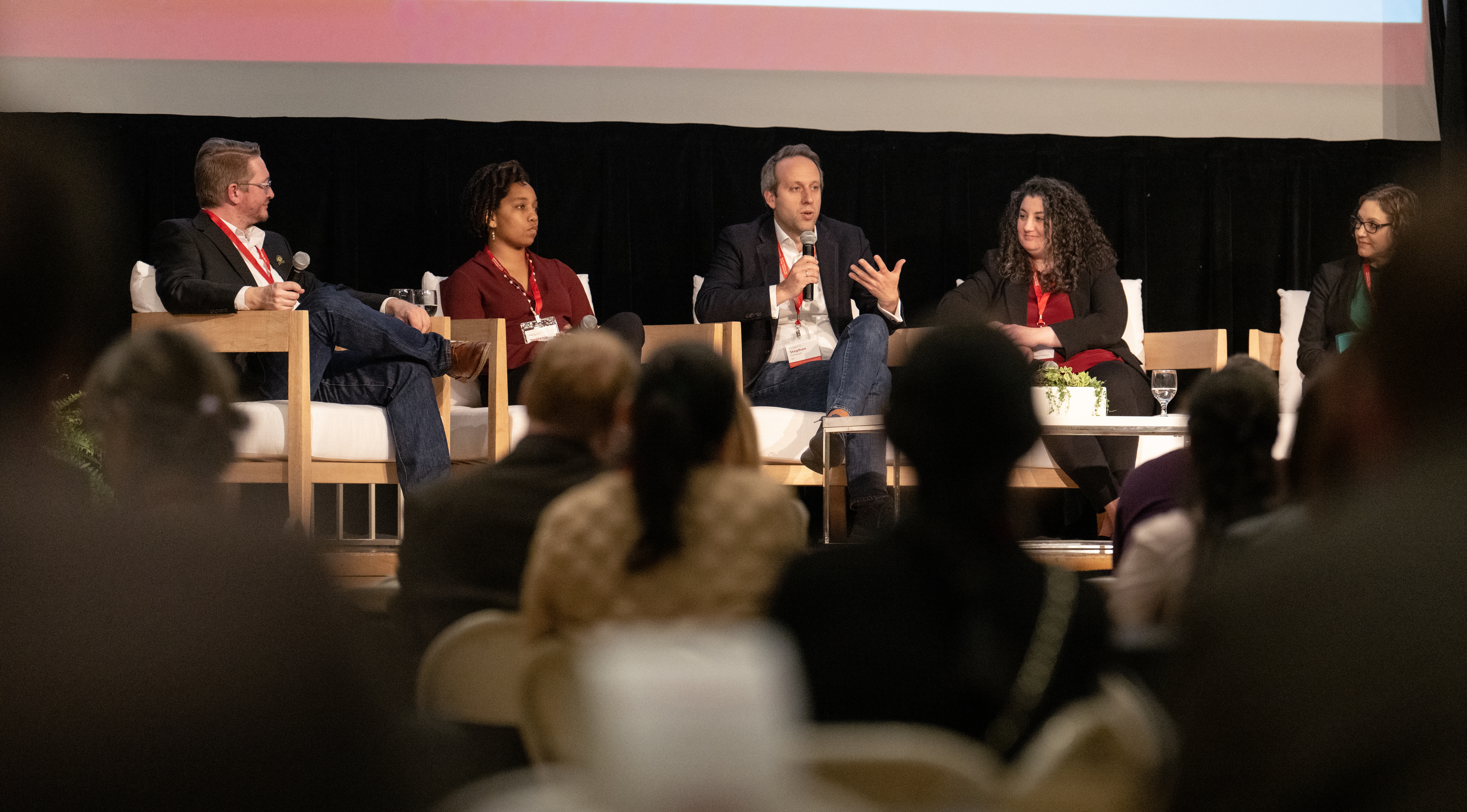
The Wilton E. Scott Institute for Energy Innovation hosted its seventh annual Carnegie Mellon University (CMU) Energy Week from March 21-24, 2023. Returning in-person for the first time since 2019, this year’s conference facilitated dialogue on the challenges and opportunities in decarbonizing the industrial sector.
EnergyTech UP Mid-Atlantic Regional Explore Event | February 16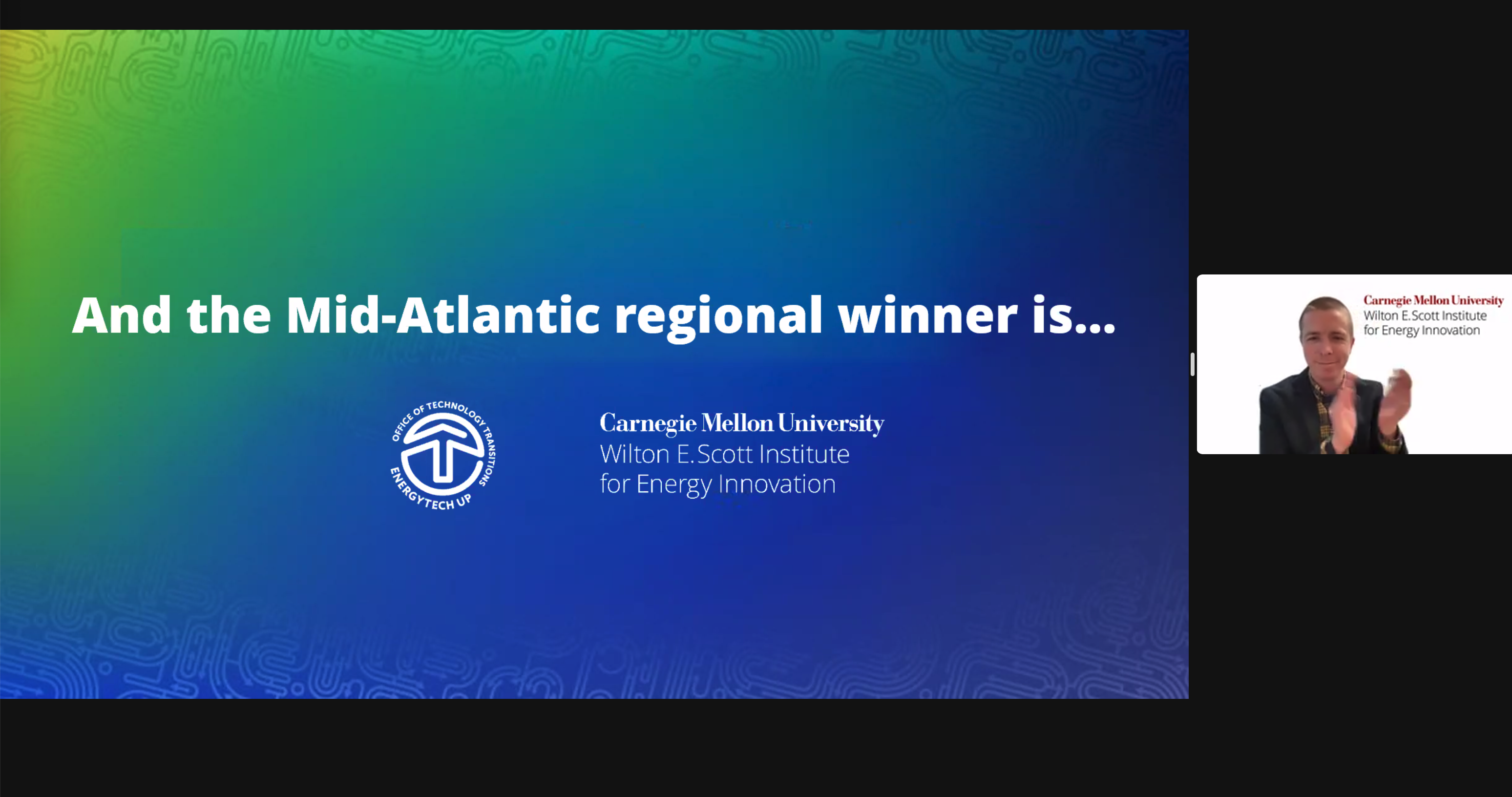
A regional showcase of the EnergyTech University Prize (EnergyTech UP), sponsored by the U.S. Department of Energy’s Office of Technology Transitions. Observe team presentations as they compete to move onto the final national competition.
Distinguished Lecture with Austin Mitchell (EPP '13) | January 25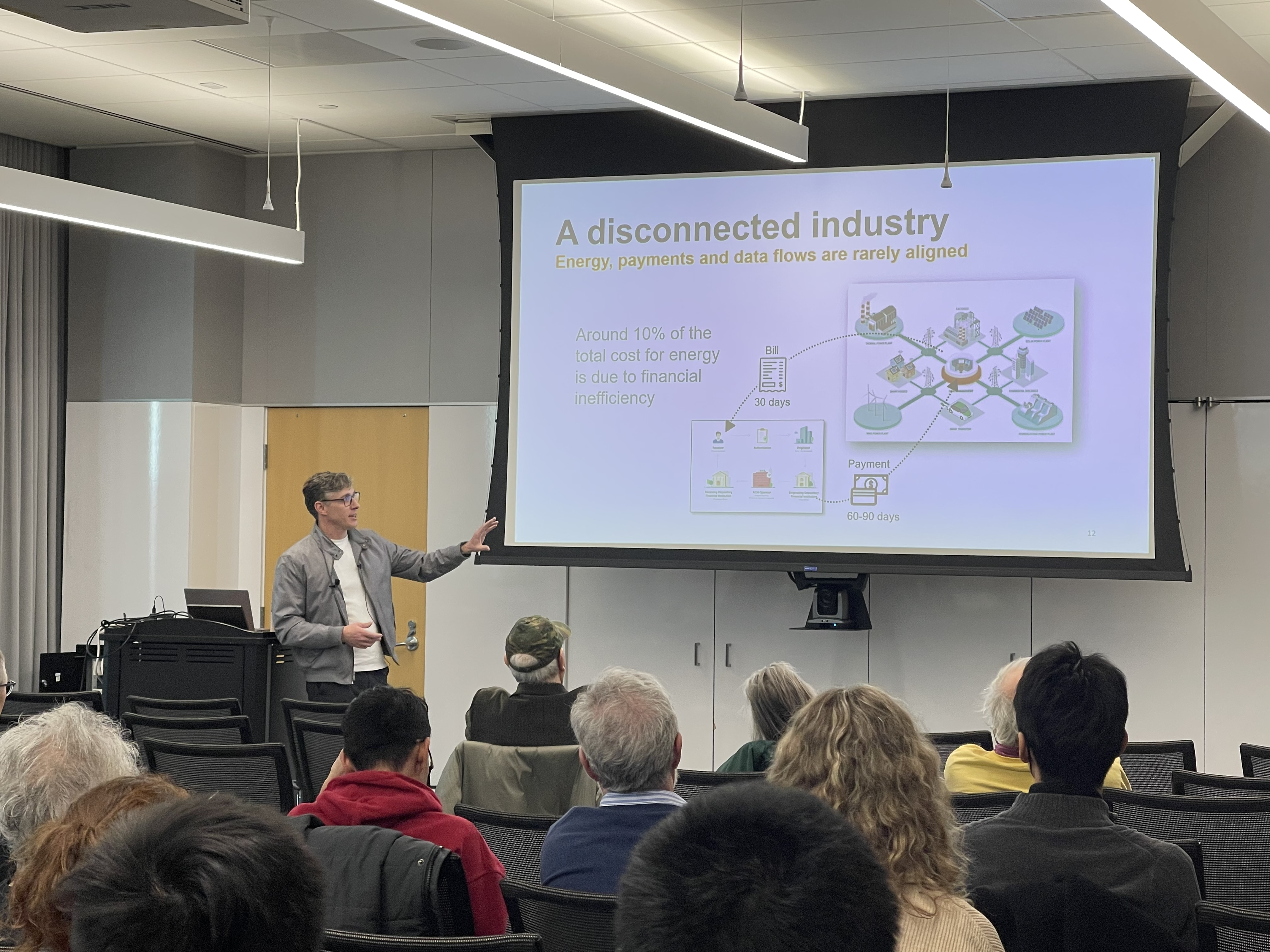
Austin Mitchell is the Co-founder and CEO of Synota and has spent his career in the energy industry. Mitchell discussed his journey to entrepreneurship inclusive of his experiences at CMU and in the energy industry, the landscape of crypto, blockchain and energy, and solutions built on the Bitcoin protocol that will lead us towards a future of energy abundance.
2022 Events
Distinguished Lecture: Joseph DeCarolis | November 15, 2022
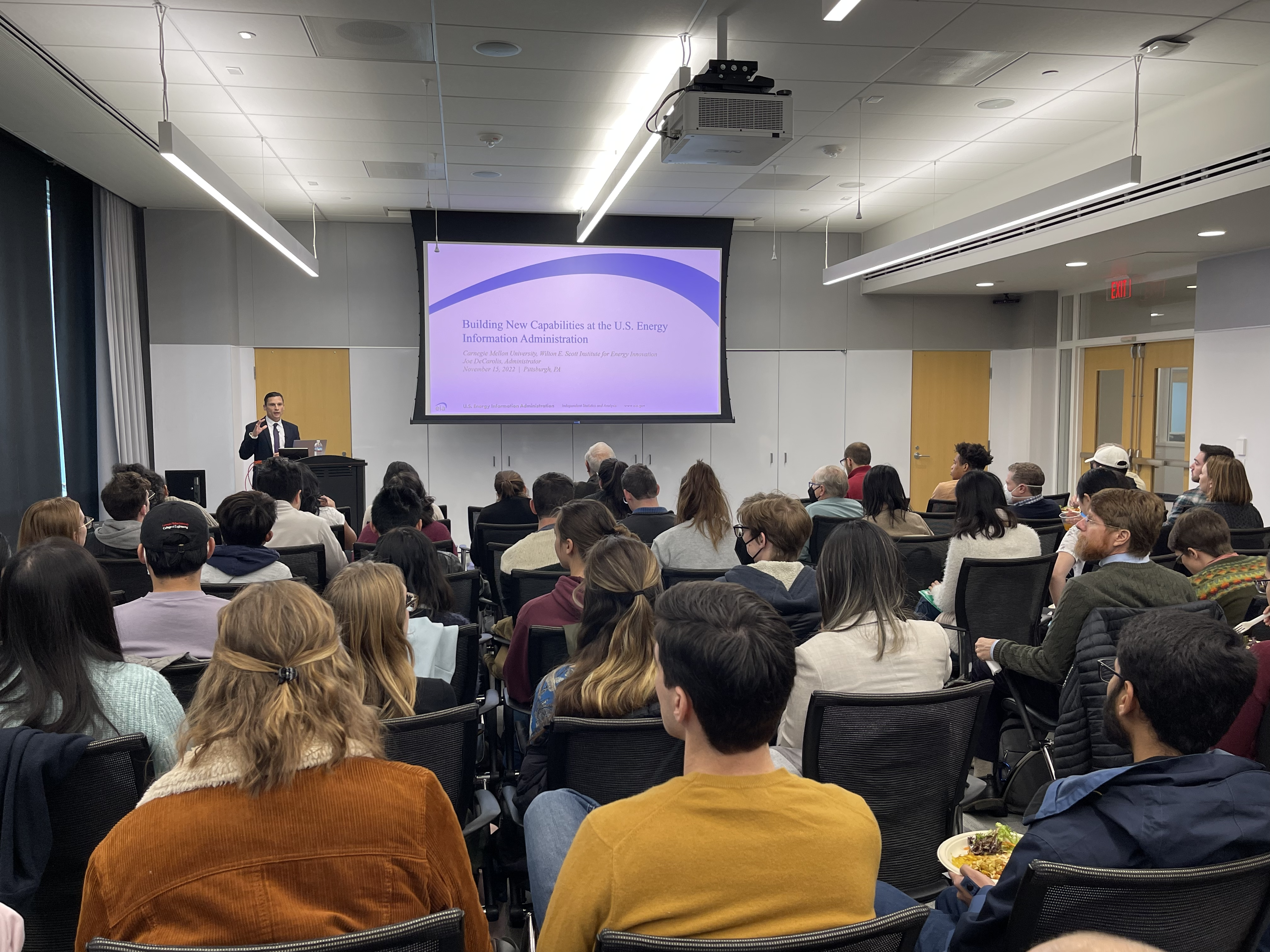
Dr. DeCarolis discussed priorities and ongoing activities at EIA and the many lessons he learned as a graduate student in Engineering and Public Policy at Carnegie Mellon.
Distinguished Lecture: Mary Beth Green | October 27, 2022
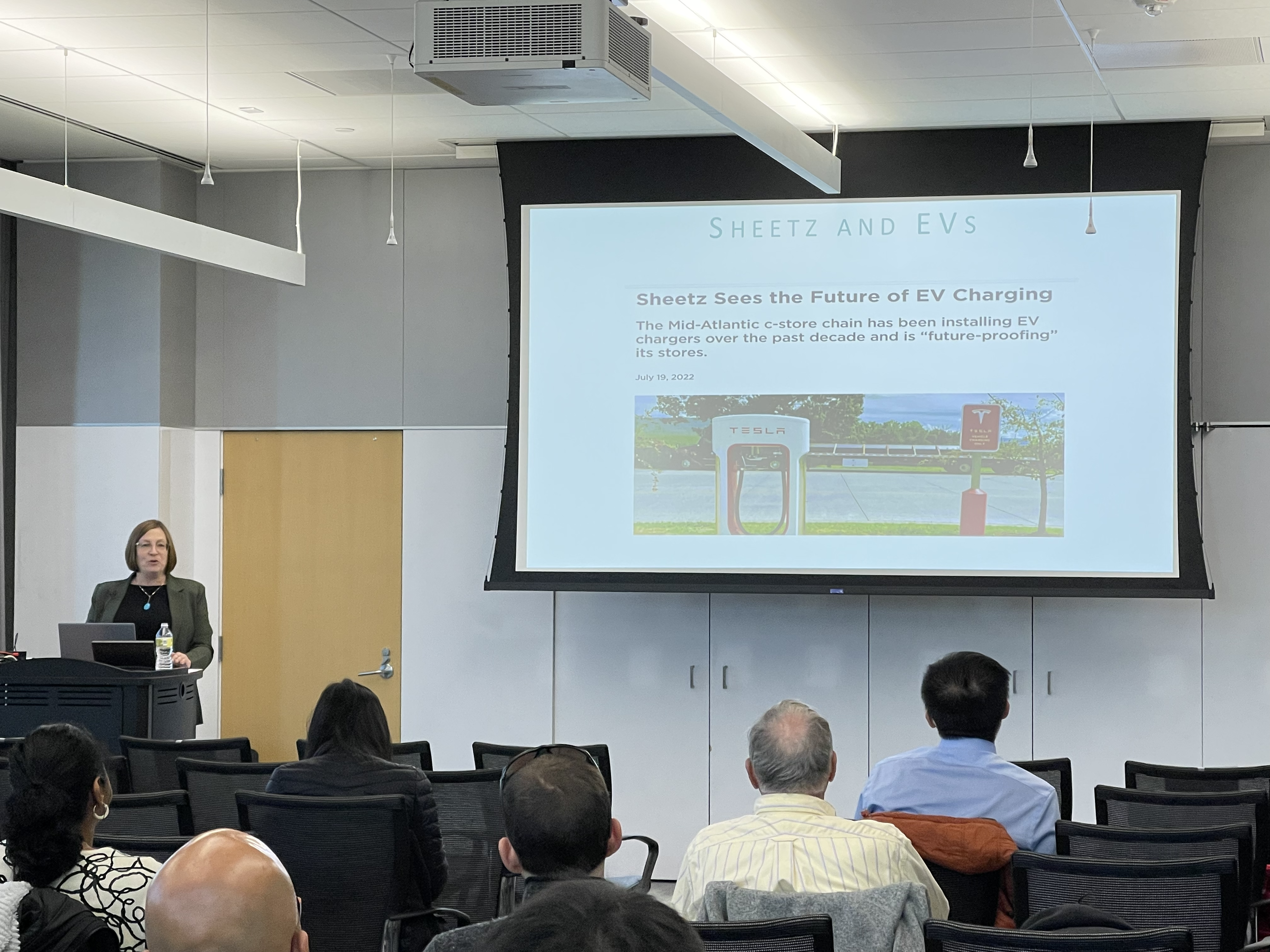
Mary Beth Green shared historical context for how innovation has developed at Sheetz, best practices for consistent commercialization, a sneak peak of the future of innovation at Sheetz and key takeaways for those who want to power innovation in their business planning, studies, jobs or companies.
Student Energy @ Scott Institute Lunch Seminar | September 12, 2022
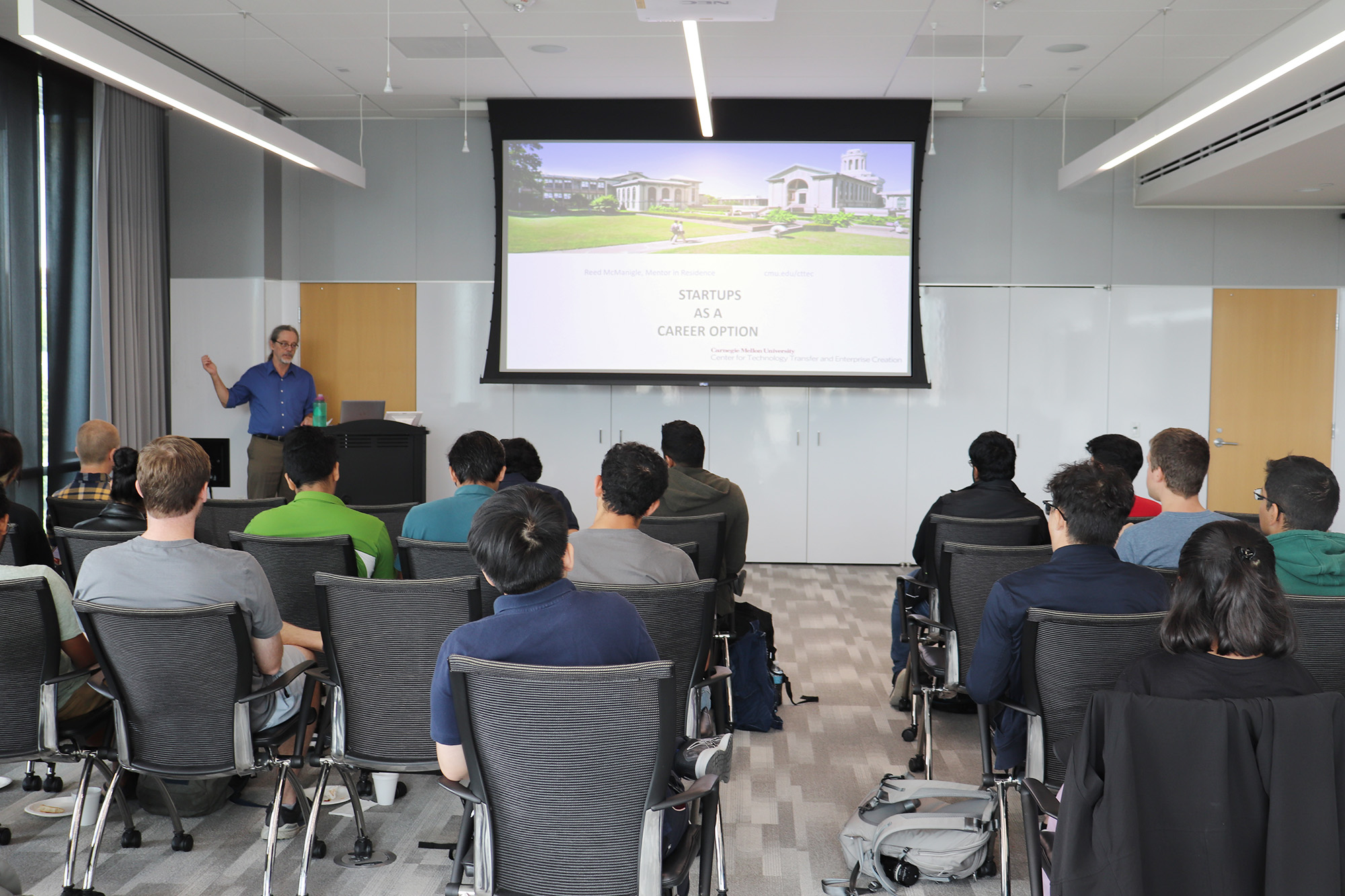
Reed McManigle joined the Scott Institute to discuss: Beyond Academia: How faculty and PhD students can launch and grow startup companies based on their research results
Northeast Workshop on Energy Policy and Environmental Economics | June 13-14, 2022
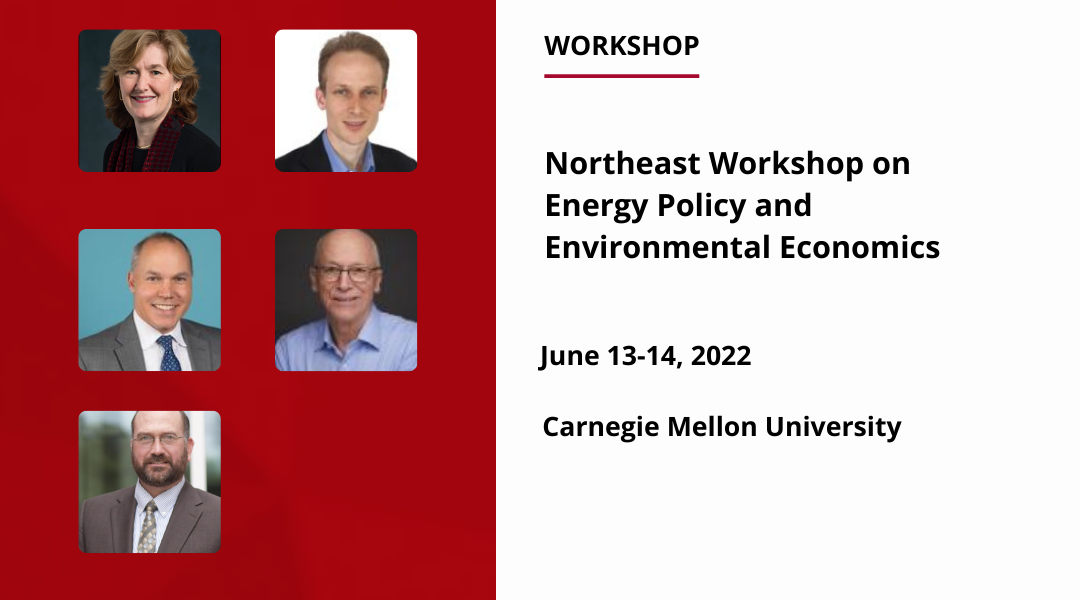
The Northeast Workshop on Energy Policy and Environmental Economics met June 13 - 14, 2022 at Carnegie Mellon University
Special Virtual Distinguished Lecture | Wed, April 27, 2022
Join the Wilton E. Scott Institute for Energy Innovation (Carnegie Mellon University) and The Payne Institute for Public Policy (Colorado School of Mines) for a virtual distinguished lecture with Jay Hakes, Presidential and Energy Historian, Author, and former Administrator of the U.S. Energy Information Administration.
Virtual Distinguished Lecture: Shashank Samala | March 2, 2022

The Scott Institute for Energy Innovation at Carnegie Mellon University hosted a Distinguished Lecture featuring Shashank Samala. The lecture and discussion focused on the engineering and robotics challenges behind scaling a direct carbon capture technology.
Endgame: Decarbonization—How do We Get There?: Exploring EVs, Electrification and Policy Priorities in the Transportation Sector | Jan 25, 2022
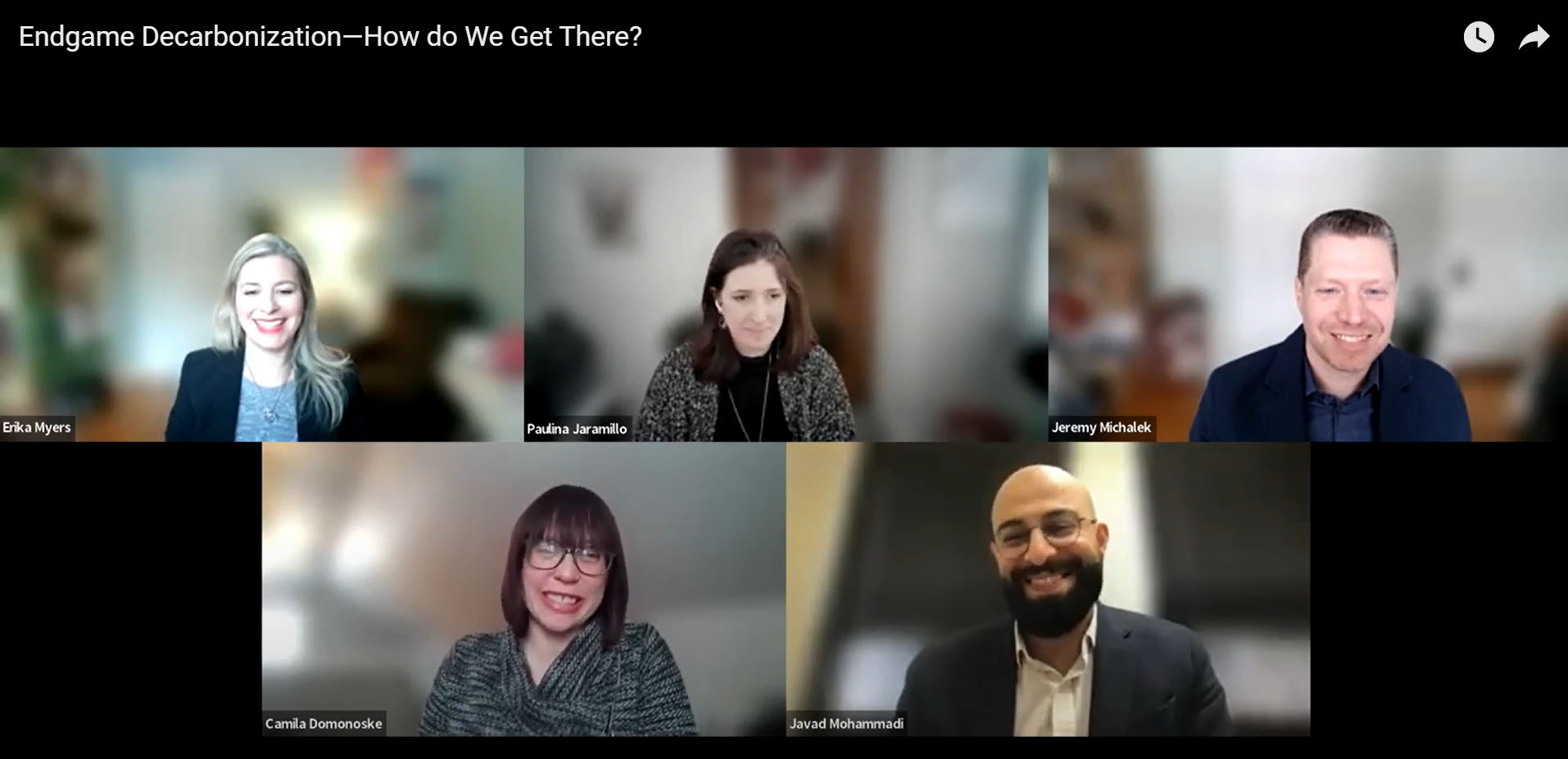
The Block Center for Technology and Society and the Wilton E. Scott Institute for Energy Innovation partnered to host an important conversation on national decarbonization strategies.
Virtual Seminar - Karthish Manthiram: Electrification and Decarbonization of Chemical Synthesis | Feb 4, 2022
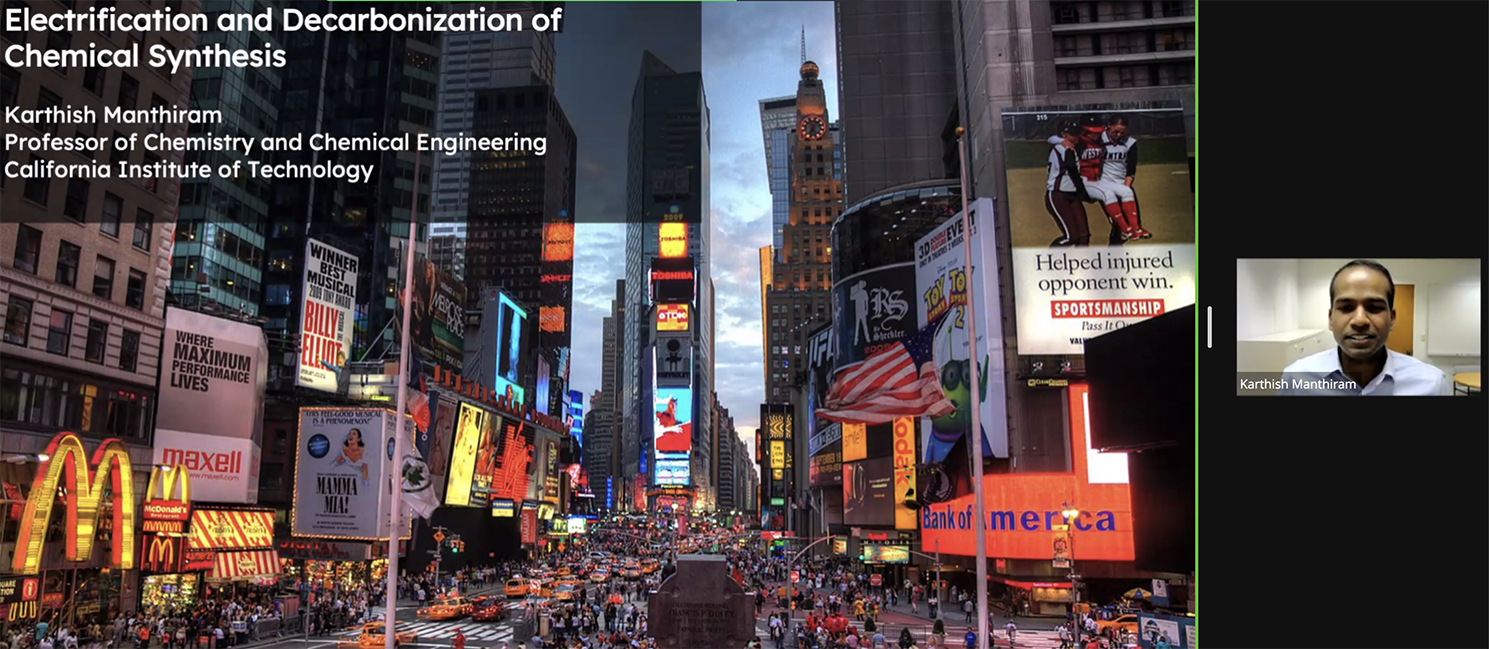
The Wilton E. Scott Institute of Energy Innovation and Pitt Swanson School of Engineering co-hosted a virtual seminar with Karthish Manthiram to discuss the research being conducted in the Manthiram Lab.
2020-2021 Events
Beneficial Electrification | Dec 16, 2021
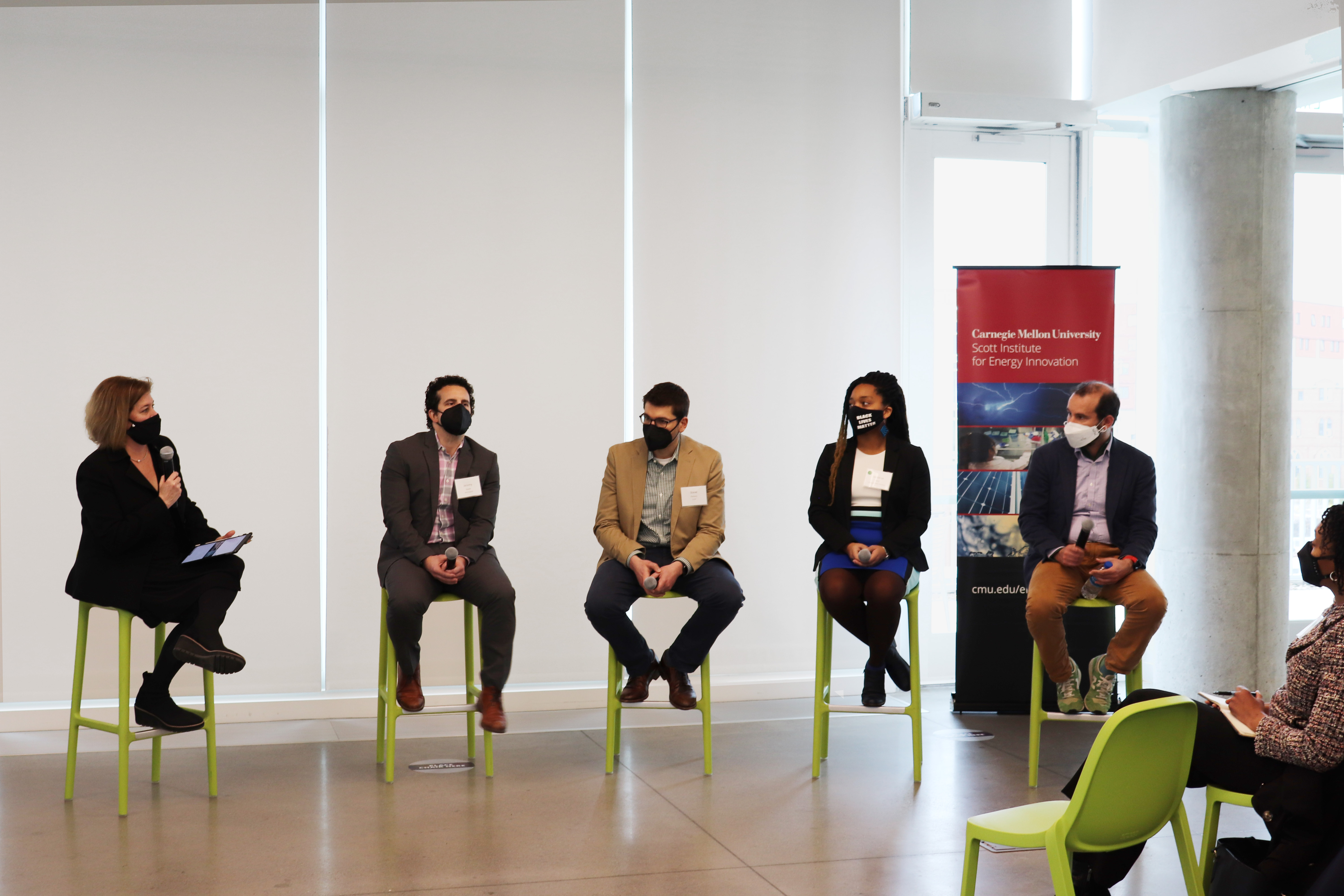
The Wilton E. Scott Institute of Energy Innovation and Duquesne Light Company hosted an event on Dec 16, 2021 to discuss the implications of electrification in the built environment, and specific ways that it can help accelerate the energy transition in communities.
Investor Insights – Decision-Making Strategies for Energy and Cleantech | December 2, 2021
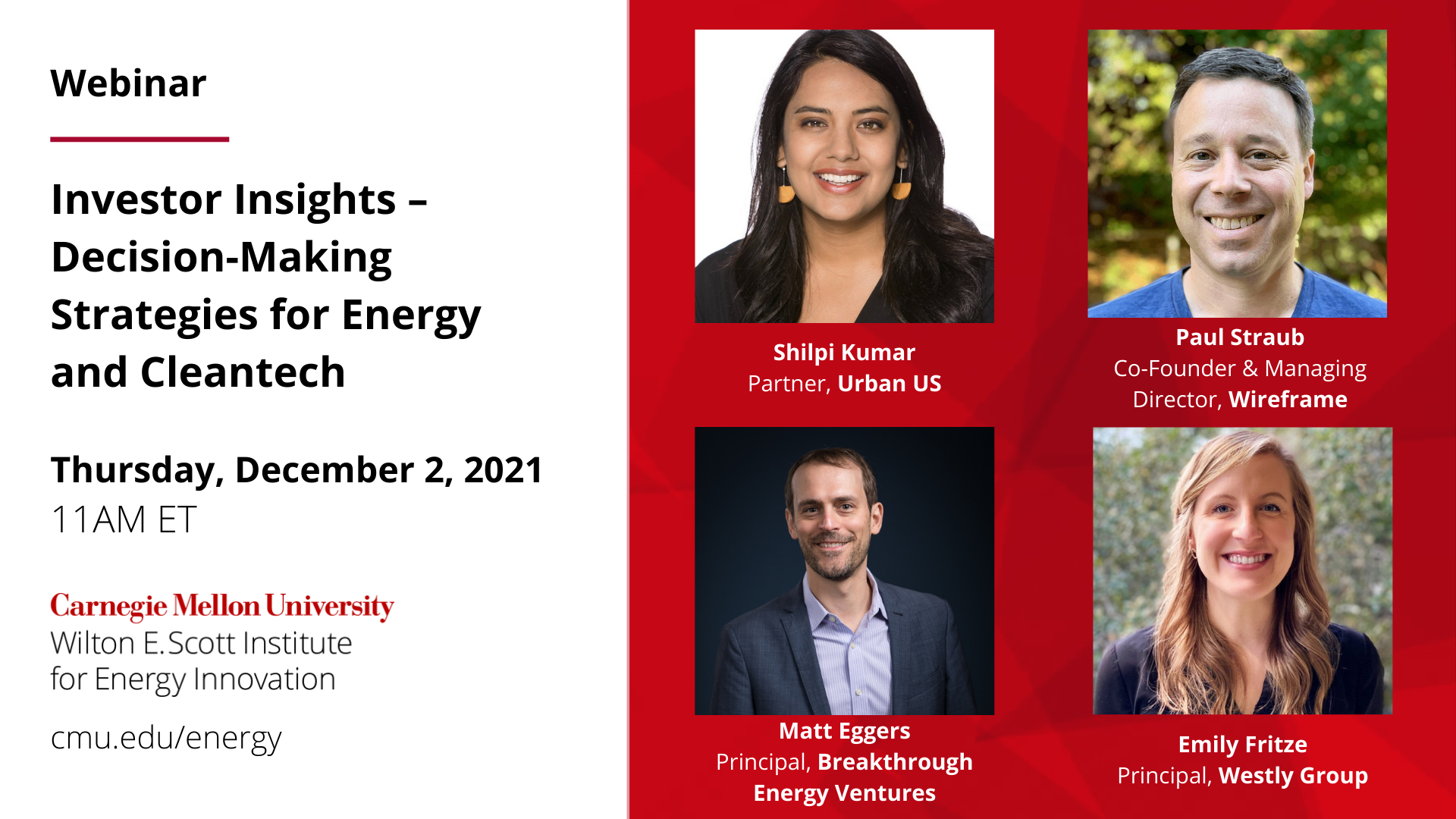
Investment pioneers from Breakthrough Energy Ventures, Collaborative Fund, and Wireframe Ventures discussed with the Scott Institute what resonates with them, what entrepreneurs should be considering, and how we can collectively make important investments happen.
3rd Annual CMU Technology, Sustainability, and Business Forum | November 18, 1PM EST
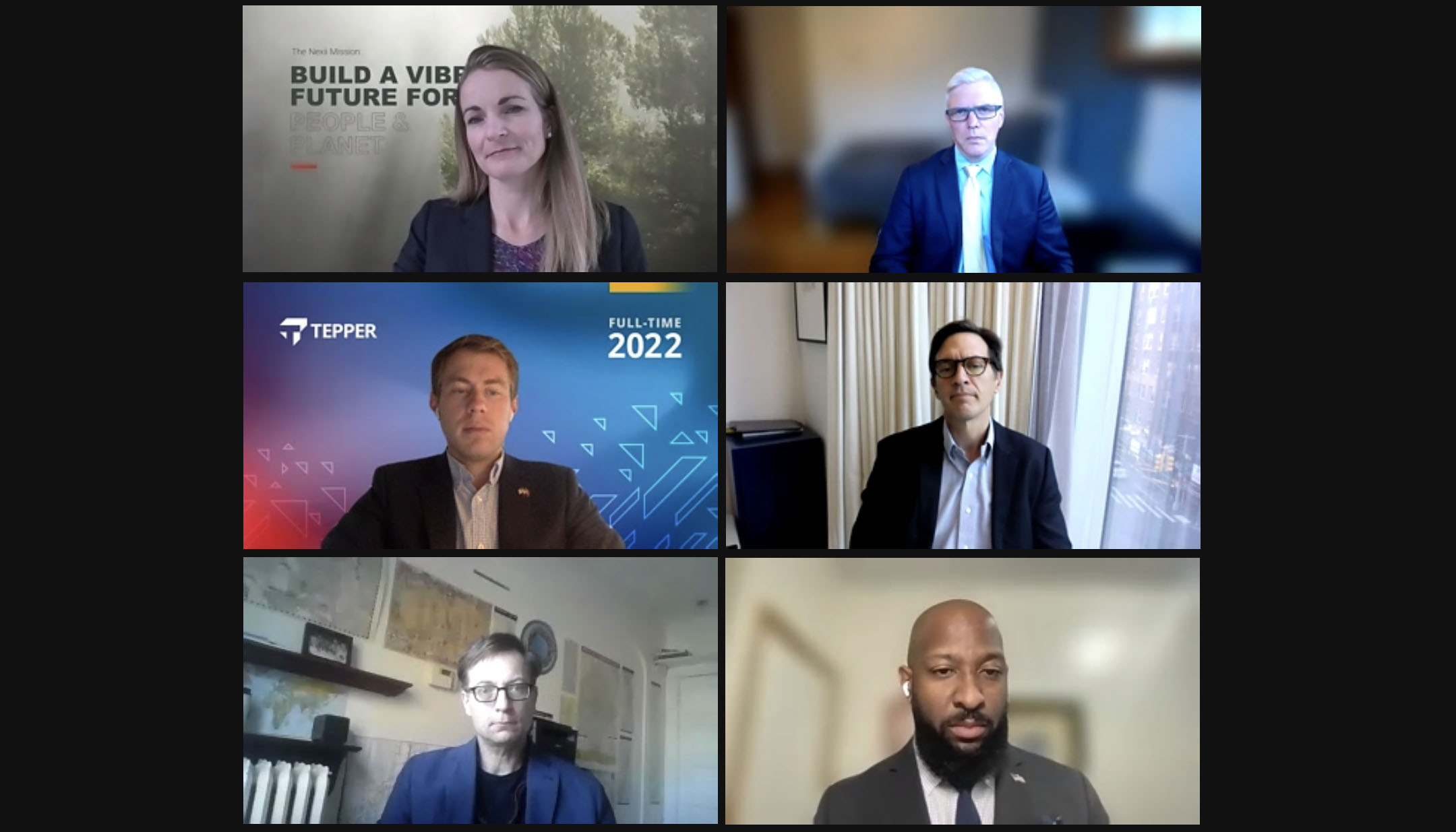
A joint effort between the Tepper School of Business and the Wilton E. Scott Institute for Energy Innovation at Carnegie Mellon, this conference discusses the latest research and trends impacting sustainability topics.
Distinguished Lecture by 38 North Solutions' Katherine Hamilton | November 9, 11AM ET
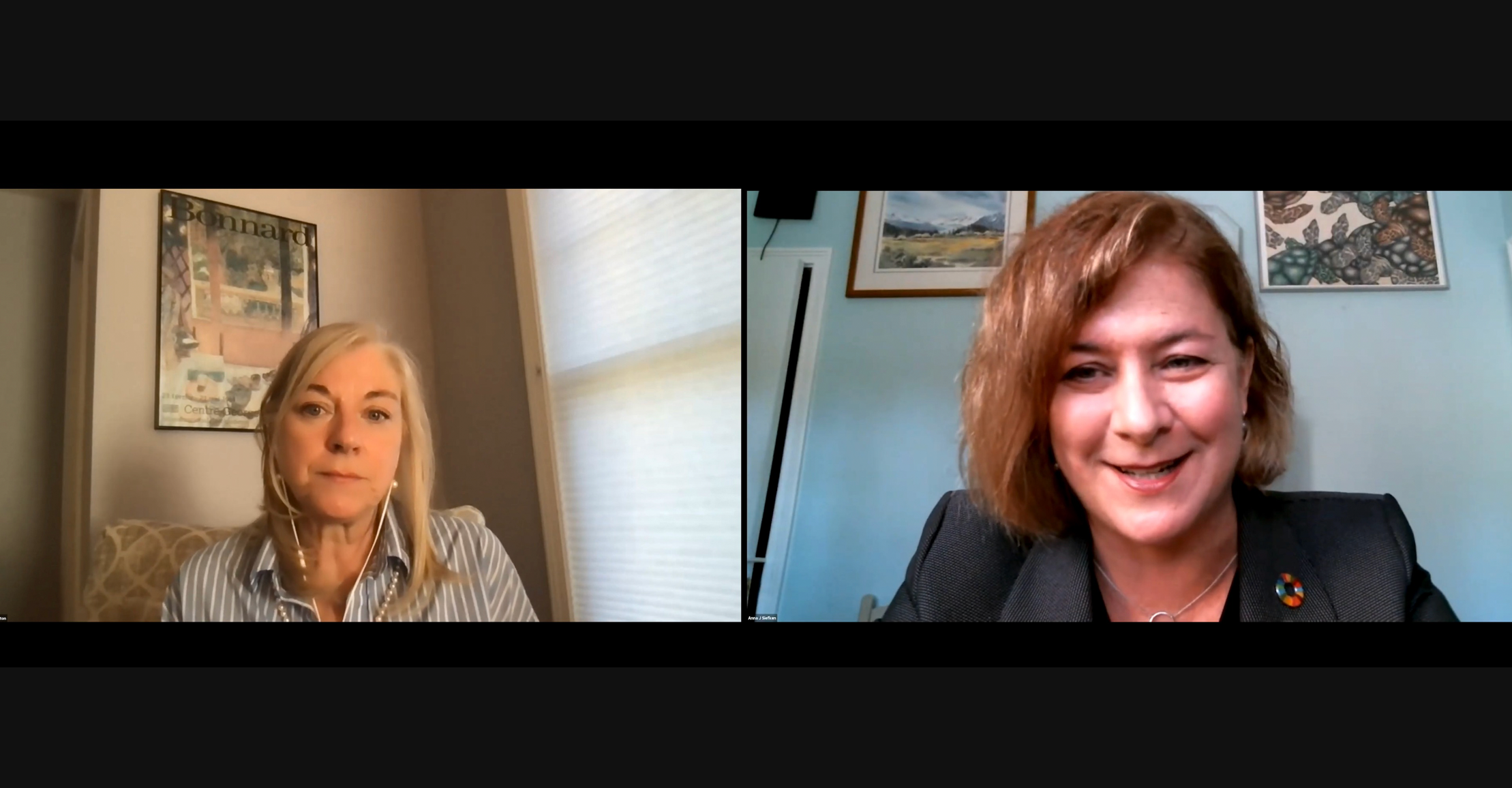
Katherine Hamilton from 38 North Solutions discusses how public policy intersects with innovation in technology and business models—and how entrepreneurs and leaders can build it into their long term goals.
Distinguished Lecture by Siemens Energy's Richard Voorberg | November 2, 12PM ET
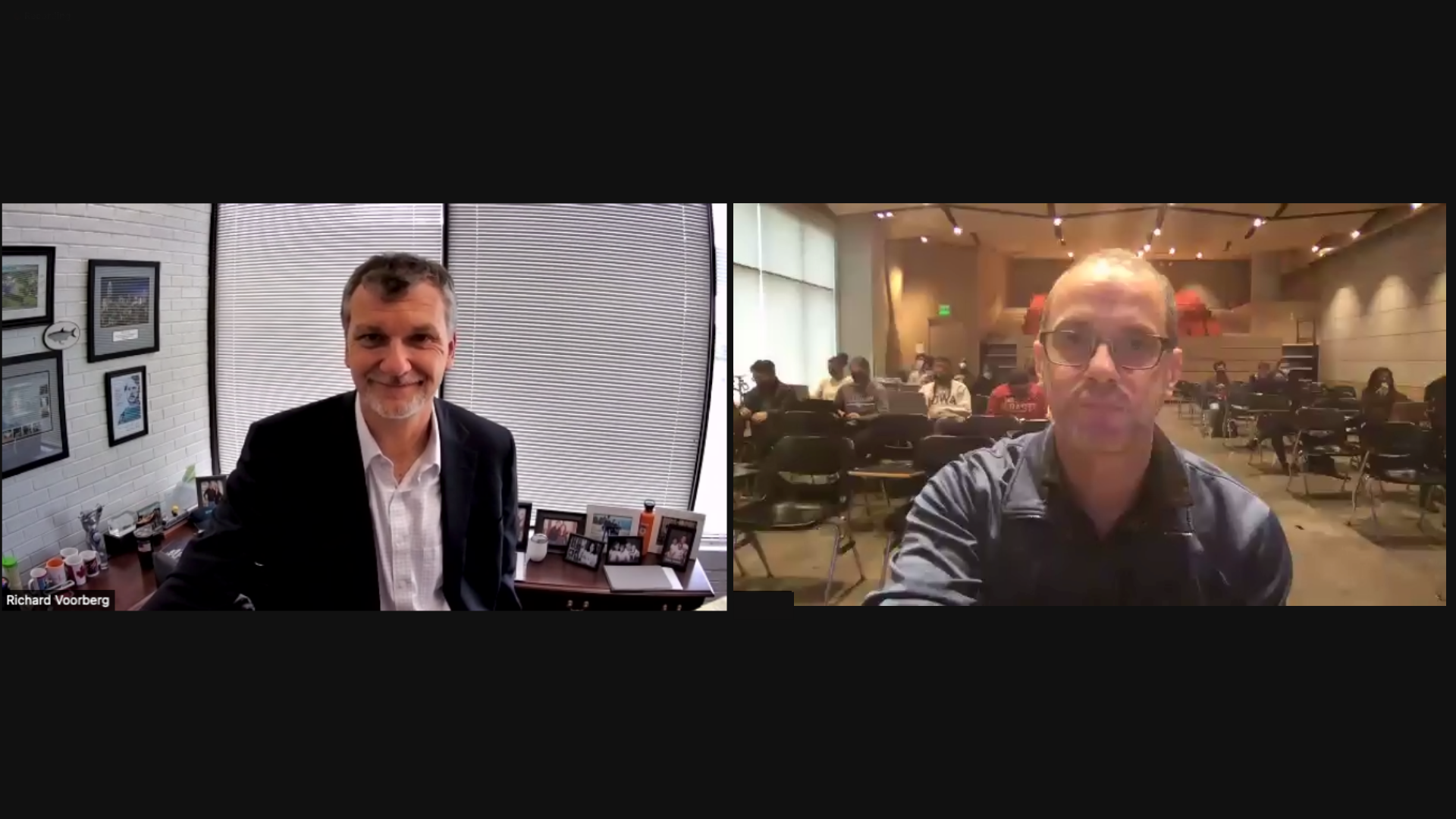
Richard Voorberg is President of the North America Hub of Siemens Energy. Learn more about Richard's role in having regional responsibility for the Energy business in the Americas, which includes the company’s Generation, Industrial Applications, and Transmission divisions during our Virtual Distinguished Lecture.
Distinguished Lecture by NREL's Martin Keller | October 26, 1PM ET
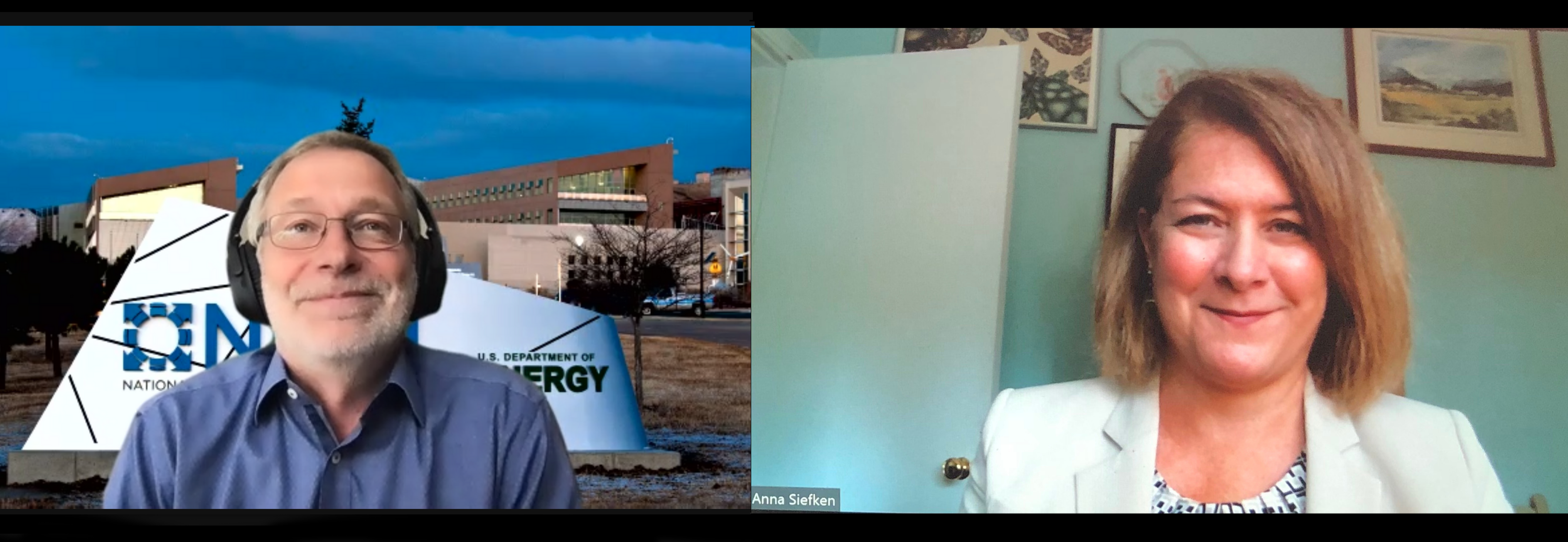
Since 2015, Martin Keller has served as Director of NREL and President of the Alliance for Sustainable Energy. During this webinar, hear how Director Keller works collaboratively with his leadership team, developing a strategy for NREL focused on three key initiatives to ensure a resilient grid: Integrated Energy Pathways, Circular Economy, and Electrons to Molecules. These initiatives are imperative to decarbonizing the economy by 2050.
Distinguished Lecture | Energy Futures Initiative's Ernie Moniz | October 14, 11AM ET
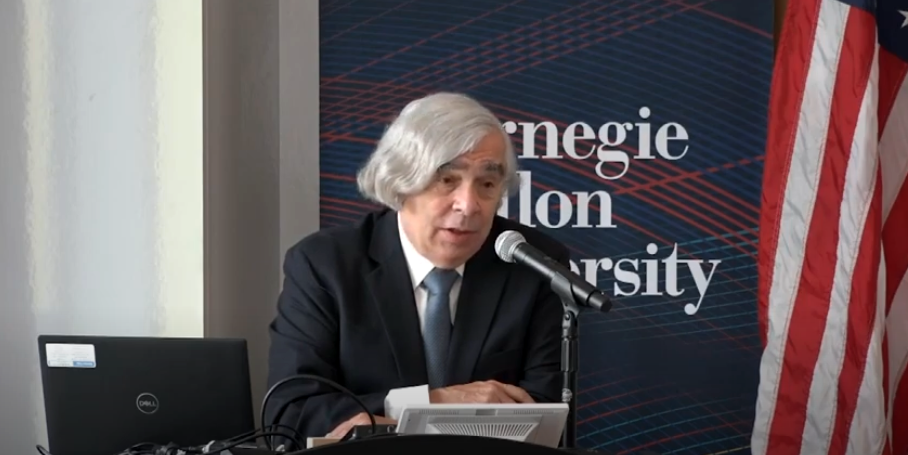
Ernie Moniz, President & CEO of Energy Futures Initiative discusses the U.S. low carbon energy transition during a Distinguished Lecture Event hosted by Carnegie Mellon University's Wilton E. Scott Institute for Energy Innovation.
Distinguished Lecture | Director of the Climate Analysis and Strategies Center EPA’s Office of Transportation and Air Quality Britney J. McCoy | September 7, 11AM ET
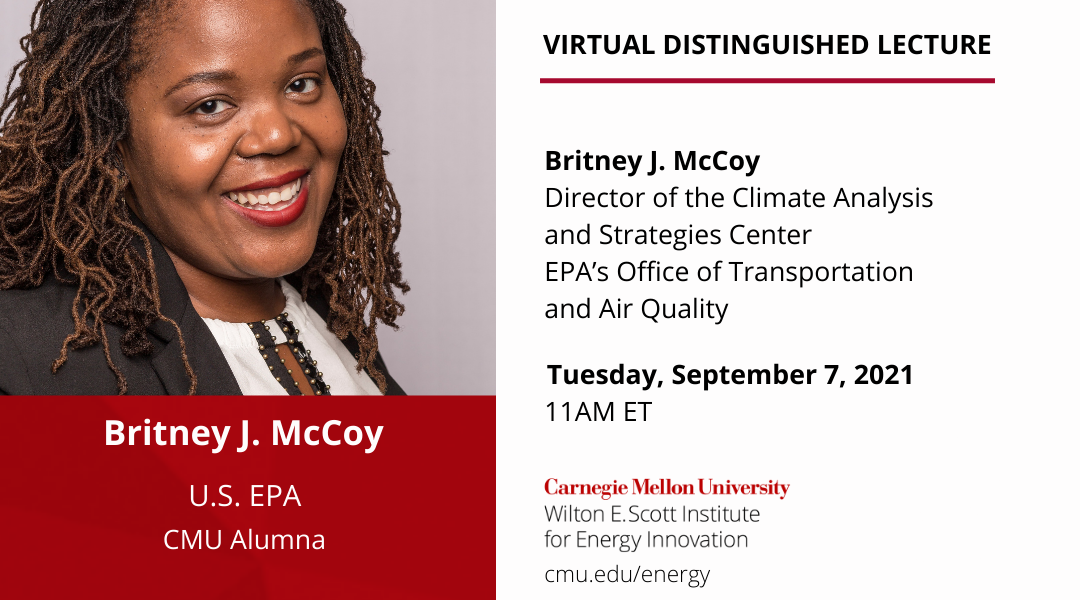
Britney J. McCoy, Director of the Climate Analysis and Strategies Center EPA's Office of Transportation and Air Quality discusses transportation and air quality.
Fireside Chat with Emily Reichert, CEO, Greentown Labs | August 18, 1PM ET
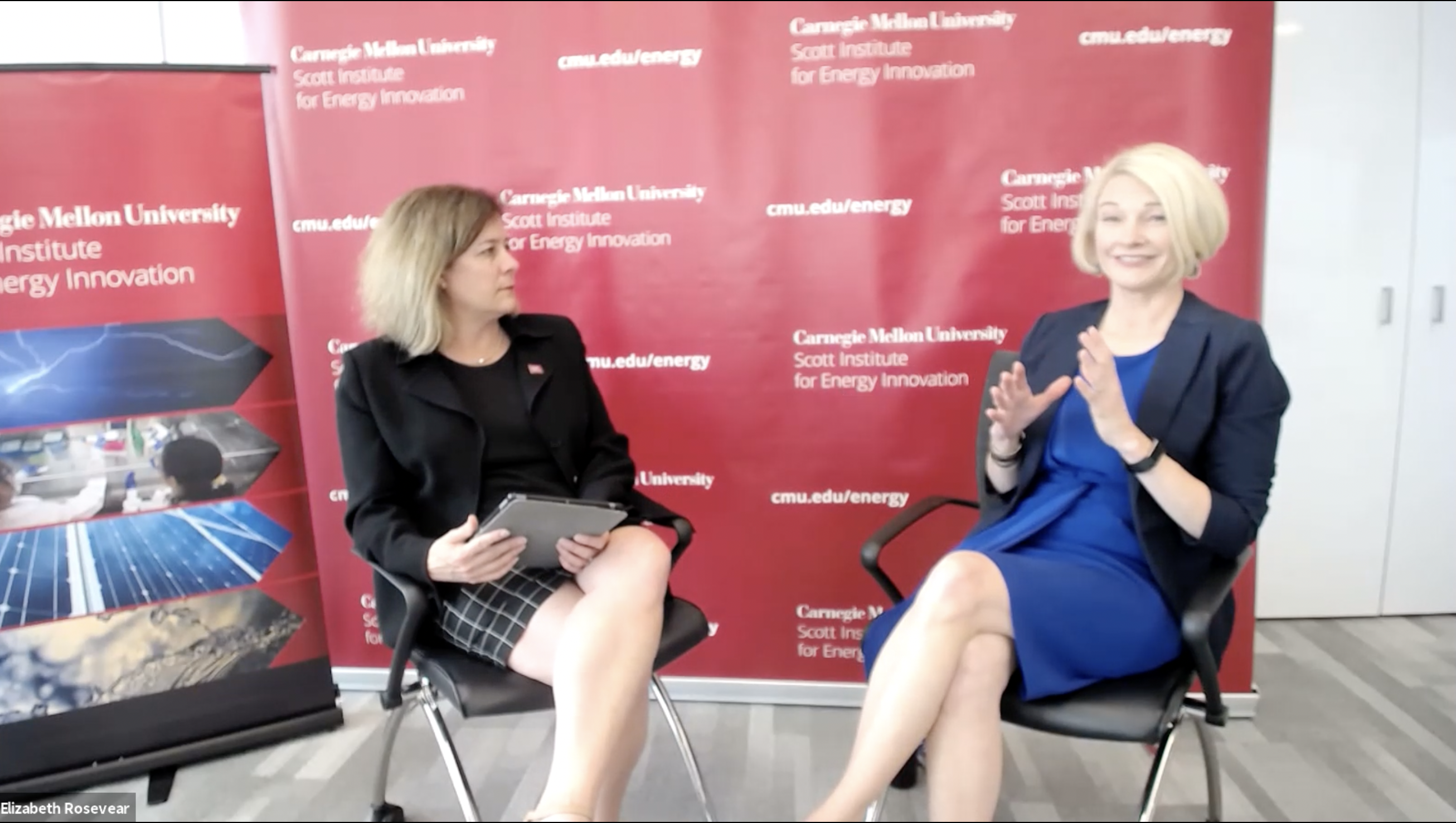
Greentown Labs, with locations near Boston and recently launched in Houston, believes in the power of entrepreneurs in the climate battle. They are confident that when combined with support and amplification from corporates, politicians, private citizens, and others, climatetech startups will drive progress. Their goal is to be the leading hub where people from all over the world congregate to work toward the shared goal of a sustainable, renewable future. Hear from Greentown Labs CEO Emily Reichert in a Fireside Chat, moderated by Scott Institute’s Anna J. Siefken.
Accelerating Innovation - From Bench Scale to Pilot & Commercialization: Solving the Hardware Challenge | July 22, 11AM ET
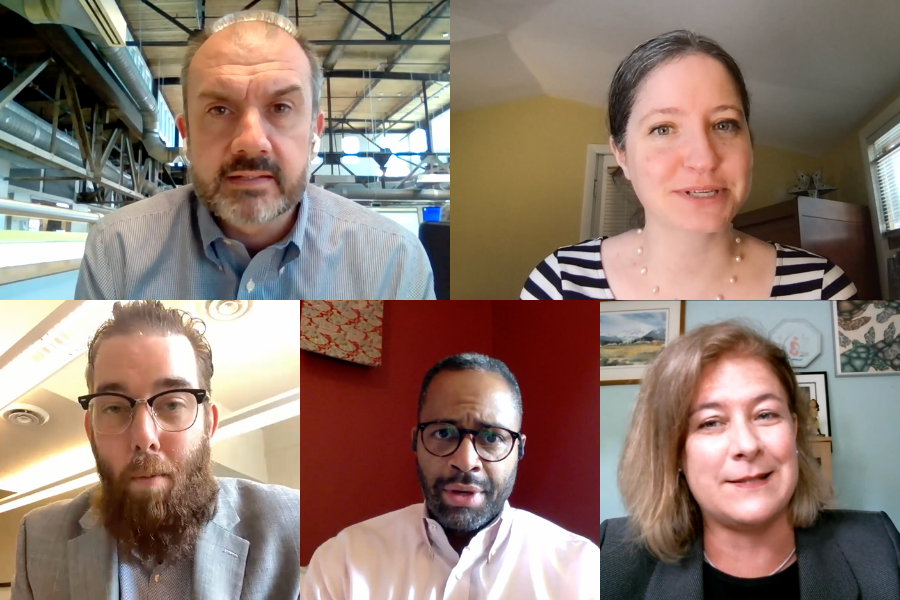
With the Biden Administration in place and decarbonization and climate change again taking center stage, accelerating the speed of innovation is paramount. What critical factors should early-stage energy entrepreneurs consider while working towards getting the first product into the market? Join the Scott Institute as we talk with four leading innovation experts about how to move to market – with special focus on hardware.
Panelists include:
-
Ryan Dings, EVP - Greentown Labs
-
Janine Elliott, Director, Incubation Programs - Los Angeles Cleantech Incubator
-
Rick Stockburger, CEO - BRITE Energy Innovators
-
Jeffrey McDaniel, Executive in Residence - Innovation Works
-
Anna J. Siefken, Executive Director - CMU Scott Institute for Energy Innovation
Batteries and the Future of Energy Storage | May 6, 11AM ET
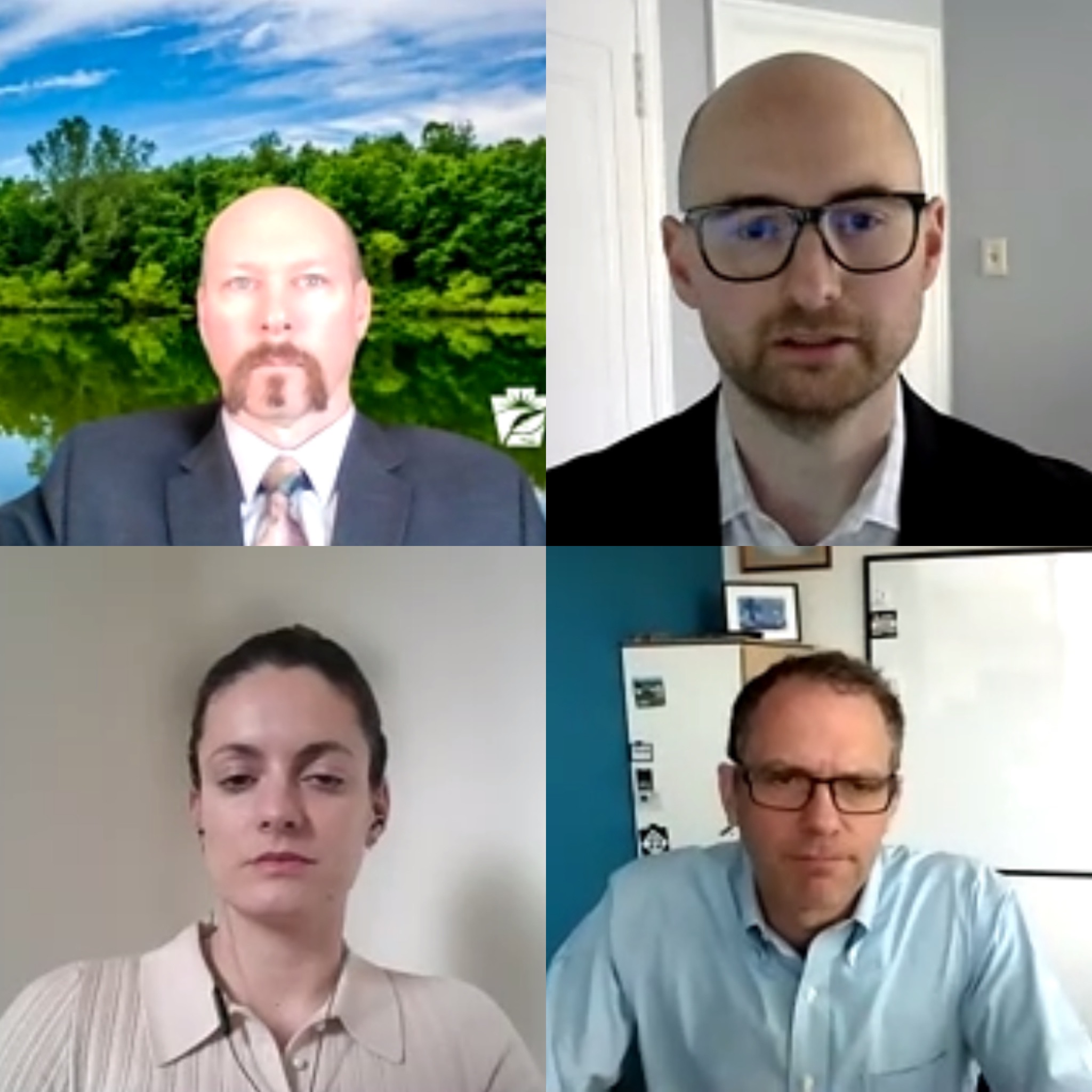
Energy Storage will be key to numerous use cases affecting the complete electricity value chain from power generation to transmission & distribution to the electrification of transportation, buildings, and industrial applications. Long-duration energy storage technologies like hydrogen storage and thermal energy storage are becoming more popular given their potential for supporting grid reliability, and addressing seasonal energy shifting and curtailed renewable energy. We discuss what technology, policy, and economic shifts are needed on the local and national levels to secure a homegrown energy storage industry that competes worldwide, creating jobs and economic vitality here in the U.S.
Panelists include:
- Jay Whitacre, Trustee Professor in Energy, Engineering and Public Policy; Materials Science and Engineering; Director, Wilton E. Scott Institute for Energy Innovation – Carnegie Mellon University
- Briggs White, Technology Manager – National Energy Technology Laboratory (NETL)
- Anouck Champsaur, VC Analyst, Sustainable Biotechnologies – Sofinnova Partners
- David Althoff, Director, Energy Programs Office – Pennsylvania Department of Environmental Protection
- Anna J. Siefken, Executive Director, Wilton E. Scott Institute for Energy Innovation – Carnegie Mellon University (moderator)
Optimizing Clean Energy for Cities, Companies, & Campuses with the U.N. Sustainable Development Goals – Three Leaders’ Perspectives| April 22, 11AM ET
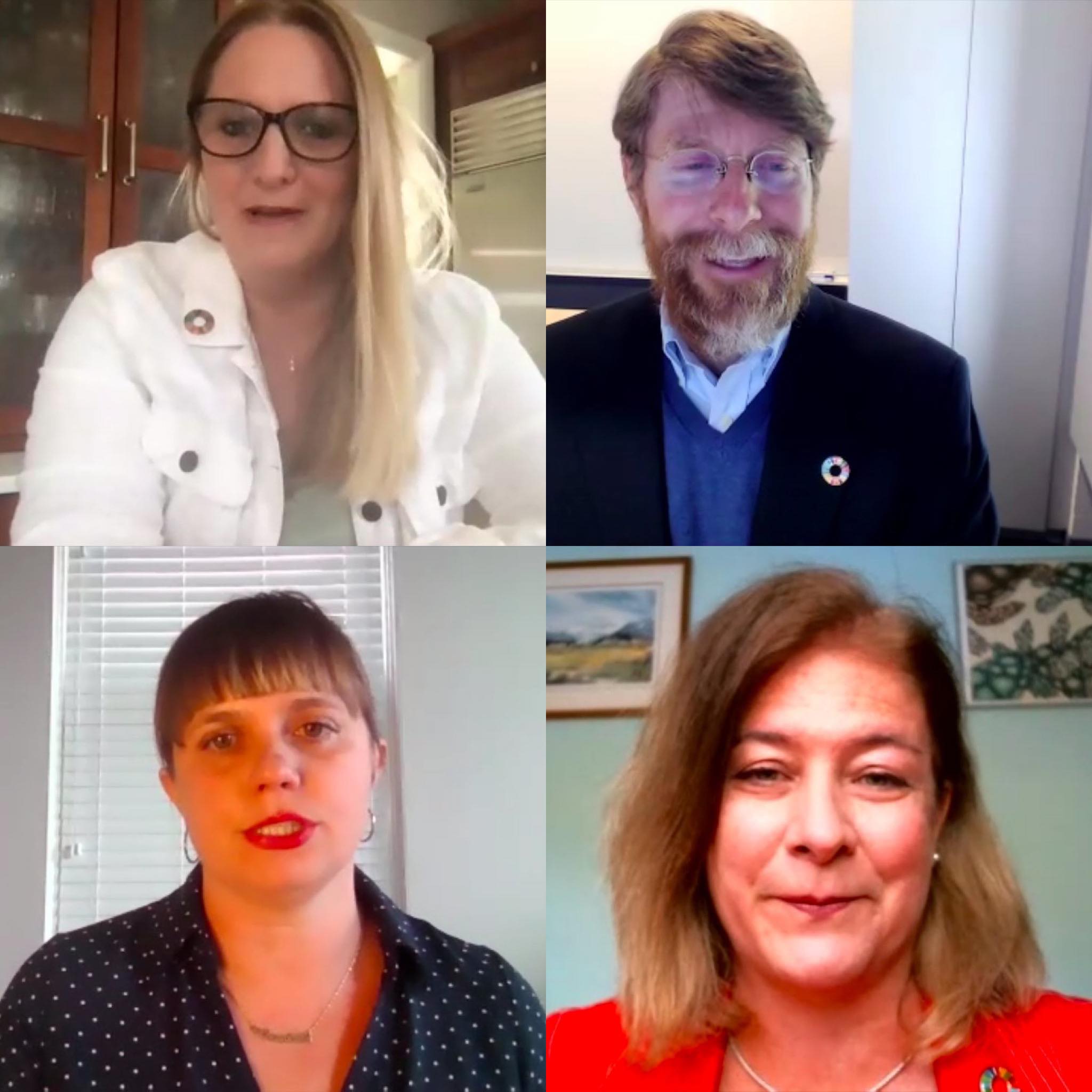
You’ve heard about the United Nations Sustainable Development Goals – the SDGs – but how can you make them actionable for your company or your city? What does it mean for an organization to work towards “affordable and clean energy?” Learn how Covestro, an international industry leader based in Pittsburgh, has leveraged the SDG framework to drive change and climate action, and how CMU is not only breaking new ground with the first Voluntary University Review but how we’ve been quietly and steadily increasing our procurement of sustainable, clean energy as part of our SDG commitment.
Panelists include:
- Rebecca Lucore, Head of Sustainability and Corporate Social Responsibility – Covestro
- Steven Guenther, Assistant Vice President for Facilities Management and Campus Services & University Engineer – Carnegie Mellon University
- Alex Hiniker, Executive Fellow for Sustainability Initiatives – Carnegie Mellon University
Grid at the Edge: Innovation in the Energy Sector| Mar. 4, 11AM EST
The U.S. has historically underinvested in energy infrastructure, and cities are beginning to recognize that they have a role to play in strategically aligning development goals and transportation objectives with infrastructure improvements. At the same time, the way people in cities use energy is changing, too. Utilities, in partnership with city planners and researchers, are in a position to make sweeping upgrades to infrastructure and processes in the next decade. That said, city planners, utilities, and universities will need to work together collaboratively, especially since the utility business model is, in some cases, a barrier. How can we make sure that innovation is happening in a collaborative manner? Most importantly, how can new technology and innovation meet the needs to benefit all?
Panelists include:
- Elizabeth Cook, General Manager, Advanced Grid Solutions – Duquesne Light Company
- Juan Castaneda, Principal Manager, Technology & Innovation – Southern California Edison
- Derek Dauphin, Senior Planner – City of Pittsburgh
- Panayiotis (Panos) Moutis (E, ‘16), Systems Scientist -- Carnegie Mellon University
- Anna Siefken, Executive Director, Wilton E. Scott Institute for Energy Innovation – Carnegie Mellon University (moderator)
Scaling Solar: Industry Insights toward Gaining Ground in 2021| Feb. 25, 11AM EST
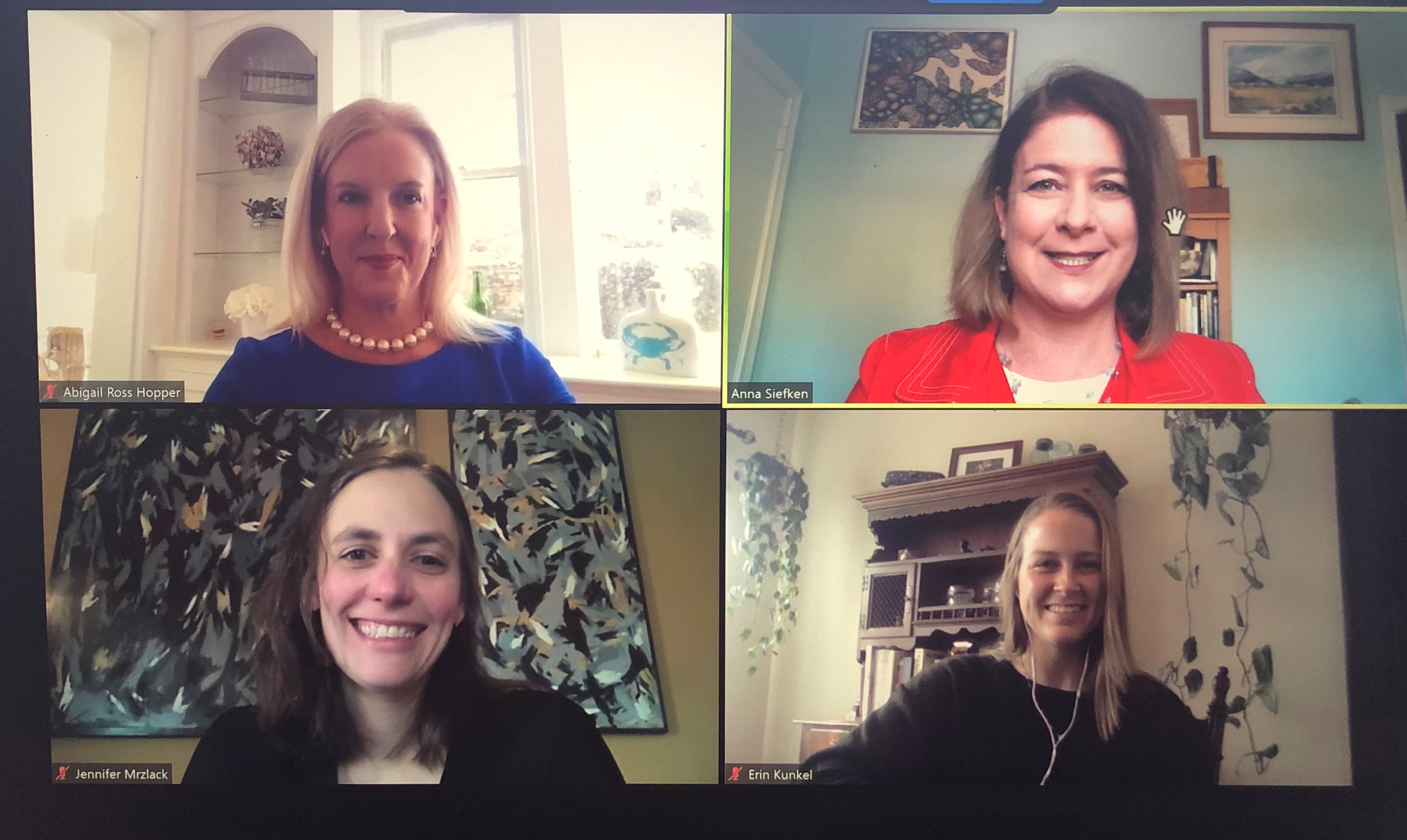
As we hear more from the new administration on their environmental sustainability plans, all sectors are taking a look inward at how they can better understand the new policies and take tactical steps forward. Whether building or purchasing renewable energy, what support system exists to examine supply chain, R&D and utility scale distribution or generation? Who can provide visibility on the incentives and challenges to technology and construction of renewables? We spoke to experts who are outlining these phases for companies, municipalities and educational institutions, and got their suggestions on how to reach your sustainability commitments in this decade.
Panelists include:
- Abby Hopper, President & CEO – Solar Energy Industries Association (SEIA)
- Erin Kunkel, Global Corporate Social Responsibility Manager – Cook Medical
- Jennifer Mrzlack, President – PSG Energy Group
- Anna Siefken, Executive Director, Wilton E. Scott Institute for Energy Innovation – Carnegie Mellon University (moderator)
Robotics & Manufacturing – The Future of Energy Efficiency, featuring DOE’s E-ROBOT Prize | Feb. 4, 11AM EST
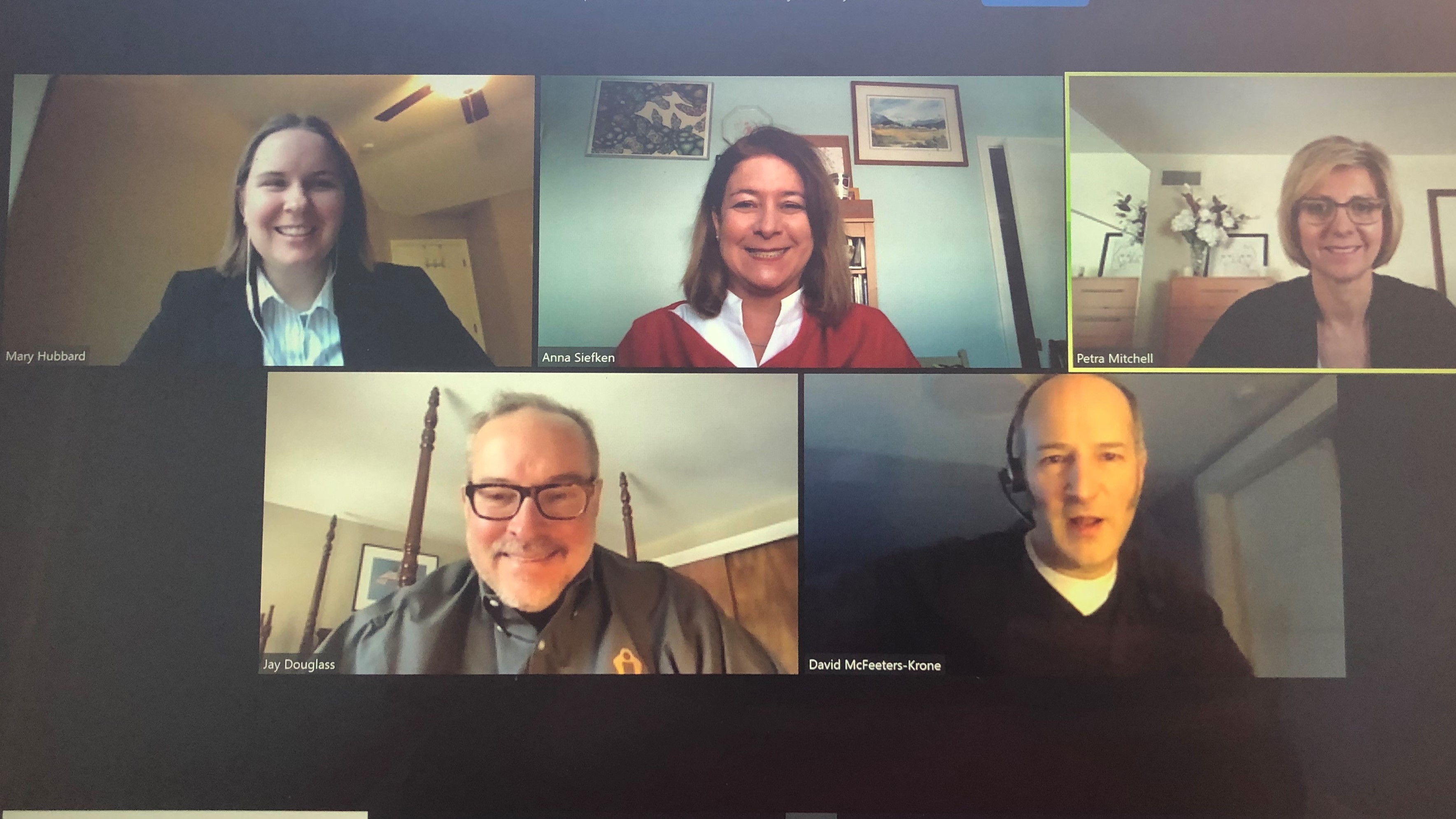
How can the future of energy efficiency in buildings be driven by cutting edge technology? How is innovation sparking the manufacturing industry in the United States to meet energy goals? DOE’s Building Technologies Office, the ARM (Advanced Robotics in Manufacturing) Institute, and Catalyst Connection discussed not only how robotics and manufacturing are impacting the built environment, but details about a recently-announced competition to accelerate innovation in this space – the E-ROBOT Prize.
This webinar was a partnership event between the Manufacturing Extension Partnership (MEP), David McFeeters-Krone at Intellectual Assets, and the Carnegie Mellon University’s Wilton E. Scott Institute for Energy Innovation.
Panelists included:
- Jay Douglass, Chief Operating Officer – Advanced Robotics in Manufacturing (ARM)
- Mary Hubbard, Technology-to-Market Manager, Office of Energy Efficiency and Renewable Energy – U.S. Department of Energy, Building Technologies Office
- Petra Mitchell, President & Chief Executive Officer – Catalyst Connection
- David McFeeters-Krone, Partnership Expert – Intellectual Assets (moderator)
- Anna Siefken, Executive Director, Wilton E. Scott Institute for Energy Innovation – Carnegie Mellon University (moderator)
City of Pittsburgh's 2020 - 2021 Energy Planning, featuring Mayor Bill Peduto |Dec. 10, 10AM EST
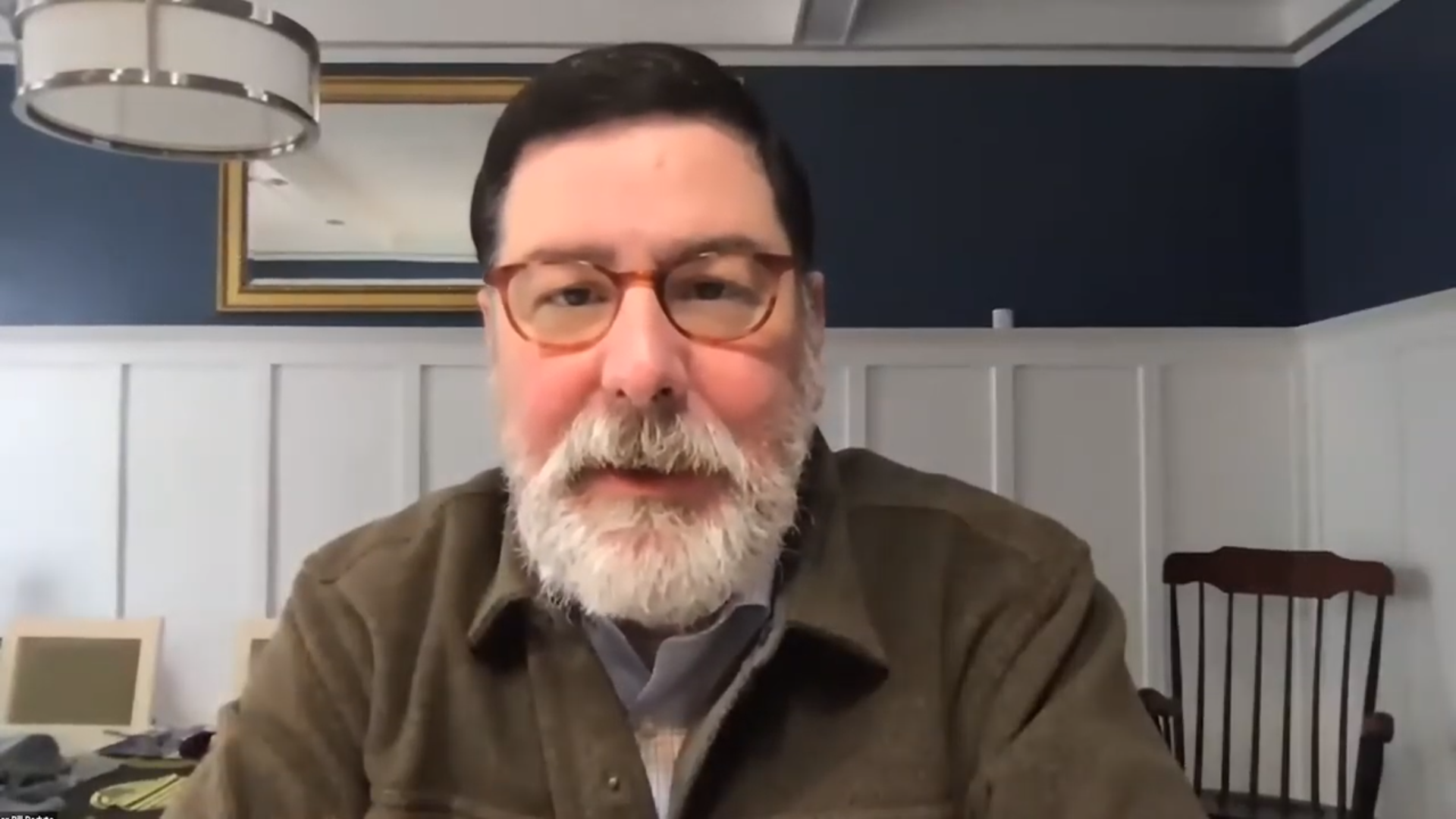
The Wilton E. Scott Institute for Energy Innovation showcased Mayor Bill Peduto and the City of Pittsburgh’s new and developing strategy for energy infrastructure and performance.
As a city of over 300,000 people at the center of a region of 2.5 million people, Pittsburgh has already begun to experience the effects of climate change with harsher winters, hotter summers, record setting precipitation, flooding, and increased numbers of invasive species. Coordinated, concentrated, and comprehensive carbon mitigation action is needed to reduce the severity of regional impacts and to prepare for a future with a low carbon economy.
To address these challenges, Pittsburgh, in partnership with local universities and utilities, has created a number of plans and initiatives, including a comprehensive Energy Strategy, a Climate Action Plan, and an Energy Master Plan for Publicly-Owned Facilities – all of which aim to moderate the climate crisis through reducing pollution and carbon emissions. These efforts will collectively kick start the green transition and create new green job possibilities in Pittsburgh and the southwestern Pennsylvania region.
The City of Pittsburgh and CMU's Scott Institute for Energy Innovation with other local university and utility partners hosted three panels to highlight energy efforts from 2020 and opportunities for 2021 and beyond.
Speakers included:
- Mayor Bill Peduto – City of Pittsburgh
- Scott Bernotas, Associate Vice Chancellor, Facilities Management – University of Pittsburgh
- Elizabeth Cook, Senior Manager, System Planning (Transmission and Distribution) – Duquesne Light Company
- Derek Dauphin, Senior Planner – City of Pittsburgh
- Rod Dobish, Associate Vice President and Chief Facilities Officer – Duquesne University
- Steve Guenther, Assistant Vice President for Facilities Management and Campus Services & University Engineer – Carnegie Mellon University
- Jim Lodge, Vice President, Strategy and Business Development – Clearway Energy
- Flore Marion, Energy Advisor – City of Pittsburgh
- Sarah Yeager, Climate and Energy Planner, Office of Sustainability – City of Pittsburgh
- Tony Young, Vice President, Facilities, Planning, and Operations – Carnegie Museums of Pittsburgh
Panels were moderated by Kathrine Monsted of the Danish District Energy Advisory, City of Pittsburgh Chief Resilience Officer, Grant Ervin and CMU Scott Institute for Energy Innovation Executive Director Anna. J. Siefken.
A Distinguished Lecture by U.S. Department of Energy Assistant Secretary of Nuclear Energy, Rita Baranwal|Dec. 3, 11AM EST
Dr. Baranwal addressed the promise of advanced nuclear reactors and highlight the opportunities they hold for the future of the electric grid, including the (1) range of issues facing the existing fleet of domestic nuclear power plants; (2) barriers and opportunities for the deployment and construction of advanced reactors, including small modular reactor designs enabled by the DOE’s Advanced Reactor Demonstration Program; (3) challenges and opportunities in the critical fuel cycle infrastructure; and (4) challenges and opportunities for global competitiveness of U.S. nuclear technology.
Technology, Sustainability and Business Forum|Nov. 20, 12P EST
The second annual Technology, Sustainability, and Business Forum hosted by the Tepper School of Business took place virtually via Zoom, in partnership with the Wilton E. Scott Institute for Energy Innovation. This year's forum featured one, 90-minute panel session with leading executives in industries including economics, manufacturing, and finance.
Speakers included:
- Martina Cheung, President – S&P Global Market Intelligence
- David Evans, Senior Economist, National Center for Environmental Economics – U.S. Environmental Protection Agency
- Galina Hale, Professor; Research Advisor – University of California Santa Cruz; Federal Reserve Bank of San Francisco (on leave), Research Fellow, CEPR
- John Hartner, CEO – ExOne
- William F. Oplinger, Executive Vice President and Chief Financial Officer – Alcoa
Electrification and EVs in Mobility and Transit|Nov. 17, 11A EST
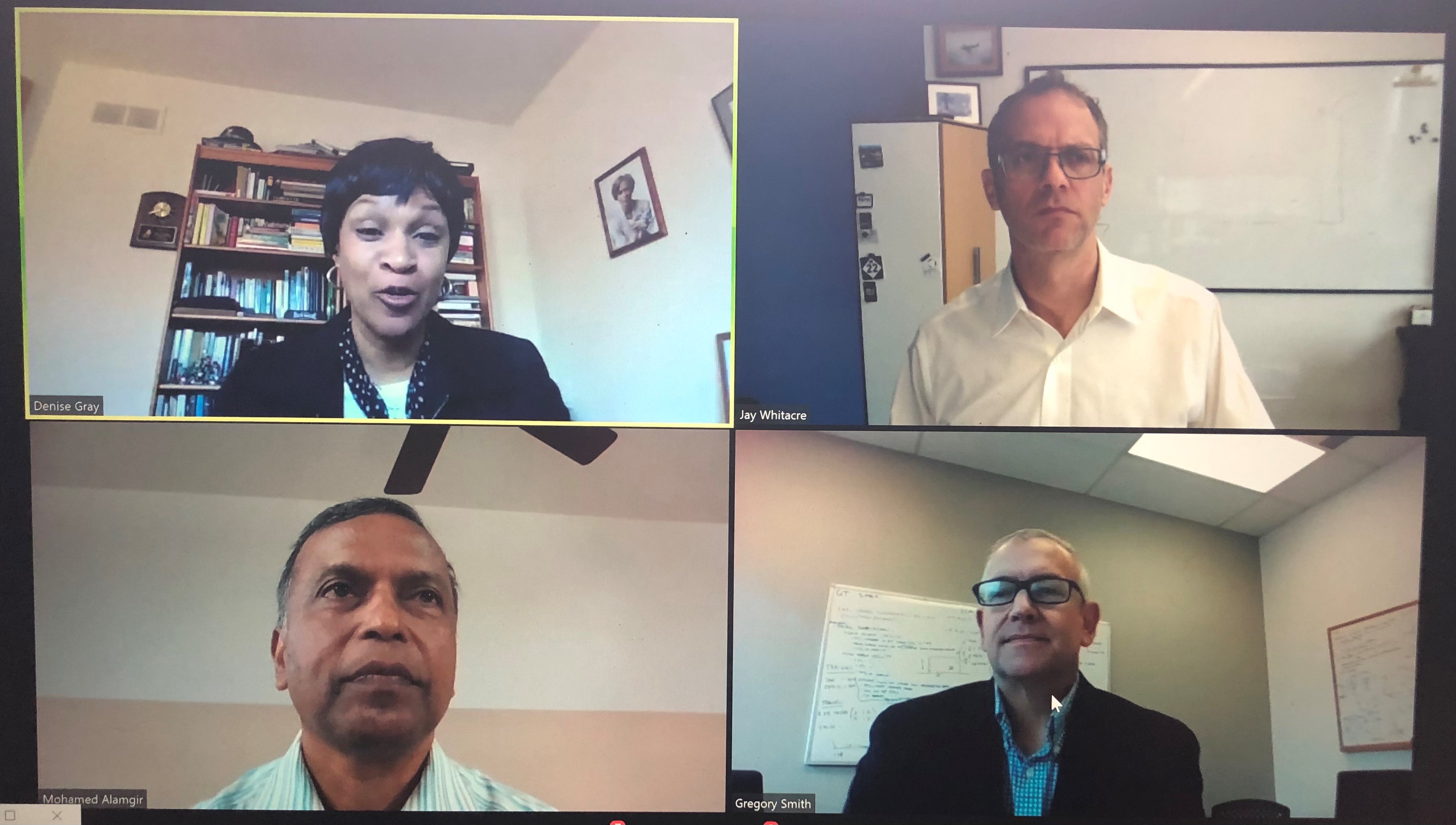
Curious about the status of battery tech and when EV adoption will reach its tipping point? Denise Gray, President of LG Chem Michigan Inc. Tech Center, led battery development for the first-generation Chevy Volt, GM’s first mass-market plug-in hybrid, and she’s now responsible for strategic direction, engineering, and business development. In this Distinguished Lecture, we explored electrification and all-electric, autonomous driving – where it will lead us, and what is possible. Hear about the pull from the market for battery electric vehicles, the engineering challenges to EV expansion, and budding battery technologies supporting these innovations. Gray was joined by her esteemed colleagues Mohamed Alamgir, Hybrid Research Director and Gregory Smith, Systems Manager.
Driving Solar in Pennsylvania - Looking forward to 2021|Nov. 12, 11A EST
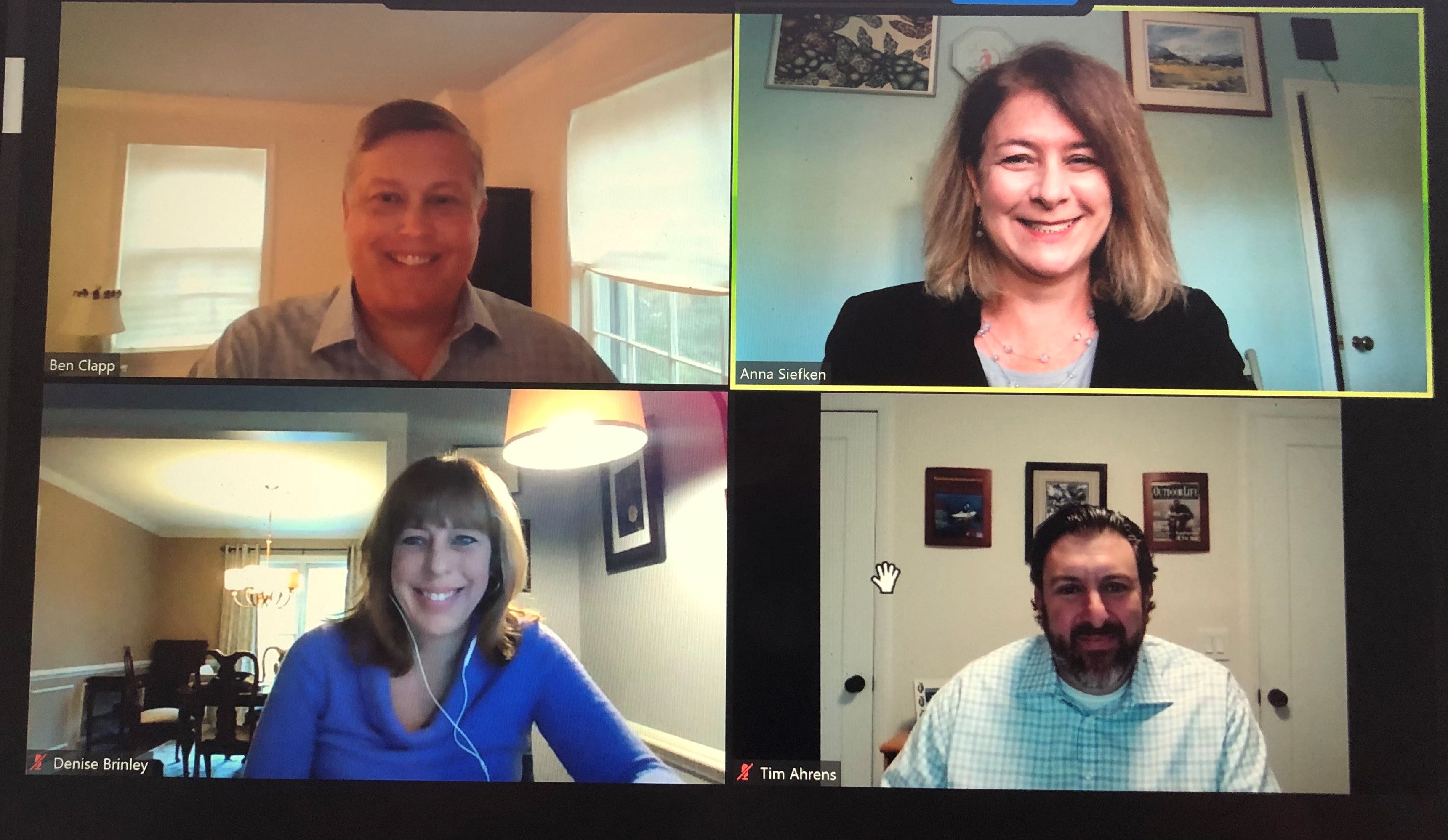
Pennsylvania is ready for solar deployment at multiple scales – utility, commercial, community, residential. But there are barriers to our collective success. Why hasn’t widespread deployment rolled out in the way that it has in neighboring states? How have policies, both at the state and federal level, impacted this implementation? What can we learn from other parts of the country? With insights from industry, government, and regulatory experts, including the Executive Director of the PA Office of Energy, the panel will address interest, the surge of projects in the PJM queue, state incentives for solar, and how regulations can unlock potential and facilitate growth.
Panelists include:
Good Energy Collective: Rethinking Nuclear Policy from the Ground Up|Oct. 29, 11A EDT

As the climate movement works toward decarbonization, where does nuclear enegy stand? Listen to Dr. Jessica Lovering discuss the work of Good Energy Collective –a progressive organization dedicated to developing new policy and creating a bridge to the social science impacts of nuclear. Join us to hear her predictions on nuclear energy policy through the 2020 U.S. presidential election and recovery phases of COVID-19.
Distinguished Lecture by Westinghouse President & CEO Patrick Fragman| Oct. 20, 1P EDT
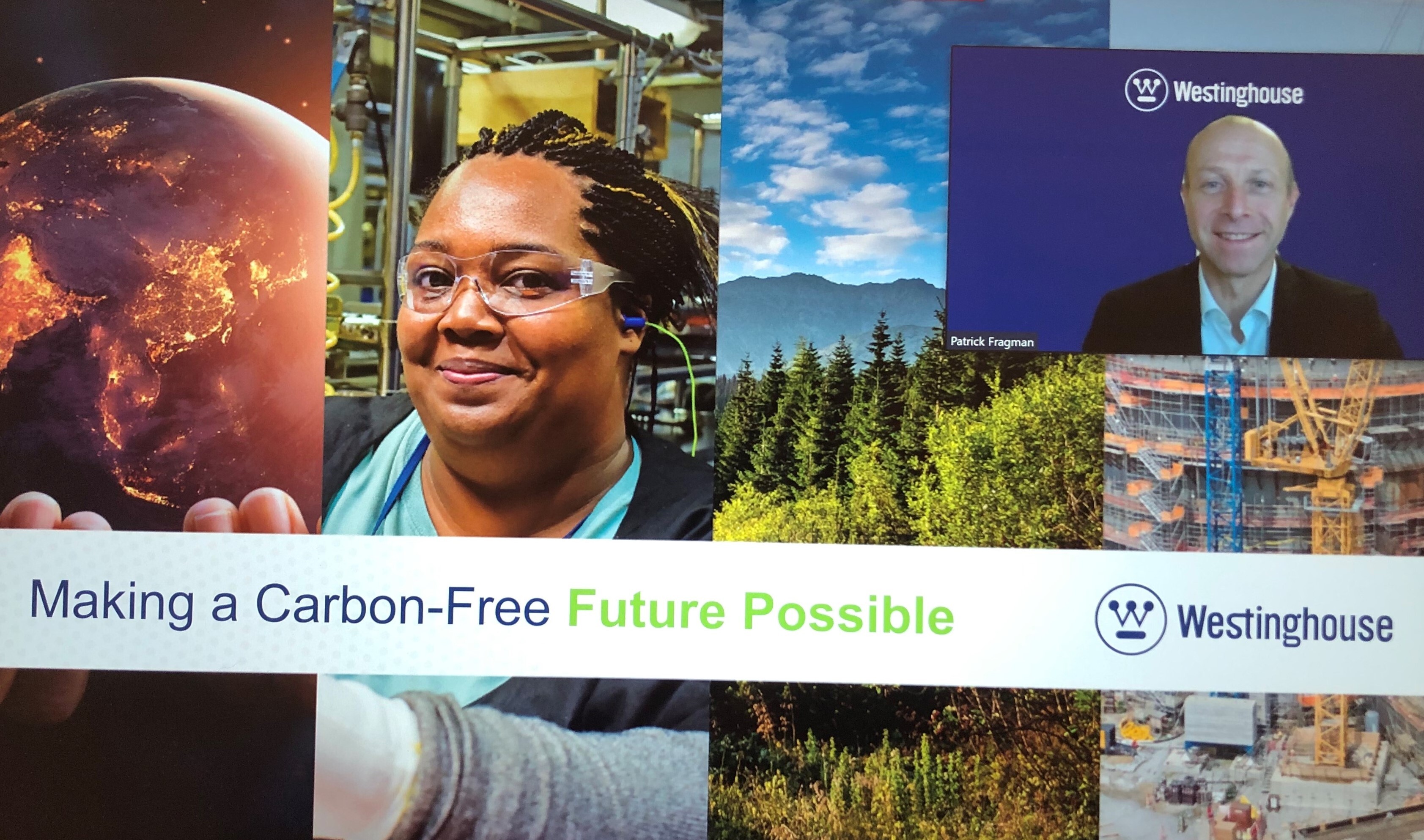
Patrick Fragman, became the Westinghouse Electric Company President and Chief Executive Officer in August 2019. Fragman brings nearly 30 years of global power and energy services experience to Westinghouse. Prior to being named to Westinghouse’s highest leadership role, Fragman led transformation efforts at ABB, a global leader in digital industries in the area of electrification, industrial automation, motion, robotics and discrete automation, and power grids.
Distinguished Lecture by ICF SVP Anne Choate| Oct. 1, 12P EDT
Anne Choate leads ICF’s Energy, Environment and Infrastructure operating group. Her team of more than 1,750 professionals advises commercial, federal, state, and local clients on energy markets, surface transportation, energy efficiency, environmental planning, conservation, and climate change. Anne brings 25 years of experience and expertise working at the intersection of clean energy, climate change, energy and transportation. She has built and utilized state-of-the-art models to track life-cycle emissions, model carbon in soils, and conduct indicator-based risk assessments. She has supported decarbonization planning and carbon target-setting activities at the federal level and in nearly all 50 states; led resiliency efforts for multiple cities and investor-owned utilities; and has advised dozens of national parks, national estuary programs, transit agencies, and state Departments of Transportation.
watch the video
Energy Supply Chain Disruption and Impacts: Perspectives on How Businesses Build and Sustain Value| Sept. 17, 11A EDT
The global pandemic has put many supply chain pressures on the solar industry. As the sector considers new ways to manage supply chain challenges through 2020, will renewable energy companies continue to drive successful value and efficiency? What are best strategies to prepare for equity investing and how can energy leaders determine their companies’ valuations as we move into the next phases of COVID-19? Join us to hear market experts on ways to build value for investors through technology and operational execution. Panelists include:
- Suvi Sharma, Chief Executive Officer – Solaria
- Josh Beck, Managing Director and Chief Investment Officer – BCI Technology Investments
- Matt Harper, Chief Commercial Officer – Invinity Energy Systems
- Sunny Yang, Trans-Pacific Business Lawyer – Porter Wright Morris & Arthur
The discussion was moderated by CMU Scott Institute for Energy Innovation Executive Director Anna. J. Siefken.
watch the video
Energy & Equity – Developing a Clean Energy Workforce for the Future, Aug. 20, 11A EDT
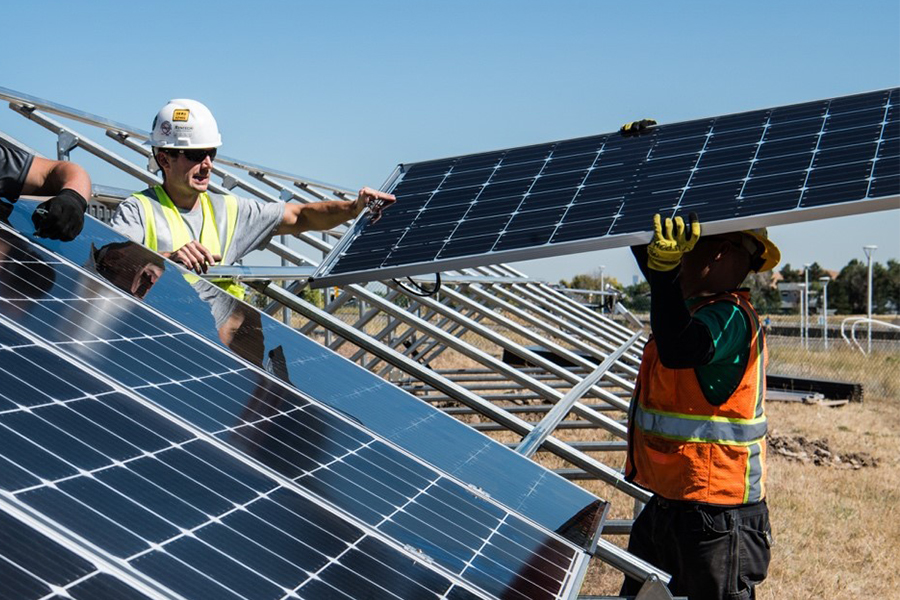
As falling energy prices and the continuously evolving nature of COVID-19 have dramatically impacted employment security across the country, Pittsburgh, like many regions, is actively engaging in efforts to envision the future of work. As the energy industry sectors brace for recovery phases, how can communities of color have greater representation? What strategies are other regions using to make a dramatic impact?
The Scott Institute spoke with leaders from various organizations including manufacturing, solar development and nonprofits to hear best practices on how to elevate energy job employment both immediately and into the future. Panelists included:
- Mark Anthony Thomas, President - Pittsburgh Regional Alliance
- Earl Buford, Chief Executive Officer - Partner4Work
- Sara Oliver-Carter, Chief Diversity Officer - Duquesne Light Company
- Robin Wang (Engineering '88), Principal; Committee Member - Vibrant Future; Portland Clean Energy Fund
This was the ninth installment in the “Energy, Resilience, and COVID-19 – Pivoting in 2020" webinar series, which highlights insights from research, industry and innovation related to how COVID-19 is impacting the way we will do business, and what it means to the energy systems we rely upon.
Reimagining Transportation Energy in 2020 for Equity and Resilience, Aug. 6, 11A EDT
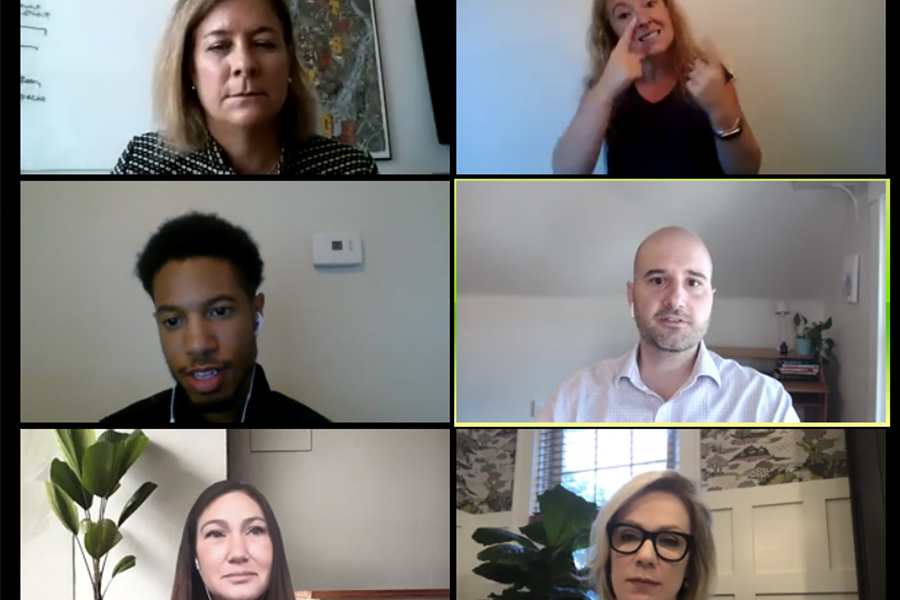
Transportation is an essential need in our society–continuously moving people to and from their homes, jobs and activities. However, its infrastructure and energy needs have contributed to various access, equity and environmental impacts for communities of color. With an immediate decline in transportation energy use at the onset of COVID-19, what shifts can we expect to secure equitable mobility as we plan for reopening?
We hosted a conversation with leading transportation, access, mobility and energy experts on our transportation energy future and what strategies leading agencies and decision-makers should consider when weighing important issues at hand. Featured speakers included:
- Katharine Eagan Kelleman, CEO – Port Authority of Allegheny County
- Regina Clewlow, CEO & Co-Founder – Populus
- Constantine Samaras, Energy Fellow, CMU Scott Institute for Energy Innovation; Associate Professor, Department of Civil and Environmental Engineering – CMU
- Corey Harper, Presidential Postdoctoral Fellow; Assistant Professor, Department of Civil and Environmental Engineering and Heinz College of Information Systems and Public Policy – CMU
The discussion was moderated by CMU Scott Institute Executive Director Anna. J. Siefken.
Balancing Investment in Innovation & Commercialization – How Corporates, NGOs and Founders Can Address Change, July 23, 11 AM EDT
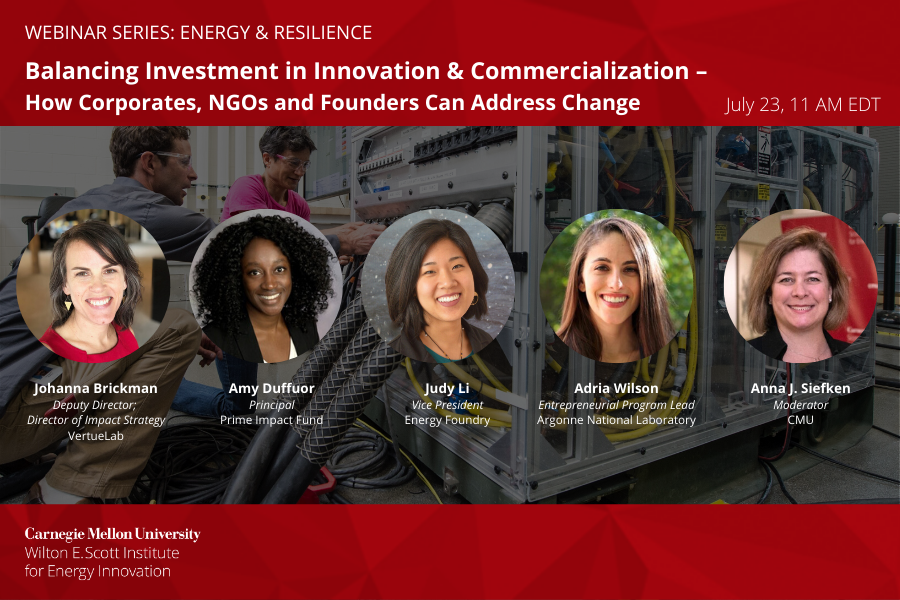
As we tackle the complexities of major social disruptions, how are innovators still driving impact as they rescale and accommodate to a changing society? In this webinar, we discussed best practices to adjust contingency planning amidst disruption and the effects of intersectionality on cleantech investing. The following experts served on the panel:
- Johanna Brickman, Deputy Director; Director, Impact Strategy - VertueLab
- Amy Duffuor, Principal – Prime Impact Fund
- Judy Li, Vice President - Energy Foundry
- Adria Wilson, Entrepreneurial Program Lead, Chain Reaction Innovations – Argonne National Laboratory
The discussion was moderated by CMU Scott Institute for Energy Innovation Executive Director Anna. J. Siefken.
This was the seventh installment in the “Energy, Resilience, and COVID-19 – Pivoting in 2020" webinar series, which highlights insights from research, industry and innovation related to how COVID-19 is impacting the way we will do business, and what it means to the energy systems we rely upon.
Tackling Energy Poverty – Domestic and International Strategies, Challenges and Insights, July 9, 11 AM EDT
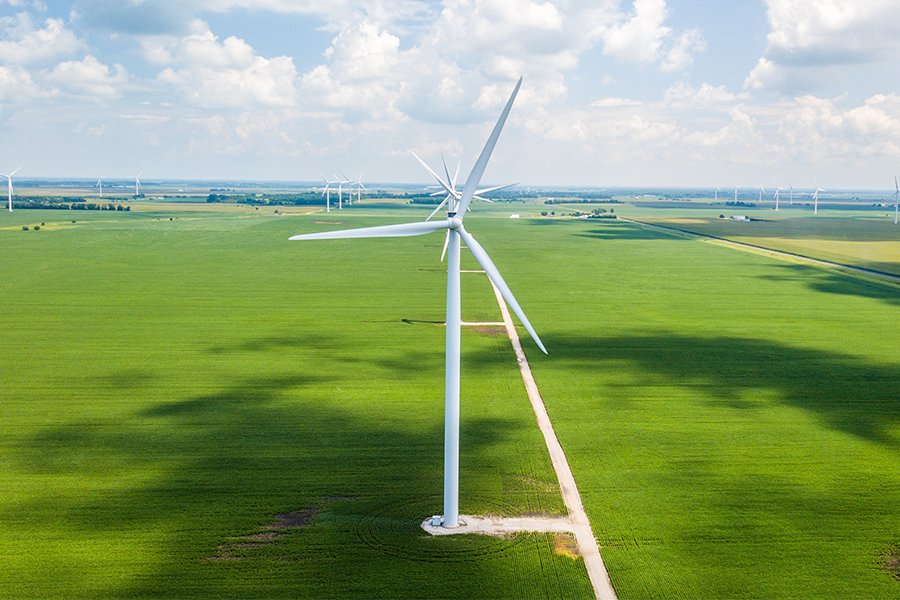
In today's uncertain economic and social climates, working through energy production and consumption strategies that advocate for everyone can be challenging. We explored how regions with significant energy burdens are surviving COVID-19 and other disruptions, and how they are rethinking community engagement, innovation and policy to build a sustainable future. The following speakers engaged in a lively discussion:
- Paulina Jaramillo*, Professor, Engineering and Public Policy; Co-Director, Green Design Institute - Carnegie Mellon University
- Destenie Nock*, Assistant Professor, Engineering and Public Policy; Adjunct Professor, Civil and Environmental Engineering - Carnegie Mellon University
- Tony Reames, Assistant Professor, School for Environment and Sustainability - University of Michigan
- Anna J. Siefken, Executive Director, Scott Institute for Energy Innovation – Carnegie Mellon (moderator)
*Scott Institute Energy Fellow
This was the sixth installment in the “Energy, Resilience, and COVID-19 – Pivoting in 2020" webinar series, which highlights insights from research, industry and innovation related to how COVID-19 is impacting the way we will do business, and what it means to the energy systems we rely upon.
Energy, Resilience, and COVID-19 – Pivoting in 2020
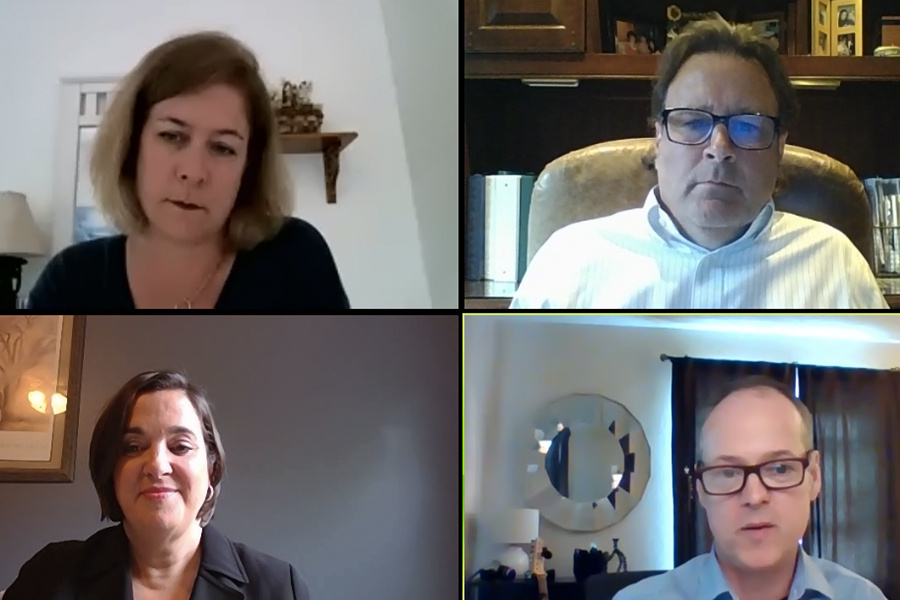
Webinar #5 - Utility Planning | Jun 18, 11 AM EDT
With leadership from the region’s top utilities, we delved into how each of their relief strategies are aiding Pittsburgh consumers and discussed operational readjustment plans for 2020. Featured speakers included:
- Krysia Kubiak, Director, State Regulatory Strategy and Government Affairs - Duquesne Light Company
- Jeffrey Nehr, Vice President, Business Development - Peoples Natural Gas
- James Stitt, Manager, Sustainability - Pittsburgh Water and Sewer Authority
This discussion was moderated by CMU Scott Institute for Energy Innovation Executive Director Anna. J. Siefken.
From Idea to Invention to Intellectual Property
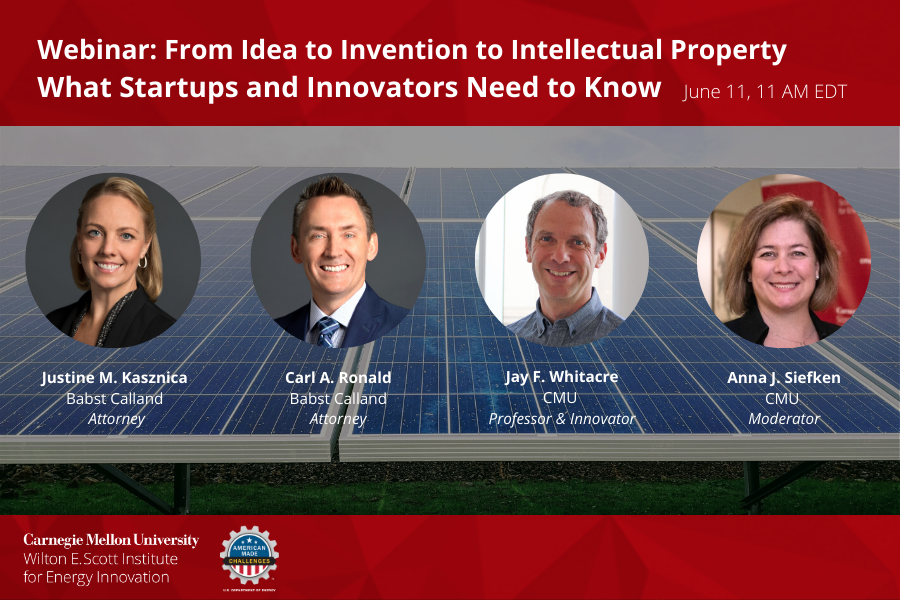
Webinar: What Startups and Innovators Need to Know | Jun 11, 11 AM EDT
Understanding the Intellectual Property (IP) and Patent processes when building a startup can be uniquely challenging for inventors. As a Power Connector with the Department of Energy’s American-Made Solar Prize, the Scott Institute highlighted this important topic for startups, student teams, and researchers. Legal experts with national law firm Babst Calland (a newly-named Connector, shared best practices from filing and managing costs to protecting IP.
The Scott Institute’s Jay Whitacre (a seasoned entrepreneur) and Anna J. Siefken joined experts from Babst Calland for an informative discussion:
- Justine Kasznica, Shareholder; Chair, Emerging Technologies - Babst Calland
- Carl Ronald, Shareholder, Emerging Technologies and Corporate and Commercial Groups - Babst Calland
Energy, Resilience, and COVID-19 – Pivoting in 2020
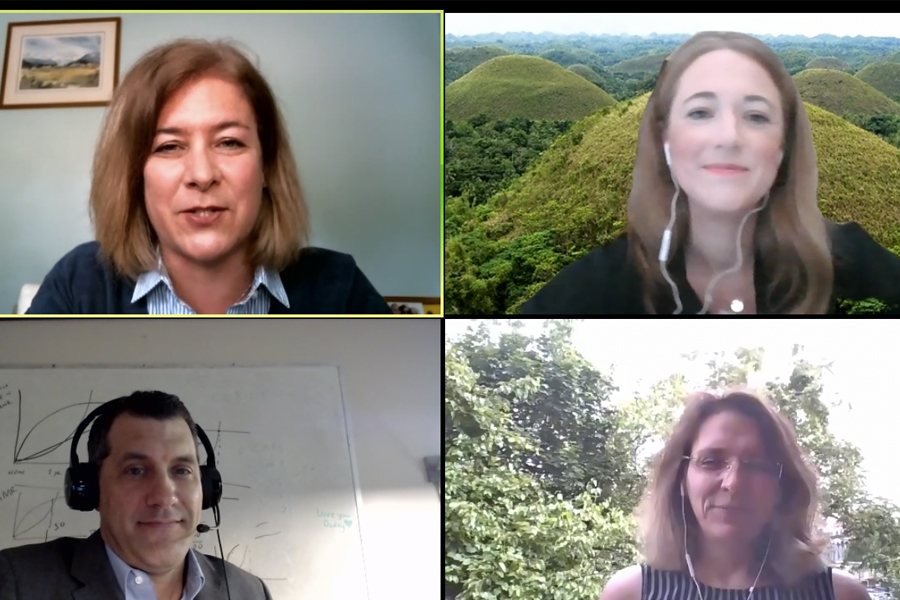
Webinar #4 - Infrastructure Planning - A Resistance v. Resilience Framework | Jun 4, 11 AM EDT
As we begin to plan for the recovery phases of COVID-19, how will innovation play a role in the restoration of our economy and the adaptation of a zero-carbon future? In our fourth installation of the "Energy, Resilience and COVID-19" webinar series, we examined how social, environmental and technical resiliency frameworks can better prepare our energy systems. The following panelists shared their insights on the next wave of innovation:
- Katrina Kelly-Pitou, Economics & Energy Systems Strategist - SmithGroup
- Nicholas Muller, Associate Professor of Economics, Engineering, and Public Policy; Lester and Judith Lave Development Chair in Economics, Engineering, and Public Policy - Carnegie Mellon University
- Karina Ricks, Director, Department of Mobility and Infrastructure - City of Pittsburgh
This discussion was moderated by CMU Scott Institute for Energy Innovation Executive Director Anna. J. Siefken.
Energy, Resilience, and COVID-19 – Pivoting in 2020
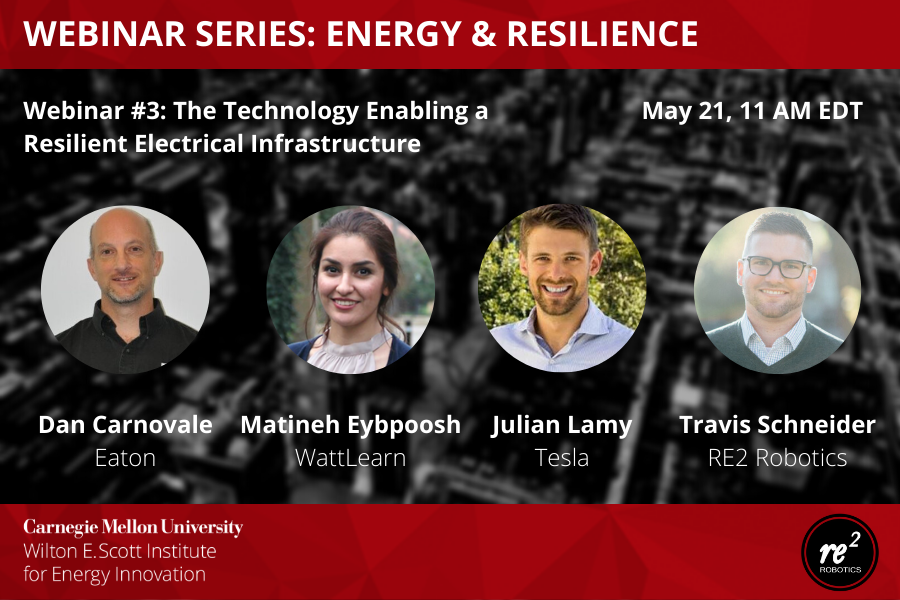
Webinar #3 - Discussing Technologies that Enable Resilient Electrical Infrastructure | May 21, 11 AM EDT
The residual impacts of COVID-19 will affect everyday life in unimaginable ways. As we consider improvements to the energy systems we have in place, how can we translate current grid planning strategies to emergency technologies in the wake of future pandemics? In this webinar, leading experts explored what COVID-19 has exposed about our national electrical infrastructure and shared predictions for future maintenance and alternate sources for reliance. The discussion featured:
- Dan Carnovale, Power Systems Experience Center Manager – Eaton
- Matineh Eybpoosh, CEO & Co-Founder – WattLearn (Engineering '15)
- Julian Lamy, Senior Optimization Software Engineer – Tesla (Engineering '16)
- Travis Schneider, Business Development Manager – RE2 Robotics, a Carnegie Mellon University spinoff
Energy, Resilience, and COVID-19 – Pivoting in 2020
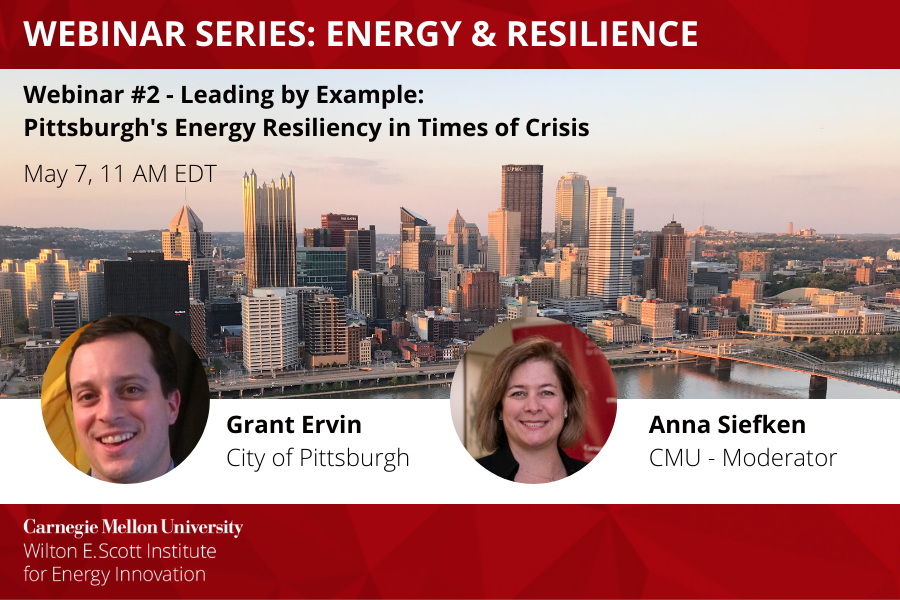
Webinar #2 - Leading by Example: Pittsburgh’s Energy Resiliency in Times of Crisis | May 7, 11 AM EDT
Before COVID-19, the City of Pittsburgh began developing solutions to combat resiliency challenges plaguing Pittsburgh communities. In 2014, the City joined the Rockefeller Foundation's 100 Resilient Cities Network. Since then, Pittsburgh has proven to be a trailblazer in innovation, technology and energy in times of crisis. During this fireside chat, City of Pittsburgh Chief Resilience Officer Grant Ervin discussed how resiliency planning has contributed to emergency strategies today.
Battery Modeling Webinar Series Presented by Energy Fellow Venkat Viswanathan
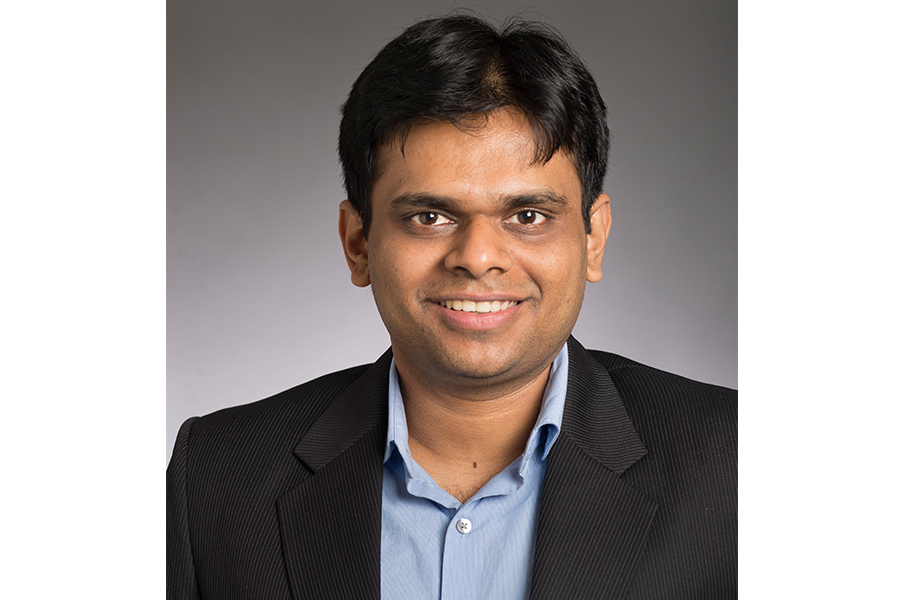
Bayesian Hilbert Transform (BHT) Method for Assessing Electrochemical Impedance Data | April 28, 11 AM EDT
PhD student Jiapeng Liu from The Hong Kong University of Science and Technology will led this session. View his research paper.
This event was part of the new Battery Modeling Webinar Series hosted by Scott Institute Energy Fellow Venkat Viswanathan. The webinar series brings together talks centered around modeling batteries, both physics-based and data-driven.
New Webinar Series: Energy, Resilience, and COVID-19 – Pivoting in 2020
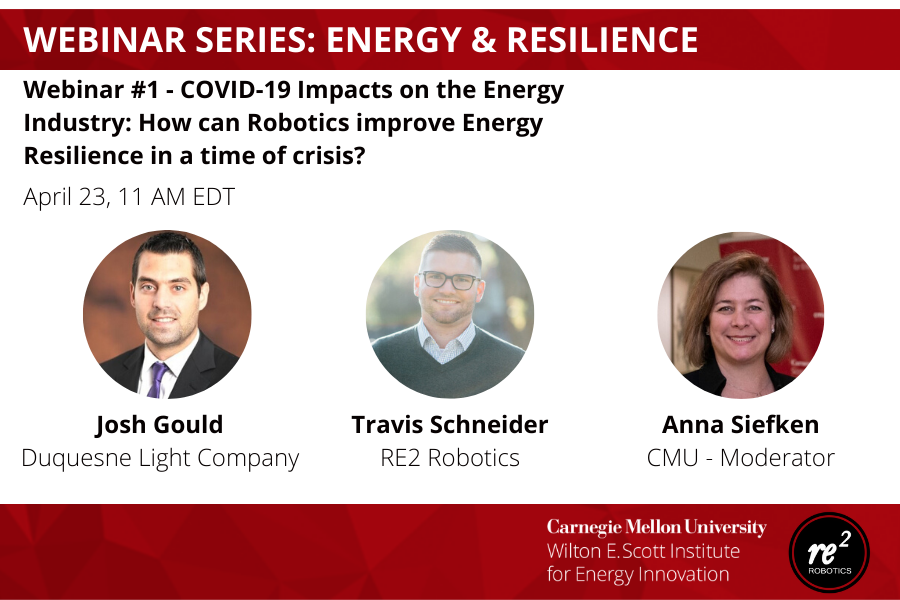
Webinar #1: Robotics and Energy - How can Robotics improve Energy Resilience in a time of crisis? | April 23, 11 AM EDT
COVID-19 has sharply highlighted the importance of safe and reliable energy systems to keep essential businesses and hospitals operational in times of need. Robotic technology may be key to improving energy resilience in the face of crisis. We explored this topic in a discussion with two thought leaders in energy and robotics. This Fireside Chat featured Duquesne Light Company Director of Innovation Josh Gould and RE2 Robotics Business Development Manager Travis Schneider.
Mathematical Programming Models for the Optimal Development of Shale Gas and Oil Resources in Argentina, March 3, 12p
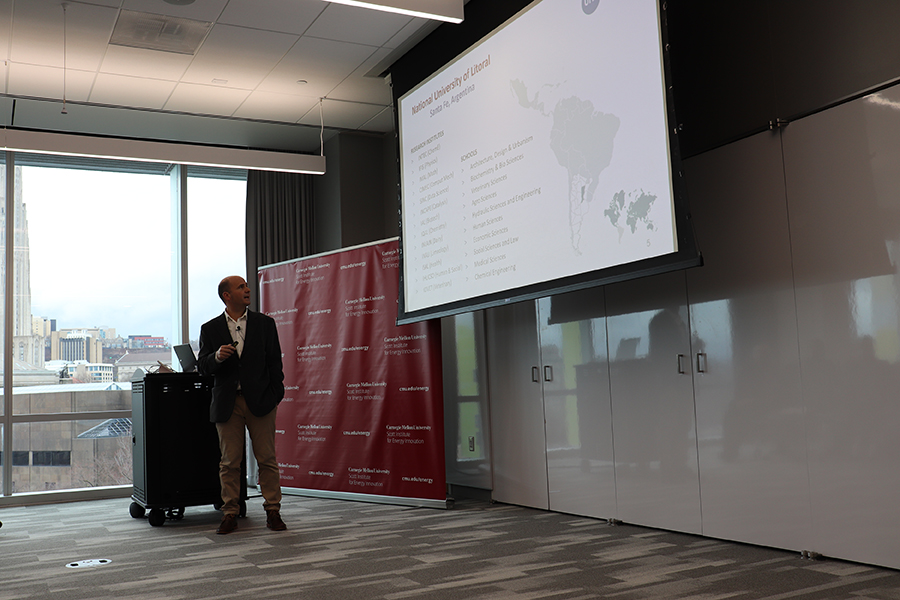
Diego Cafaro, Scott Institute Visiting Senior Fellow and Associate Professor at the Chemical Engineering School of the National University of Littoral (UNL), Argentina, gave a tech talk on the role of optimization concepts and tools within the development of shale oil and gas resources.
A Distinguished Lecture by Duquesne Light Company President Steven Malnight | Feb. 25, 12p
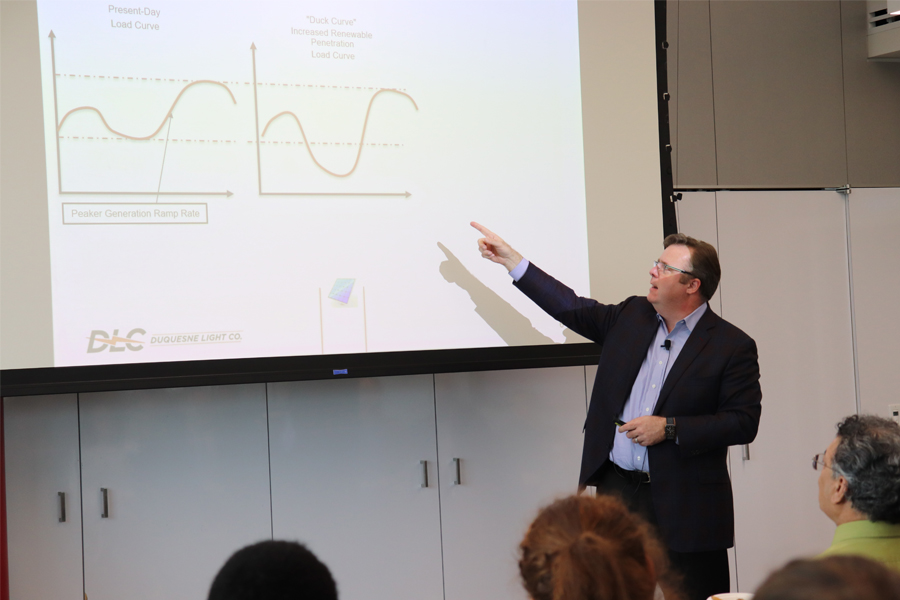
Duquesne Light Company President and Chief Executive Officer Steven Malnight kicked off the Scott Institute for Energy Innovation's 2020 Distinguished Lecture Series with an exciting presentation titled "Future Vision of the Innovative Electric Power Grid."
Solid-State Batteries: A Tech Talk by University of Michigan's Jeff Sakamoto, Feb. 5
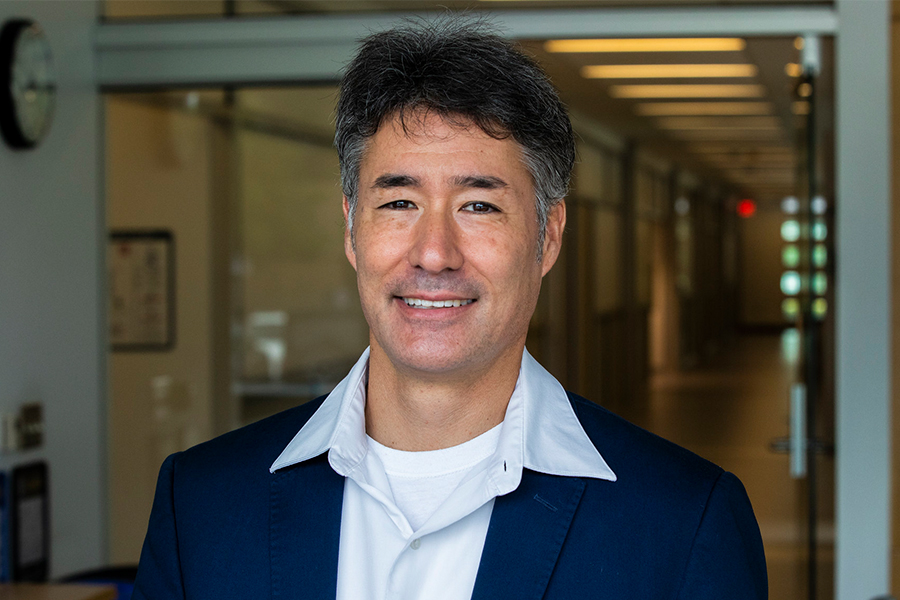
We hosted Jeff Sakamoto, professor of Mechanical Engineering, Materials Science and Macromolecular Science and Engineering at the University of Michigan, for a tech talk on solid-state batteries. Sakamoto also serves as the solid-state battery lead at the University of Michigan Energy Institute.
Financing Energy Efficiency in Buildings - How to Leverage the new Guaranteed Energy Savings Act, Jan. 29
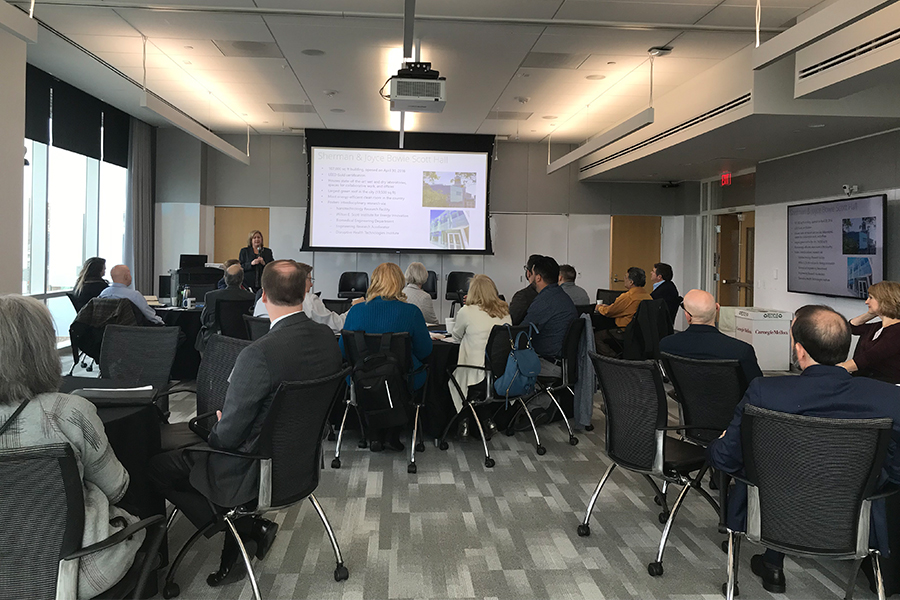
Hosted by the City of Pittsburgh and CMU's Scott Institute for Energy Innovation, this invite-only meeting explored how you can use the Guaranteed Energy Saving Act (GESA) to finance building energy efficiency. Attendees learned how to set up the right project scope to maximize success, the financing options available to MUSH organizations and best practices to incorporate a GESA contract within an existing organization’s legal framework.
Center for Responsible Shale Development Summit: The Role of Natural Gas in a Decarbonized Energy System, Jan. 15
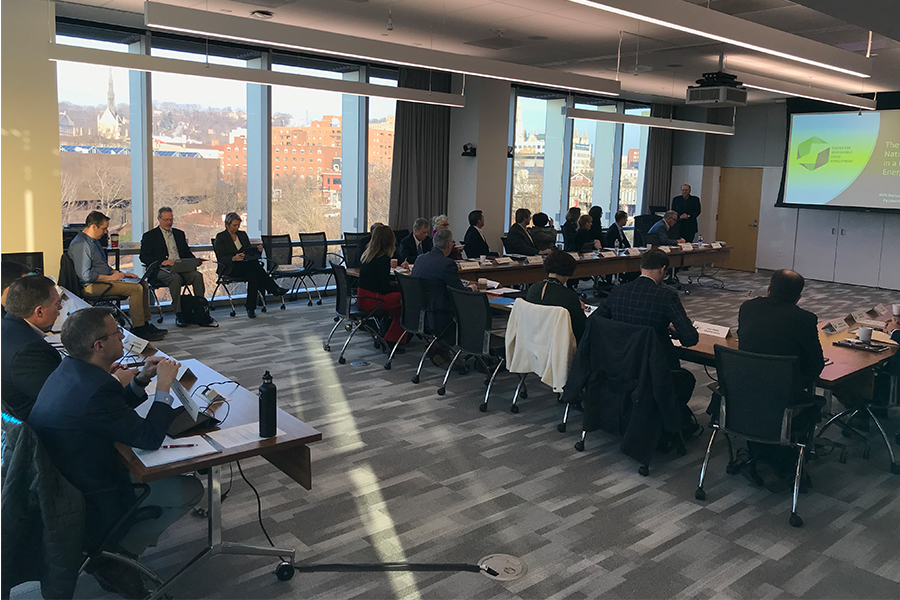
Over 35 participants represented organizations from industry; local, state and national government agencies; foundations; universities and nonprofits.
Optimization for Smart Mobility Systems: From Formula 1 Racing to Urban Mobility, Jan. 24
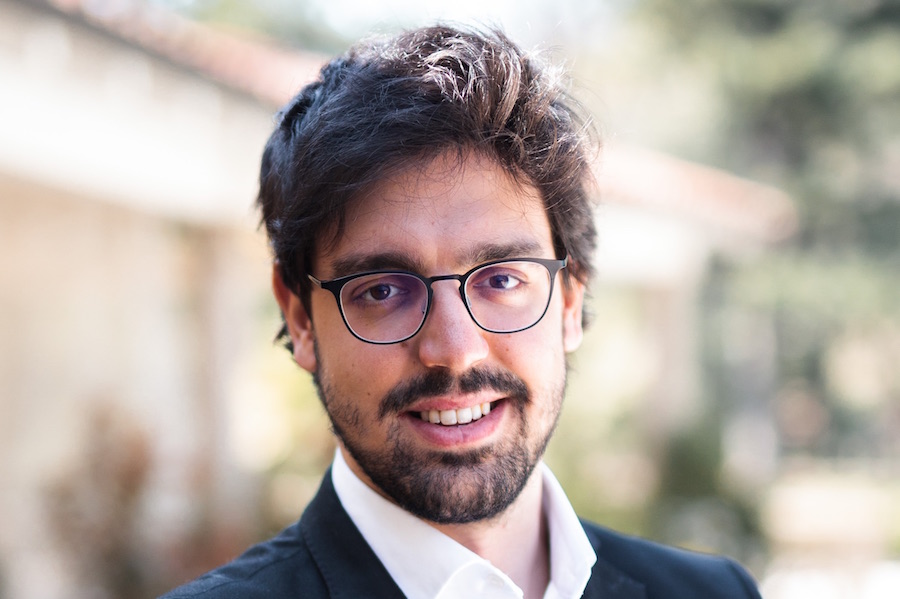
In this seminar, Mauro Salazar, postdoctoral scholar at the Autonomous Systems Lab in the Department of Aeronautics and Astronautics at Stanford University, discussed his work on the application of optimization methods towards mobility solutions.
2019 Events
Technology, Sustainability, and Business Forum, Nov. 20, 9:30a-5p
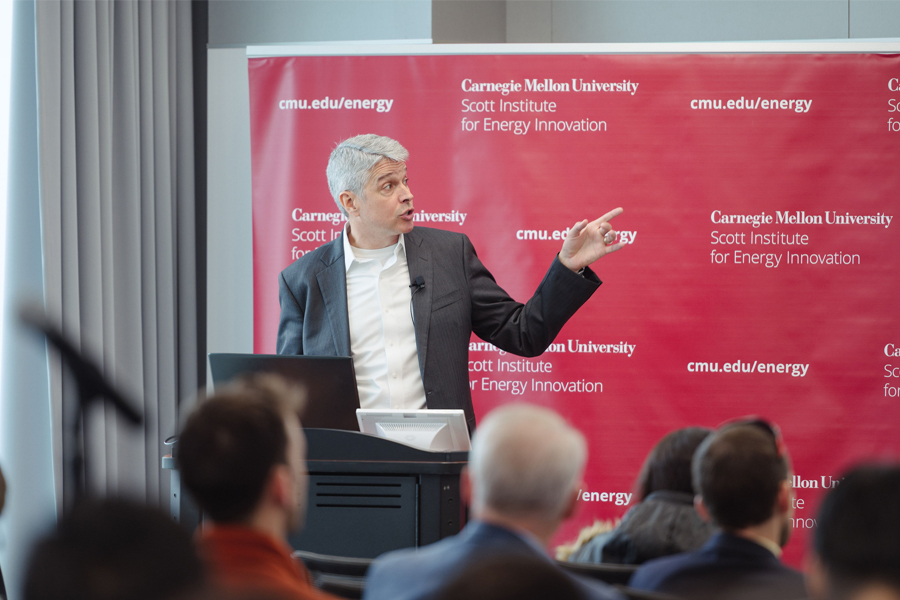
This conference brought together leaders from across the private sector, multiple levels of government, and acadamia to discuss topics related to the broad theme of sustainability. The Scott Institute was proud to co-sponsor the Distinguished Lecture by Bloom Energy's Mark Mesler (Tepper 2001) and the Keynote Lecture by Siemens' Linda Rega.
Rethinking Power System Architecture for Serving Exurban Residential Paradigms, Nov. 14, 12p
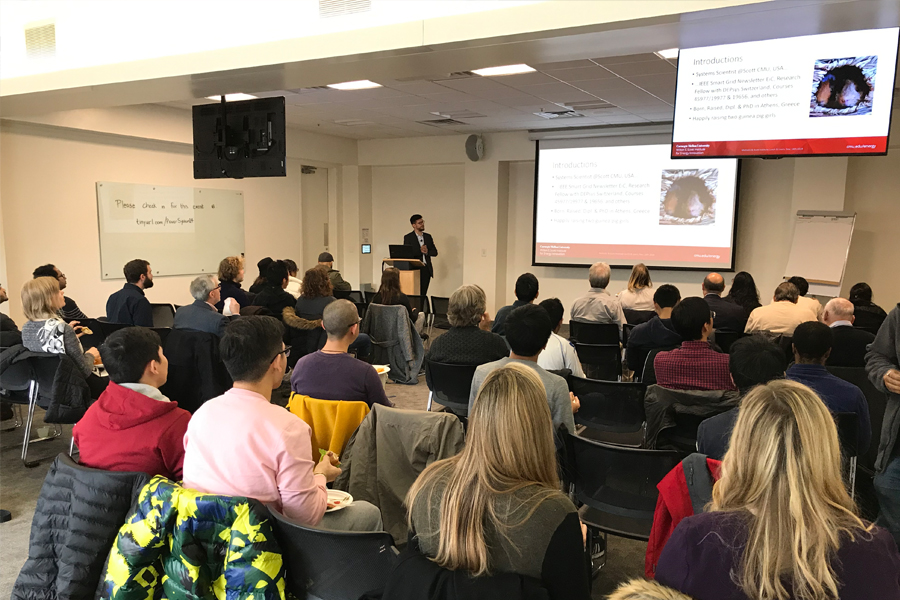
Carnegie Mellon University's Wilton E. Scott Institute for Energy Innovation and Metro21: Smart Cities Institute co-hosted a Lunch and Learn by Scott Institute Systems Scientist Panayiotis Moutis. His talk was titled, "Rethinking Power System Architecture for Serving Exurban Residential Paradigms."
Distinguished Lecture on Utility-Scale Wind & Solar Power, Oct. 29, 12p
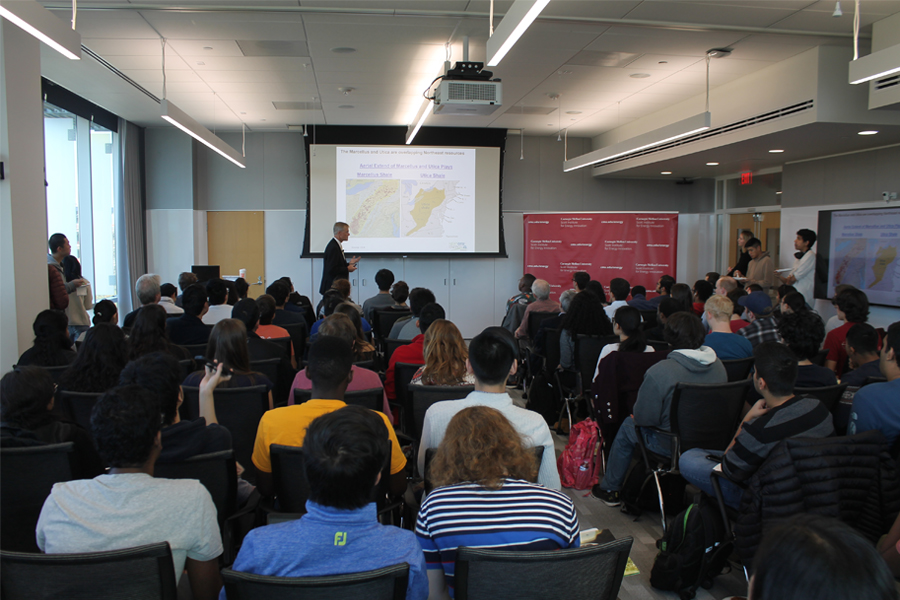
NextEra Energy Resources Senior Vice President of Development Michael O'Sullivan (now retired) returned to campus to deliver a Scott Institute Distinguished Lecture.
Distinguished Lecture on The Grid Energy Storage Strategy, Oct. 22, 12p
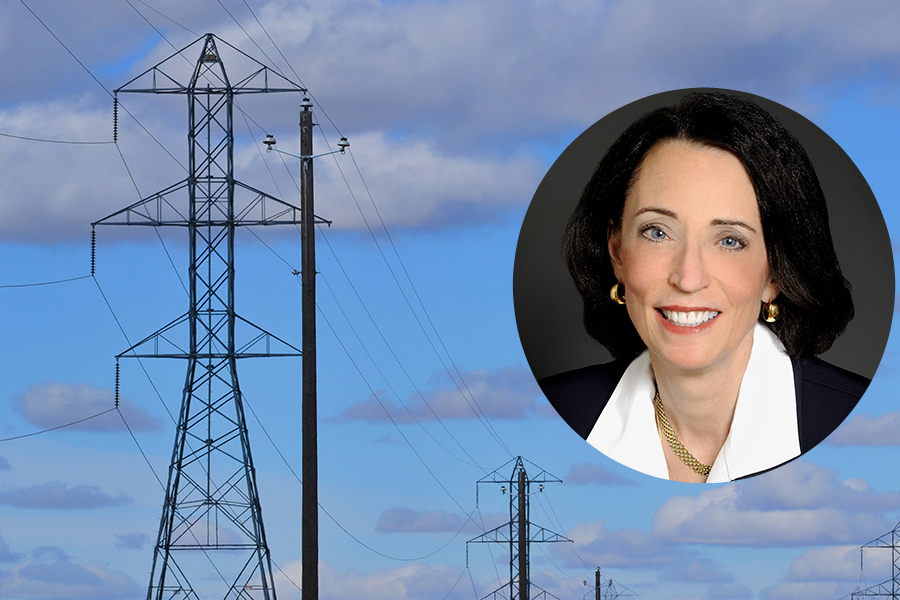
Sue Babinec, program lead of grid storage at Argonne National Laboratory, gave a Distinguished Lecture.
We Need a Green Real Deal: The Imperative of Deep Decarbonization, Oct. 9, 12p
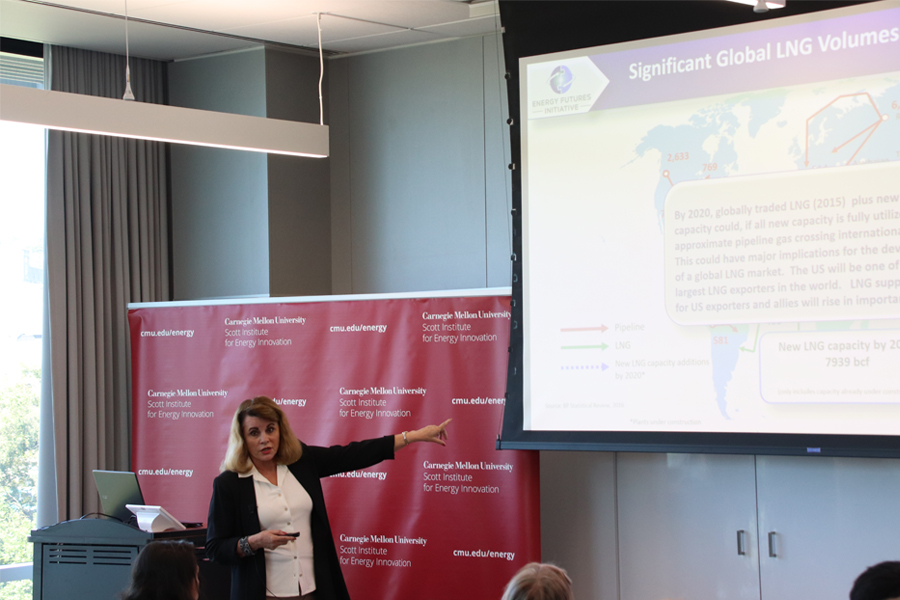
Melanie Kenderdine, principal at the Energy Futures Initiative (EFI) delivered a Distinguished Lecture. Kenderdine discussed EFI's work on innovation policy, the California decarbonization techno-economic assessment (in which she was a lead author) and a “Green Real Deal" currently in development.
The Economics of Solar Development, Oct. 2, 12p
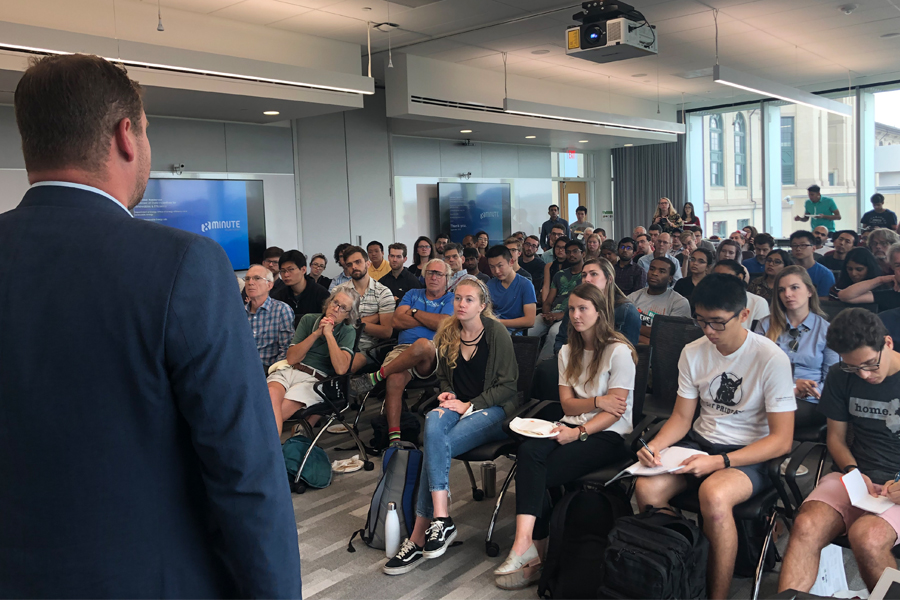
Leigh Zanone (Dietrich, Tepper 2003), senior director of operations and asset manager at 8minute Solar Energy, presented a tech talk. Zanone gave an overview on development economics at utility scale, its applicability to the Western Pennsylvania region, photovoltaics (PV) and storage consideration development and how that impacts grid reliability and facility generation revenues in a more dispatchable real-time market, development needs for improvement of SCADA software and dispatch algorithms both from Transmission operators and project along with reliability and uptime concerns.
2019 University Energy Institute Leadership Summit, Sept. 25-26
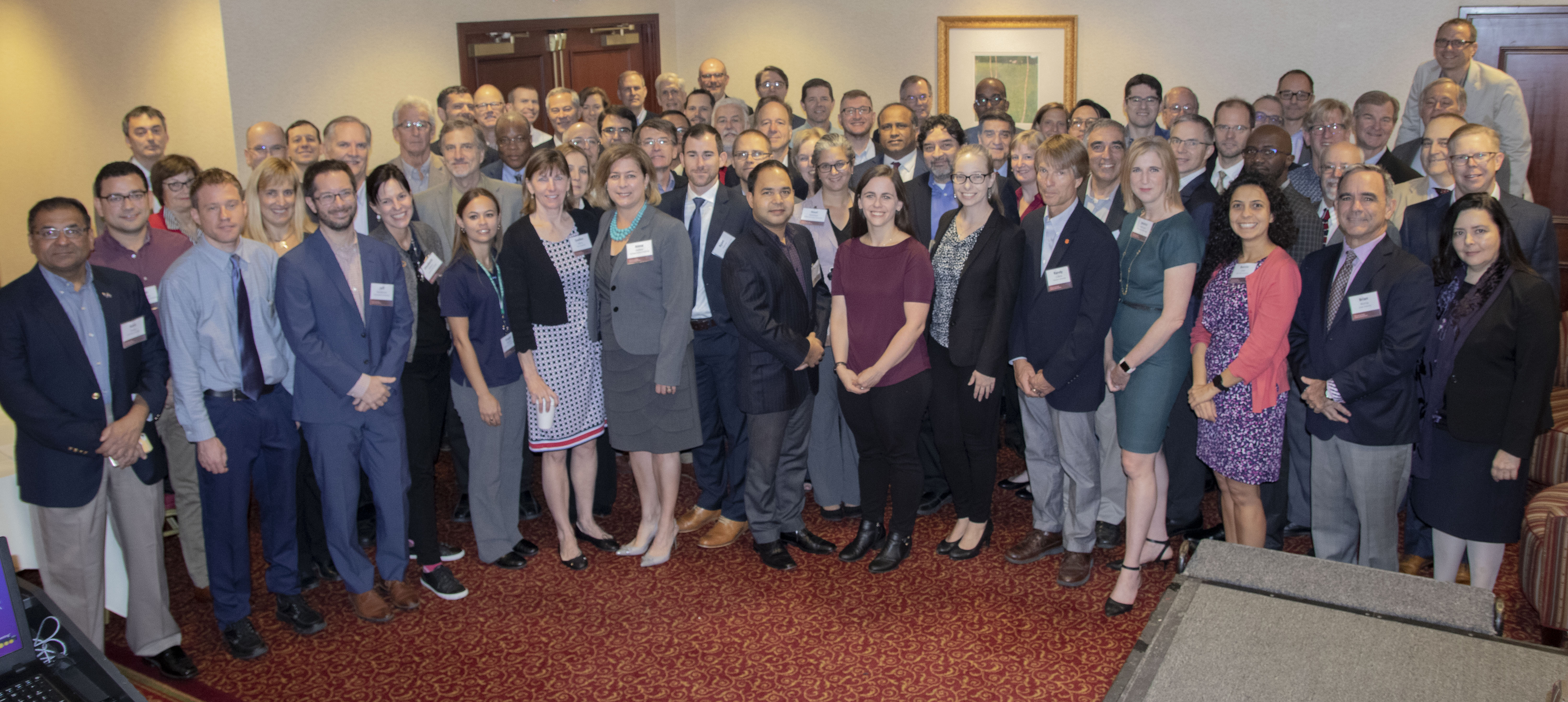
The Wilton E. Scott Institute for Energy Innovation at Carnegie Mellon University co-hosted the 2019 University Energy Institute Leadership Summit Sept. 25 and 26, in collaboration with the Colorado School of Mines' Payne Institute for Public Policy and Rice University's Baker Institute for Public Policy.
Distinguished Lecture: Carbon Dioxide Removal—An Essential Element for Meeting Global Climate Goals, Sept. 17, 12p
Scott Institute Professor of the Practice and Energy Futures Initiative Principal Joseph Hezir discussed carbon dioxide removal's role in climate change mitigation.
Distinguished Lecture: Visualization and Analysis of Grid-Cyber Systems Security, Sept. 10, 12p
Our Distinguished Lecture Series continued with a presentation by Jonathan White, manager of the Cyber-Physical Energy Systems Security Group at the National Renewable Energy Laboratory (NREL).
Tech Talk: From Molecules to Devices—Mechanistic Analyses of Electrochemical Energy Systems, Sept. 9, 1p
The Scott Institute and Faculty Affiliate Zachary Ulissi hosted a technical seminar by Chemical Engineering alumna Maureen Tang who is now an assistant professor of Chemical and Biological Engineering at Drexel University.
Taking the Lead: Exploring Two Pathways to Pennsylvania’s Energy Future | June 19, 11:30a
We hosted a special, lunch-time event on Pennsylvania Energy Horizons featuring:
-
Denise Brinley, Executive Director of PA Governor Tom Wolf's new Office of Energy;
-
Andrew Place, Commissioner of the PA Public Utility Commission;
- Katrina Kelly, Director of Urban Systems Strategy at SmithGroup; and
-
Adam Walters, William Penn Energy Fellow at the Governor’s Office of Energy.
Policy Briefing: How Fuel Cells Could Impact Vehicles, Buildings & Utilities | May 23, 8a, Washington, D.C.
This policy briefing provideed guidance to policymakers who make decisions related to energy, transportation and buildings. At the event, CMU researchers provided a detailed assessment of the current and expected future costs and performance of automotive proton exchange membrane fuel cells (PEMFCs) and stationary solid oxide fuel cells (SOFCs). A panel discussion followed.
Power Trip: The Story of Energy with ENGIE's Michael Webber | May 20, 12p
CMU's Scott Institute and Civil and Environmental Engineering Department led a seminar by Michael Webber, chief Science and Technology officer at ENGIE, a global energy & infrastructure services company. Webber delivered a talk titled "Power Trip: The Story of Energy" based on his latest book.
Achieving Drawdown: Building the Case for Climate Optimism with the Tools We Already Have | May 15, 12p
We closed out the semester with our final spring seminar by Jonathan Foley, a national leader in science communication and executive director of Project Drawdown (the most comprehensive plan ever proposed to reverse global warming).
U.S. Energy Efficiency: Progress, Opportunities, and Challenges | April 16, 12p
The Scott Institute hosted a Distinguished Lecture by Kathleen Hogan, former deputy assistant secretary for Energy Efficiency at the U.S. Department of Energy. Her talk highlighted the continuing importance of addressing energy efficiency as part of meeting energy and environmental goals and how some of the challenges with realizing the full benefits from energy efficiency are evolving.
Cleantech Open Northeast Director Beth Zonis on Innovation and Cleantech | Feb. 26
The Scott Institute hosted a Tech Talk by Cleantech Open Northeast Director Beth Zonis. Hosted by the Scott Institute, Zonis' presentation focused on innovation and cleantech startups. This event was in partnership with CMU's Center for Technology Transfer and Enterprise Creation.
Distinguished Lecture: NETL Dir. Brian Anderson on Fueling America's Energy Generation | Feb. 19
Our 2019 Distinguished Lecture Series continued with a talk by the new Director of the National Energy Technology Laboratory, Brian Anderson, who spoke about his role at the U.S. Department of Energy lab and the next generation of energy technology.
A Scott Institute Seminar by QuantumScape Co-Founder & CTO Tim Holme | Feb. 12
The Wilton E. Scott Institute for Energy Innovation hosted a seminar by QuantumScape Co-Founder & Chief Technology Officer Tim Holme.
Creating a More Efficient and Secure Energy System | Jan. 24
The Carnegie Mellon University Wilton E. Scott Institute for Energy Innovation hosted a Distinguished Lecture by Tony Markel, senior engineer in the Energy Systems Cyber-Physical Security Research Group at the National Renewable Energy Laboratory. Markel discussed energy, transportation and cybersecurity.
A Fireside Chat with EDF's Katie McGinty and WRI's Karl Hausker | Jan. 17
We kicked off our 2019 Distinguished Lecture Series with a Fireside Chat with veteran policymaker and recognized environmental leader Katie McGinty (who is also our Board Member!) and deep decarbonization expert Karl Hausker.
2018
2018 Electrochemical Energy Symposium | Nov. 15-16
This 1.5-day symposium focused on fundamental aspects of electrochemical energy storage and conversion and had a series of tutorial talks and technical talks from professors, students and postdoctoral researchers. The symposium, sponsored by the Wilton E. Scott Institute for Energy Innovation at Carnegie Mellon University, brought together researchers in energy storage and conversion.
Getting Published: A Seminar by John Uhlrich from Energy Technology | November 2
From the perspective of an editor, John Uhlrich presented on the current state of publishing in energy research and the physical sciences, including chemistry, materials science and engineering, by outlining the roles, responsibilities and ethical obligations of authors, editors and reviewers. The talk included tangible examples and how-to's related to publishing in journals and what editors look for when evaluating a manuscript submission.
The Past as Prologue: Learning from the Climate Changes in Past Centuries | October 22
Dr. Michael Mann reviewed work over the past decade aimed at establishing the nature of, and factors underlying, patterns of large-scale climate variability in past centuries. He discussed evidence from proxy climate reconstructions spanning the past millennium, the comparison of proxy reconstructions with climate model simulations forced by past natural and anthropogenic forcing, and results from climate modeling experiments in which proxy evidence is assimilated directly into coupled ocean-atmosphere model simulations.
Dr. Mann also discussed insights from proxy forward modeling that suggest the possibility that estimates of climate sensitivity derived entirely or partly from tree-ring evidence of past temperature changes may be biased low.
Creating and Leading a Smart City - Insights from Portland, Maine: A Seminar by Jon Jennings | October 22
Portland Maine is known as the Phoenix City for rising from the ashes after multiple devastating fires in the 20th century. The resilience of the community combined with trademark New England resourcefulness have propelled Portland, the largest city in Northern New England, into a leadership role in the implementation of smart city policies and practices. The Scott Institute co-hosted City Manager Jon Jennings who has led the implementation of some the most advanced energy saving strategies in the country to facilitate investments in next generation transportation infrastructure such as the INRIX highly autonomous bus platform.
The event was co-sponsored by Heinz College of Information Systems and Public Policy, the Scott Institute, and Metro21.
The ‘Unconventional’ Energy – Water Nexus: Marcellus Shale Gas Development in Appalachia | October 16
The Carnegie Mellon University Wilton E. Scott Institute for Energy Innovation and the Civil and Environmental Engineering Department co-hosted a seminar by Pennsylvania State University Professor of Environmental Engineering William Burgos. His presentation was titled, "The ‘Unconventional’ Energy – Water Nexus: Marcellus Shale Gas Development in Appalachia."
Abstract: The development of unconventional oil & gas (O&G) resources has fundamentally changed energy production in the United States. This development has led to increased demands for fresh water and increased volumes of O&G wastewater. This talk presented two case studies in Pennsylvania: #1 focused on disposal of wastewater from Marcellus Shale gas wells to surface water, and #2 focused on disposal of conventional O&G wastewater onto roads.
Study on Activity-Specific Feedback on Energy Consumption: A Seminar by Verena Tiefenbeck | October 8
Dr. Verena Tiefenbeck, who leads the Bits to Energy Lab at the Chair of Information Management at ETH Zurich, Switzerland, delivered a presentation titled, "Feedback, Fast and Slow – A Field Study on Activity-Specific Feedback on Energy Consumption." Digitalization increasingly provides the necessary tools to collect, analyze, and communicate data at population scale. In the energy sector, millions of smart meters have been deployed across the globe, making it possible to provide timely and specific feedback to firms and households on their energy consumption. Yet, most smart metering programs have resulted in very modest savings effects, creating a wave of disillusionment among policymakers and industry stakeholders.
The event was co-sponsored by the Heinz College of Information Systems and Public Policy, the Wilton E. Scott Institute for Energy Innovation, and the Carnegie Mellon Electricity Industry Center.
Distinguished Lecture Series - DOE NETL Acting Director: Driving Next-Generation Fossil Energy Innovation | September 24
This talk, by U.S. DOE National Energy Technology Laboratory Acting Director Sean Plasynski, showcased the history of NETL, highlighted ongoing technical work, and discussed the current priorities within the fossil energy programs that NETL implements for DOE’s Office of Fossil Energy.
Seminar by Joshuah Stolaroff, Carbon Capture Program at Lawrence Livermore National Laboratory | August 15
Wean Hall 3701, Carnegie Mellon University, 5000 Forbes Avenue, Pittsburgh, PA 15213
Advanced manufacturing, including 3D printing of polymers, metals, and ceramics, offers a range of opportunities to improve performance and access new applications in clean energy. A PhD alumnus of CMU, Dr. Stolaroff now runs the carbon capture program at Lawrence Livermore National Laboratory. His seminar was titled, "Advanced Manufacturing for Carbon Capture and Clean Energy Systems."
This event was co-sponsored by the Scott Institute and the Center for Climate and Energy Decision Making.
Seminar by Robert Kirshner, Chief Program Officer for Science, Gordon & Betty Moore Foundation | April 24
Marquis Conference Room, Scott Hall 5201, Carnegie Mellon University, 5000 Forbes Avenue, Pittsburgh, PA 15213
CMU's Wilton E. Scott Institute for Energy Innovation and the Mellon College of Science hosted a Seminar by Robert Kirshner entitled, "From the Accelerating Universe to Accelerating Science."
After 30 years on the astronomy faculty at Harvard, Robert Kirshner is now the Chief Program Officer for Science at the Gordon and Betty Moore Foundation in Palo Alto. Kirshner described the Moore Foundation and its approach to philanthropy, which includes about $100 million per year for science. He described some of the foundation's interests in data science, quantum materials, marine microbiology, and astronomical instruments, including the Thirty Meter Telescope. Kirshner also sketched the progress of the Moore Inventors' Program to encourage invention at research institutions.
Documentary Film Screening: The New Fire | April 16
McConomy Auditorium, Jared L. Cohon University Center, Carnegie Mellon University, 5000 Forbes Avenue, Pittsburgh, PA 15213
The Scott Institute was proud of host this special free screening of The New Fire at CMU and a discussion with Director David Schumacher and Jessica Lovering, who was featured in the film.
What can we do to mitigate climate change? Nuclear power has been vilified in popular culture and among much of the environmental community. Yet the next-generation reactors currently in development may actually be key to avoiding global catastrophe. The young entrepreneurs heading this energy revolution realize they’re up against more than the climate clock – they need to convince all of us that the new nuclear is safe and achievable.
This event was sponsored by the Scott Institute, CMU Energy Club, AB Films and the University of Pittsburgh Nuclear Engineering Program.
Carnegie Mellon Energy Week | April 4-6
From April 4-6, 2018, energy thought leaders from industry, government, academia, and the nonprofit sector gathered to engage and collaborate on energy research, trends, innovative technologies, and opportunities.
Key Events:
4/3 | Pre-event Energy Industry Career Fair
4/4 | Kickoff, Keynotes, Evening VIP Panel
4/5 | CMU Energy + Cleantech Investor Forum
4/6 | Allegheny Cleantech University Prize Collegiate Competition
The Scott Institute's Annual Energy Week featured events like a Distinguished Mayor's Forum on "Energy & Resilience: How Smarter Cities are Preparing for the Future," keynote speeches, panel sessions on topics, such as smart grids, battery technologies and building performance, plus so much more!
Allegheny Region Cleantech University Prize Competition (Part of CMU Energy Week) | April 6
Our 2018 Cleantech University Prize Competition took place Friday, April 6. Learn more.
Toyota Research Institute's Abraham Anapolsky on Combining High Throughput Synthetic Methods and Computational Materials Science | Jan. 29
Where: Marquis Conference Room, Scott Hall 5201, Carnegie Mellon University, 5000 Forbes Ave, Pittsburgh, PA 15213
One of the greatest engineering challenges of the 21st century is the discovery of materials that are fully optimized while being constrained by physics and socioeconomic factors (e.g. toxicity, resource availability, recyclability, etc.).
2017
ARPA-E Founding Director/Stanford Precourt Institute for Energy Co-Director Arun Majumdar on "Navigating the Turbulence of the Global Energy System" | Nov. 29
Where: Marquis Conference Room, Scott Hall 5201, Carnegie Mellon University, 5000 Forbes Ave, Pittsburgh, PA 15213
The Scott Institute for Energy Innovation hosted a Distinguished Lecture by Arun Majumdar, Founding Director of the Advanced Research Projects Agency-Energy (ARPA-E), the Jay Precourt Professor at Stanford University, a faculty member of the Departments of Mechanical Engineering and Materials Science and Engineering (by courtesy) and Co-Director of the Precourt Institute for Energy, which integrates and coordinates research and education activities across all seven Schools and the Hoover Institution at Stanford.
ARPA-E Founding Director/Stanford Precourt Institute for Energy Co-Director Arun Majumdar on "Redox Heat Engines for Fuels and Cooling" | Nov. 29
Where: Marquis Conference Room, Scott Hall 5201, Carnegie Mellon University, 5000 Forbes Ave, Pittsburgh, PA 15213
The Scott Institute for Energy Innovation hosted a technical talk by Arun Majumdar, Founding Director of the Advanced Research Projects Agency-Energy (ARPA-E), the Jay Precourt Professor at Stanford University, a faculty member of the Departments of Mechanical Engineering and Materials Science and Engineering (by courtesy) and Co-Director of the Precourt Institute for Energy.
Fireside Chat with Vince Hahn, Principal at The Carlyle Group | Nov. 16
Where: Rangos 1, Jared L. Cohon University Center, Carnegie Mellon University, 5000 Forbes Ave., Pittsburgh, PA 15213
The Wilton E. Scott Institute for Energy Innovation hosted fireside chat with Vince Hahn, Principal at the The Carlyle Group. The discussion was moderated by Scott Instittute Director Jay Whitacre. Hahn is focused on mezzanine level investment opportunities across the energy value chain, including oil & gas upstream, midstream and downstream, as well as power generation, electric transmission and mining. His geographic focus is primarily the Americas, and he is based in Boston.
Focus Group with Breakthrough Energy Ventures' David Danielson | November 9
Where: Wean Hall 3701, Carnegie Mellon University, 5000 Forbes Ave, Pittsburgh, PA 15213
The Scott Institute for Energy Innovation hosted Breakthrough Energy Ventures Managing Director for Science David Danielson for a private focus group.
Seminar on The Impacts on Water Quality from Oil and Gas Wastewater Management | November 3
Where: Marquis Conference Room, Scott Hall 5201, Carnegie Mellon University, 5000 Forbes Ave, Pittsburgh, PA 15213
The Scott Institute and the Civil and Environmental Engineering Department co-hosted a seminar by Nathaniel Warner, Assistant Professor at The Pennsylvania State University in the Civil and Environmental Engineering Department.
Abstract: There has been a dramatic increase in the extraction of hydrocarbons from O&G formations across the US over the past 10 years, with greatest activity in CA, CO, ND, PA, and TX. This growth in O&G development has raised concerns about potential impacts to human health and the environment, including possible risks associated with wastewater management. An increase in the volume of O&G produced water has accompanied the overall increase in O&G production. Much of this wastewater is reinjected to enhance production or as a disposal option, yet a significant volume has historically been treated and discharged to surface water or beneficially used on unpaved roads as a dust suppressant, or to supplement stream supply in PA, CO, and WY. Some O&G wastewaters contain contaminants of concern (e.g., metals, radionuclides, bromide) that are not removed prior to beneficial use or disposal. Here, investigations into the possible impact of increased O&G development on groundwater, surface water, and biota will be explored. Areas of discussion will include effects on water quality, sediment, and biota from beneficial use or discharge of O&G water in PA, WV, WY, and AR.
EPP Professor Paulina Jaramillo's Academic Adventures at CMU-Africa | November 2, 2017
Where: Marquis Conference Room, Scott Hall 5201, Carnegie Mellon University, 5000 Forbes Avenue, Pittsburgh, PA 15213
In this talk, Associate Professor of Engineering and Public Policy Paulina Jaramillo discussed her experience spending the 2016-2017 academic year in the CMU Africa campus in Rwanda. Her seminar included an overview of her experience teaching the MS students in Rwanda as well as some of the research she started while in Kigali. Such research includes working with mini grid developers to build better demand models for rural customers after they first gain access to electricity, as well as deploying air quality monitors that will help CMU research better characterize Kigali’s air quality and air pollution sources.
2017 Electrochemical Energy Symposium | November 2-3, 2017
Where: Marquis Conference Room, Scott Hall 5201, Carnegie Mellon University, 5000 Forbes Avenue, Pittsburgh, PA 15213
This 1.5-day symposium, sponsored by the Scott Institute for Energy Innovation and Carnegie Mellon's Energy Science, Technology and Policy Program, aimed at educating on fundamental aspects of electrochemical energy storage and conversion and will have a series of tutorial talks and technical talks from professors, students and postdoctoral researchers. The symposium, which was held at CMU, brought together researchers in energy storage and conversion.
TransTech Energy Business Development Conference | Tuesday, October 24 - Wednesday, October 25, 2017
Where: Hilton Garden Inn Pittsburgh/Southpointe, 1000 Corporate Dr, Canonsburg, PA 15317
The TransTech Energy Business Development Conference was held to promote investment in new companies that can provide solutions to energy, environmental, and economic development challenges such as creating new jobs and more competitive industries.
The Scott Institute for Energy Innovation was a proud academic partner.
American Geophysical Union (AGU) GeoPolicy Connect Workshop | Wednesday, October 4 - Friday, October 6, 2017
Where: Energy Innovation Center, 1435 Bedford Avenue, Pittsburgh, PA; Various Locations
Highlighted Event: Learn How to Share Your Science with Different Audiences (10/4)
AGU’s GeoPolicy Connect is an exciting solutions-focused initiative created to foster relationships between stakeholders, help communities, and advance science for policy and society. The ongoing program hosts events that bring together members of local communities to address scientific issues that matter to them and affect policies—issues that often are affecting other communities as well. The Scott Institute was a proud sponsor of GeoPolicy Connect.
Information Session: Allegheny Cleantech University Prize Collegiate Competition | October 2, 2017
Where: Marquis Conference Room, Scott Hall 5201, Carnegie Mellon University, 5000 Forbes Ave, Pittsburgh, PA 15213
The Scott Institute for Energy Innovation’s Information Session hosted future clean energy entrepreneurs and innovative students from across the region to learn more about the 2018 Allegheny Region Cleantech University Prize (CUP) Collegiate Competition.
The Information Revolution and Sustainable Development | September 27, 2017
Where: Adamson Wing, Baker Hall 136, Carnegie Mellon University, 5000 Forbes Ave, Pittsburgh, PA 15213
The Scott Institute for Energy Innovation and the Civil and Environmental Engineering Department hosted a seminar by Jeffrey Sachs, Columbia University Quetelet Professor of Sustainable Development. Sachs spoke about ways to harness the Information Revolution to improve health, sustainability, and social justice in the U.S. and globally.
The Engineer's Role in Reinventing a Sustainable Future | September 22, 2017
Where: Marquis Conference Room, Scott Hall 5201, Carnegie Mellon University, 5000 Forbes Ave, Pittsburgh, PA 15213
Charlie Hargroves, senior research fellow at the Curtin University Sustainability Policy (CUSP) Institute and sustainable development fellow at the University of Adelaide, delivered a talk at the Wilton E. Scott Institute for Energy Innovation.
The Metabolism of the Industrial City: Pittsburgh as a Model | September 13, 2017
Where: Scott Hall 6142
Speaker: Joel Tarr, Caliguiri University Professor of History & Policy (CMU)
Respondent: Mrinalini Rajagopalan, Associate Professor of History of Art and Architecture (Pitt)
Pre-circulated Seminar Reading:
Tarr, Joel A. “The Metabolism of the Industrial City: The Case of Pittsburgh.” Journal of Urban History 28, no. 5 (July 1, 2002): 511–45.
Pitt Libraries Link
CMU Libraries Link
Of additional interest:
Tarr, Joel A., ed. Devastation and Renewal: An Environmental History of Pittsburgh and Its Region. Pittsburgh, PA, USA: University of Pittsburgh Press, 2005.
Pitt Libraries Link
CMU Libraries Link
PA Secretaries Dunn & Richards: Sustainability, Efficiency & Transportation | September 13, 2017
Where: Marquis Conference Room (Scott Hall 5201), Carnegie Mellon University, 5000 Forbes Ave, Pittsburgh, PA 15213
The Scott Institute for Energy Innovation hosted “The Future of Sustainability, Efficiency and Transportation," a fireside chat with Pennsylvania Department of Conservation and Natural Resources Secretary Cindy Adams Dunn and Pennsylvania Department of Transportation (PennDOT) Secretary Leslie Richards.
Assessing and Reducing the Risks of Solar Geoengineering | September 11, 2017
Where: Marquis Conference Room (Scott Hall 5201), Carnegie Mellon University, 5000 Forbes Ave, Pittsburgh, PA 15213
The Carnegie Mellon University's Wilton E. Scott Institute for Energy Innovation, the Center for Climate and Energy Decision Making and the Carnegie Mellon Electricity Industry Center co-hosted a Distinguished Lecture by David Keith, Gordon McKay Professor of Applied Physics and Public Policy at Harvard John A. Paulson School of Engineering and Applied Sciences.
Pennsylvania General Assembly Science & Technology Fellowship Program Info Session | September 6, 2017
When: Wednesday, September 6, 2017 from 12:00 PM to 1:20 PM (EDT)
Where: Hamburg Hall 1002, Carnegie Mellon University, 5000 Forbes Avenue, Pittsburgh, PA, US, 15213
This information session allowed attendees to learn about the Pennsylvania General Assembly Science & Technology Fellowship Program.
Rick Stafford, Heinz College Distinguished Service Professor of Public Policy and Deborah Stine, Scott Institute for Energy Innovation Associate Director for Policy Outreach and Professor of the Practice, Engineering and Public Policy, spearheaded this initative in which graduate students would be placed in Pennsylvania General Assembly offices (the state legislature).
Seminar on Accelerating Energy Technology Innovation at Cyclotron Road | July 24, 2017
When: Monday, July 24, 2017 from 12:00 PM to 1:20 PM (EDT)
Where: Marquis Conference Room (Scott Hall 5201), Carnegie Mellon University, 5000 Forbes Ave, Pittsburgh, PA 15213
The Wilton E. Scott Institute for Energy Innovation hosted a seminar by Ilan Gur, founding director of Cyclotron Road, on "Accelerating Energy Technology Innovation at Cyclotron Road."
Abstract:
Built to address the growing gap between academic research and industrial products, Cyclotron Road offers a home for hard science and technology innovators to advance their ideas from breakthrough concept to market ready product. At Cyclotron Road, innovators receive two years of salary and seed R&D funding, bolstered by access to world-class research tools and expertise at the Lawrence Berkeley National Laboratory. The program provides focused technical and business mentorship, engagement with a network of potential commercialization partners, and interaction with a community of fellow entrepreneurs. Put together, Cyclotron Road aims to create the best environment for developing hard energy technologies that can succeed in the marketplace.
Renewable Energy and Energy Efficiency EXPO | July 11, 2017
When: Tuesday, July 11, 2017 from 9:30 AM to 4:30 PM (EDT)
Where: Washington, D.C.
Hosted by the Sustainable Energy Coalition, the EXPO schowcased a cross-section of renewable energy and energy efficiency technologies. The Scott Institute for Energy Innovation was one of 40 organizations to exhibit their technology and research.
Scott Institute Associate Director for Policy Outreach Deborah Stine presented a talk on Pittsburgh's progress in energy titled "From Pittsburgh to Paris: Manufacturing, Energy Efficiency and Jobs."
Take a look at the presentation slideshow
Also, watch a video of Deborah Stine speaking in the Energy EXPO 2017 Panel 1: Setting the Stage.
Seminar on Seismic Hazard Induced by Production of Hydrocarbon and Geothermal Energy | June 22, 2017
When: Thursday, June 22, 2017 from 12:00 PM to 1:20 PM (EDT)
Where: Marquis Conference Room (Scott Hall 5201), Carnegie Mellon University 5000 Forbes Ave, Pittsburgh, PA 15213
The Wilton E. Scott Institute for Energy Innovation hosted Serge A. Shapiro, professor of Geophysics at the Freie Universität in Berlin, Germany, for a seminar on "Nature and control of seismic hazard induced by production of hydrocarbon and geothermal energy."
Productions and injections of fluids in rocks can induce significant earthquakes. Induced seismicity is observed by hydraulic fracturing of shale and stimulations of enhanced geothermal systems. Earthquakes can be caused by long-term developments of oil and gas fields. Understanding and monitoring of fluid-induced seismicity is necessary for controlling its seismic risk. The talk provided an overview of physical and geomechanical fundamentals of the seismic hazard, of approaches to its control and of various relevant case studies.
Workshop on Electromagnetic Effects in Materials Synthesis | June 5-6, 2017
When: Monday, June 5, 2017 from 8:00 AM to 7:00 PM (EST) and Tuesday, June 6, 2017 from 8:00 AM to 5:00 PM (EST)
Where: Marquis Conference Room (Scott Hall 5201), Carnegie Mellon University 5000 Forbes Ave, Pittsburgh, PA 15213
Several materials of technological importance require high temperature processing over long durations and demand a large cost and energy footprint. Electromagnetic waves, such as microwave radiation and lasers can lower both temperatures and times involved in processing various types of materials, ranging from cooking food, making pharmaceutical drugs and 3D printed plastic parts to applications in precision surgery. What is common to all these examples is the idea that the electromagnetic fields absorbed within a material may not be immediately converted to heat, but can instead promote other forms of chemical or physical reactions.
This inaugural two-day workshop fostered collaboration between the research communities that use electromagnetic fields (in particular microwave radiation and lasers) for making materials. This workshop cross-pollinated ideas between members of both communities that will uncover answers to the longstanding scientific challenges in using electromagnetic fields for materials synthesis/processing.
From an industrial standpoint, technological advances in processing advanced materials using electromagnetic fields can have a smaller energy footprint compared to conventional synthesis and as such will have a profound impact on society. These materials will additionally find use in diverse areas like sustainable infrastructure, transportation, clean energy, water management and healthcare.
"Pipelines, Trucks, Buses and Automobiles: Where, When, Which?" | May 3, 2017
On May 3, 2017, Carnegie Mellon University hosted a policy briefing on several studies that provide guidance to policymakers for decisions they make related to energy and transportation. The event took place over lunch in room 421 of the Cannon Office Building.
Speakers
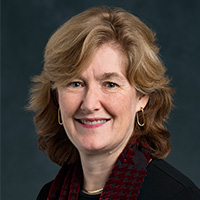
Dr. Karen Clay, Professor of Economics and Public Policy, Carnegie Mellon University's H. John Heinz III School of Public Policy and Management and by Courtesy, Tepper School of Business; Affiliated Faculty, University of Pittsburgh Law School
"The Good, the Bad and the Ugly: Understanding the Social and Economic Costs of Transporting Crude Oil
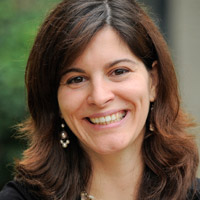 Dr. Inês Azevedo, Co-Director, Climate and Energy Decisionmaking Center, Associate Professor, Engineering and Public Policy, Carnegie Mellon University
Dr. Inês Azevedo, Co-Director, Climate and Energy Decisionmaking Center, Associate Professor, Engineering and Public Policy, Carnegie Mellon University
"Should I Stay or Should I Go?: Transportation Fuels and Technologies Across America"
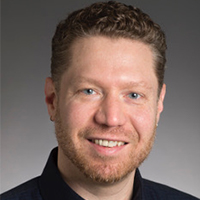
Dr. Jeremy J. Michalek, Professor of Engineering and Public Policy and Mechanical Engineering; Director, Vehicle Electrification Group and the Design Decisions Laboratory, Carnegie Mellon University
"Where, When, and Which Electric Vehicles are Green?"

Dr. Fan Tong, Postdoctoral Research Associate, Engineering and Public Policy, Carnegie Mellon University
"Which alternative fuel technology is best for transit buses?"
Moderator
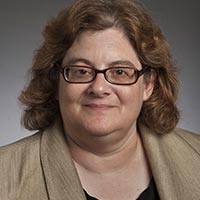
Dr. Deborah Stine, Associate Director for Policy Outreach, Scott Institute for Energy Innovation; Professor of the Practice, Engineering and Public Policy
Scott Institute Seminar by Wolf Ketter | April 18, 2017
When: Tuesd
Where: Marquis Conference Room, Carnegie Mellon University, 5000 Forbes Avenue, Scott Hall 5201, Pittsburgh, Pa.
The Scott Institute for Energy Innovation hosted Wolf Ketter, director of the Institute for Energy Economics at the University of Cologne, for a seminar on "FleetPower: Creating Virtual Power Plants in Sustainable Smart Electricity Markets."
Val Jensen: "Designing the Utility of the Future" | April 5, 2017
When: Wednesday, April 5, 2017 from 12:00 PM to 1:20 PM (EST)
Where: Marquis Conference Room, Scott Hall 5201, Carnegie Mellon University, 5000 Forbes Ave, Pittsburgh, PA 15213
Carnegie Mellon University's Wilton E. Scott Institute for Energy Innovation hosted distinguished speaker Val Jensen, senior vice president of Customer Operations at ComEd, for a lecture titled, "Designing the Utility of the Future."
Carnegie Mellon Energy Week | March 27 - 31, 2017
On March 27-31, 2017, Carnegie Mellon’s Scott Institute for Energy Innovation celebrated its second Energy Week, an event designed to educate, inform and debate energy policy; highlight research and innovation; and prepare for the future. For videos of Energy Week seminars and events, check out our YouTube playlists for Energy Week 2017 and Energy Week 2016.
Also, watch this video to learn more about Energy Week and the Scott Institute:
Allegheny Region Cleantech University Prize Competition (Part of Energy Week) | March 28, 2017
In 2016, Pittsburgh was selected as one of eight national regions for a collegiate student energy entrepreneurship competition by the Department of Energy’s Energy Efficiency and Renewable Energy Office. The Allegheny Region Cleantech University Prize Collegiate Competition occured on March 28, 2017 during Carnegie Mellon’s inaugural Energy Week, and it focused on the states of Pennsylvania, Ohio, West Virginia, and Maryland. The regional first place winner received a $50,000 prize and there will be additional prizes as well for other winners.
Watch a video of the final pitches
Carnegie Mellon’s Scott Institute led a team that included the University of Pittsburgh Center for Energy, Innovation Works, the Energy Innovation Center, and the Pittsburgh Technology Council.
Visit cleantechprize.org for more details and to sign up for updates.
Distinguished Lecture with Stacey Olson, President of Chevron Appalachia LLC | March 7, 2017
When: Tuesday, March 7, 2017 from 12:00 PM to 1:20 PM (EST)
Where: Marquis Conference Room, Scott Hall 5201, Carnegie Mellon University 5000 Forbes Ave, Pittsburgh, PA 15213
Carnegie Mellon University's Wilton E. Scott Institute for Energy Innovation hosted distinguished speaker Stacey Olson, President of Chevron Appalachia, LLC, for a lecture.
Building a Resilient, Smart and Sustainable City: The Energy-Water Nexus | February 16, 2017
When: Thursd
Where: McConomy Auditorium, Carnegie Mellon University 5000 Forbes Avenue, Pittsburgh, PA 15213
Energy and water are the world’s two most critical resources, yet their vital interconnections and vulnerabilities are less often recognized. Smart, resilient cities are tackling these connection points head on – metropolitan areas like Pittsburgh, known as the “city of three rivers.” Always a center for groundbreaking ideas – from the earliest days as the center for industry to the recently launched p4 Initiative and upcoming Climate Action Plan 3.0, Pittsburgh leads the country as a thriving hub of innovation, technology, education, environmental stewardship, and sustainability. In order to continue this important conversation, the Scott Institute hosted a gathering of national thought leaders and distinguished guests as we discussed the issues and opportunities surrounding the Nexus of Energy and Water management, both nationally and in Pittsburgh. The event featured a keynote speaker followed by insights from a panel of experts from around the country.
Listen to keynote speaker Dr. Michael Webber's lecture and watch a video of the panel discussion.
Nathan S. Lewis: "Sunlight-Driven Hydrogen Formation by Membrane-Supported Photoelectrochemical Water Splitting" | February 28, 2017
When: Tuesday, February 28, 2017 from 2:30 PM to 3:30 PM (EST)
Where: Connan Room, Cohon University Center, Carnegie Mellon University 5000 Forbes Ave, Pittsburgh, PA 15213
The Scott Institute hosted a seminar titled,"Sunlight-Driven Hydrogen Formation by Membrane-Supported Photoelectrochemical Water Splitting" by Nathan S. Lewis, the George L. Argyros Professor of Chemistry at California Institute of Technology.
"Energy & Water: Powering the Modern City"- Distinguished Lecture with Philip Mezey, CEO of Itron Inc. | February 16, 2017
When: Thursday, February 16, 2017 from 12:00 PM to 1:15 PM (EST)
Where: Peter/Wright Rooms, Cohon University Center, Carnegie Mellon University 5000 Forbes Avenue, Pittsburgh, PA 15213
The Wilton E. Scott Insitute for Energy innovation presented a Distinguished Lecture by Philip Mezey, President and CEO of Itron, a $2 billion global technology and services company dedicated to the resourceful use of energy and water. We were proud to participate in a dialogue about the intersection of energy and water management and the Internet of Things.
During this discussion, Mr. Mezey covered the challenges and opportunities utilities, cities and citizens face as we invest in infrastructure and think about the future of energy and water. He specifically addressed how we are wasting these precious resources and what technology and solutions can be applied to ensure sustainable cities in the future.
2015
Cleantech University Prize Jamathon | December 2, 2015
On Wednesday, December 2, 2015 from 4:30-6:30 pm in Wean Hall 3701 on the Carnegie Mellon Campus, Allegheny Cleantech UP hosted a Jamathon -- a shortened version of Startup Weekend. The goal was for student entrepreneurs with ideas in renewable energy and energy efficiency to connect with other students who might form the basis for a team with the right collection of expertise to be successful in the competition.
Students from all area universities attended this event.
Sunshot Catalyst Prize Competition Jamathon | August 12, 2015
Entrepreneurs, developers, working professionals, mentors, makers, doers, and enthusiasts joined the Scott Institute on August 12, 2015 from 3-6 pm, for the Department of Energy’s Sunshot Catalyst Prize Competition Jamathon. Participants recruited team members to work on a new cleanweb business idea in the solar or buildings space that can be implemented with software, data, or automation, or they selected an idea at catalyst.energy.gov.
This event facilitated the creation of a video pitch that could be used to apply to the SunShot Catalyst Business Innovation contest, one of four in the Sunshot Catalyst series, with prizes from $1,000 to $100,000. The event took place on Carnegie Mellon’s campus.
View the photo archive of this event on The Scott Institute's Facebook page.
Data Analytics for Virtual Energy Audits and Value Capture Assessments Seminar | July 20, 2015
Dr. Alexis Abramson, F. Alex Nason Professor in Mechanical and Aerospace Engineering at Case Western University and Director of the Great Lakes Energy Institute, delivered a seminar on Monday, July 20, 2015 at 12pm in Baker Hall 129. The talk focused on a “Big Data” analytics approach to building efficiency diagnosis and prognostics.
Innovating for Competitive Advantage Webinar Series: The Pennsylvania Infrastructure Technology Alliance and the Oil & Gas Industry
PITA, Catalyst Connection / Scott Institute (May 2015)
This series focused on several oil & gas industry technologies in development at CMU and funded by the Pennsylvania Infrastructure Technology Alliance (PITA) and how industry can be a partner in those research activities. We discussed wireless ultrasonic detection of defects in clad-steel oil and gas pressure vessels as well as using mobile laboratories to characterize methane and other emission from natural gas production.
PITA is a Pennsylvania Department of Community and Economic Development (DCED) program.
2014
QER Public Meeting
Natural Gas: Transmission, Storage and Distribution
U.S. Department of Energy / Scott Institute (July 2014)
U.S. Department of Energy Secretary Ernest Moniz visited CMU to lead a public meeting on natural gas and its role in America's energy future. The DOE forum, part of the Quadrennial Energy Review (QER) established earlier this year by U.S. President Barack Obama, was hosted on CMU's Pittsburgh campus by the Wilton E. Scott Institute for Energy Innovation.
2013
Shale Gas and Implications for Regional Manufacturing
Scott Institute/National Academy of Engineers (April 2013)
A symposium hosted by CMU's Scott Institute for Energy Innovation and the National Academy of Engineers (NAE) examined the role of shale gas in manufacturing, transportation and the environment.
A recording of the event is below, in four parts.
